|
|
|
|

(delwedd J4350) (tudalen 100)
|
�THE CAMBRIAN MINSTREL.
![[blocks in formation]](sion-prys_310_caniedydd_cymreig_1845_rhan-2_3597k_files/image007.jpg)
![[ocr errors]](sion-prys_310_caniedydd_cymreig_1845_rhan-2_3597k_files/image009.jpg)
Ai At
llais y bardd ddo'i wrth ei chais I lonni'n bronau
mor fwyn y gwyliau A'i ber ganiadau fedd ei bardd yn drist ei gwedd, A'r m�d
diliferion yn cwympo'n gyson Ar hyd y meillion
![[ocr errors][merged small][merged small]](sion-prys_310_caniedydd_cymreig_1845_rhan-2_3597k_files/image011.jpg)
Mi wela'r c�r dadgeiniaid
O'u cyfaill gwiw'n ymddifaid,
A llygaid llwgus;
A'u lleisiau o'ent felusion
Yn gwaelu ar y galon,
Er mydron medrus! Pabam inae'r beirdd
fel rhai ga�dd gam Gan angeu creulon, yn gwneud eu cwynion I'r mud awelon �'n
fudion dros ei fedd, Gan achwyn draw mewn ochau Am gloddiau du ei gledd ? Mor
chwith i'r Grawerth fyn'd o'n plith, I'r per ei alaw i fyn�d mor ddistaw, Fe
unai�n law-law wyr di-daw yn eu dawn: O fwyniant grym a iechyd I'r gweryd
aeth vi gawa.
Ei fedd yn debyg gwnewch i'ch gwedd,
Pan b�aech yn gwrando y g�n f'ai'n hudo,
A'r blodau wreiddo byth yno b'ont yn byw,
Fel llinell ber ei awen
Ar lyfrlen deg o liw;
Can's brawd oedd hwn a chnawd o gnawd,
Pob gwir awenydd a da ganiedydd,
A brwdwawl brydydd-cu hedydd mwyn y cor,
Ac enaid byw y cerddi
O Fendi draw i for.
Didolwch deg forwynion
Y blodau hoff i'w galon,
Ac ar ei feddrod Cydblenwch hwy a'r dwylaw, O barch estynech iddaw,
Am gerdd ei dafod :
Os isel ei raddoliaeth,
O budiad Awen odiaeth
Ei luniaeth lonwiw
Fe gai, a chyda'i friwsion
E' sugnai ber ddiferion
O'i bronau nwydfyw:
Ei chwa'r a'i fam a'i anwyl g�r
Oedd Awen ddibin, a'i laeth a'i fenyn
Oedd cael ei dilyn, ac englyn oedd i'w glyw
Fal can y g�g pan gynta
Cyhoedda'r haf o'r rhiw.
Fo�n banner
dadgloi'r beddrod Lle gwywa'r tafod t�n.
|
|
�
|
|
|

(delwedd J4351) (tudalen 101)
|
Y CANIEDYDD CYMREIG.
Y byd am addysg chwiliai i gyd, A'i lyfr gelloedd oedd y dyffrypoedd, Y
coed a'r moroedd, a dwr, aberoedd byw, A'u frodyr gorau'r adar 'Roentglaiar
d�n i'w glyw.
Ni thaw y g�n alarus,
Hir lefa'r beirdu wylofus
Am eu caniedydd;
A'u brawd sydd heno'n isel
Yn tewi mewn lle tawel,
A�u parod brydydd. O'r twyn a'i gerdd daw'r bugail mwyn, A than y glasfryn
bydd draw gyferbyn Y bardd a'i delyn yn canlyn yn y c�r, A
ddeil goffhad am Gwilym, Fardd hylym, 'nawr sy'n o'r. Yn ber o'r ddaear lan i'r
ser Aed sain galargerdd dan goedwig irwerdd, Mewn awr diangerdd a'r gydgerdd
gyda'r g�n,
Rhowch ar ei oer fedd-garreg
Un bennill-dim ychwaneg-
Fel llun ei galon ;
Ac yno'r meibion ieuainc
A ddysgant oll y ddwysgeinc
Ar dafod cyson ;
A'i ffon yr henddyn ddengys hon,
A'r plentyn pum-mlwydd a bys cyfarwydd
A wna mewn sadrwydd bob arwydd ma's i ben
O'r bennill hoff am GRAWERTH
Dan iawn werth gwawl y nen.
Y fan lle gorwedd ger y llan,
Gan lu babanod a theg enethod,
A meibion hyglod yn hynod bydd o hyd,
Ac enw GRAWERTH gofir
Tra hodd�ir bardd mewn byd.
![[merged small][merged small][merged small][merged small][ocr errors][merged small][merged small][merged small][merged small][merged small][merged small][merged small][merged small][merged small][merged small][merged small][merged small][merged small][merged small][merged small]](sion-prys_310_caniedydd_cymreig_1845_rhan-2_3597k_files/image015.jpg) ob anifail. ob anifail.
�ffrwyth.
�a choeden.
Him was giv'n to eat. Gan y nef yn rhodd;
Oft be gazed on tree and flower.
Syllai ar y blodau lliwus Pluck'd from ev'ry cluster'd bower;
Profai'r ffrwythau mwyaf melus.
Yet nor sunshine sweet.
�nor shower.
�Eto se ddangosai'i wefus
Could his bliss complete. Nad oedd wrth ei fodd:
What is furtber wanting?
Beth sy'n awr yn eisiau?
�Flear the song-bird's chanting;
Gwrando'r hyfryd leisiau On the spray whose bloom so gay
Sydd trwy'r ardd.
�gan adar hardd.
�Thy hourly jny's augmenting.
Yn gweini'n fwyn i'th glustiau:
�nb I feel a longing bitter.
O!
�'rwy'n teimlo yma angen.
�Every morn and eve makes greater:
�Na ddigona sain eu pylgen.
And my heart its plaint would utter
|
|
�
|
|
|

(delwedd J4352) (tudalen 102)
|
THE CAMBRIAN MINSTREL.
vv
![[merged small][merged small][merged small][merged small][merged small][merged small][merged small][merged small][merged small][merged small][ocr errors][merged small][merged small][merged small][merged small][merged small]](sion-prys_310_caniedydd_cymreig_1845_rhan-2_3597k_files/image019.jpg)
|
|
�
|
|
|

(delwedd J4353) (tudalen 103)
|
Y CANIEDYDD
CYMREIG.
�DAFYDD Y GARREG WEN.
Air- Dafydd y Garreg Wen.
3
![[blocks in formation]](sion-prys_310_caniedydd_cymreig_1845_rhan-2_3597k_files/image023.jpg)
ben An . wyl-fedd
ynen, Gwna goffa drwy'r hirddydd am
![[blocks in formation]](sion-prys_310_caniedydd_cymreig_1845_rhan-2_3597k_files/image025.jpg)
the adder's conceal. Through forest
and glen
Sain ei ddiwenydd
Still echo to echo
1 Ddafydd Garreg Wen.
Cries Davydd Garreg Wen.Note.
-Tradition informs us that the Harpist whose name this plaintive and
beautiful melody bears.
�called for it on his death-bed.
sigh:
How weak was the mind that deem'd worthy a ditty The charms that could fill
but the
O when in my childhood was I e'er so silly The song that extolleth the charm
of the flowers O'er coalpits for berries to reach?
Will name not each place where they grow;
�Or from the dead waters where flowered
the lily The lay that gives beauty its garden and bowers The bloom of its
chasteness to fetch?
As seldom its guile will avow:
�But alas!
�when my parents my talents were
praising.
�The bloom �neath which dewdrops may
shelter their And my pride would exalt them still higher.
pureness The berry.
�and the lily I seiz'd.
�-and in seizing Hath own'd where the
adder may trail.
�Fell wounded to bleed in the mire.
And warn'd me full oft of that thin veil'd demureness
That may guile like
|
|
�
|
|
|

(delwedd J4354) (tudalen 104)
|
THE CAMBRIAN MINSTREL.
A thra bo byd
O'er bis last rest,
Y sain ga'dd ei fryd
From realms of the blest,
O galwer ar enw
O list how is echoed
'R gwr hwnw o hyd:
The strain he lov'd best!
Tra ser mewn nen
List, list again
Dadganed pob pen
Through forest and glen
Sain ei ddiwenydd
Still echo to echo
1 Ddafydd Garreg Wen.
Cries Davydd Garreg Wen. Note.-Tradition informs us
that the Harpist whose name this plaintive and beautiful melody bears, called
for it on his death-bed.
![[merged small][merged small][merged small][ocr errors][ocr errors][merged small][merged small][merged small][merged small]](sion-prys_310_caniedydd_cymreig_1845_rhan-2_3597k_files/image029.jpg)
sigh:
How weak was the mind that deem'd worthy a ditty The charms that could
fill but the
![[merged small][merged small][merged small][merged small][merged small][merged small][ocr errors][merged small][merged small][merged small][ocr errors][merged small][merged small][merged small][merged small][merged small]](sion-prys_310_caniedydd_cymreig_1845_rhan-2_3597k_files/image031.jpg)
O when in my
childhood was I e'er so silly The song that extolleth the charm of the
flowers O'er coalpits for berries to reach?
Will name not each place where they grow; Or from the dead waters where
flowered the lily The lay that gives beauty its garden and bowers The bloom
of its chasteness to fetch ?
As seldom its guile will avow: But alas! when my parents my talents were
praising, The bloom �neath which dewdrops may shelter their And my pride
would exalt them still higher,
pureness The berry,
and the lily I seiz'd, -and in seizing Hath own'd where the adder may trail,
Fell wounded to bleed in the mire.
And warn'd me full oft of that thin veil'd
demureness
That may guile like the adder's conceal
|
|
�
|
|
|

(delwedd J4355) (tudalen 105)
|
Y CANIEDYDD CYMREIG. ��
![[merged small][merged small][ocr errors][merged small][ocr errors][merged small][merged small][merged small][merged small][merged small][merged small][merged small][merged small][merged small][merged small][merged small][merged small][merged small][merged small][merged small][merged small][merged small][merged small][merged small][merged small][merged small][merged small][merged small][merged small][merged small][merged small][merged small][merged small]](sion-prys_310_caniedydd_cymreig_1845_rhan-2_3597k_files/image034.jpg)
Note.-The story of Leander and Hero puts one who has spent some portion of
his youthful days in any of the Welsh vales in mind of many a modern Leander,
who, because he has not so tepid a stream as the Hellespont to swim through,
must have recourse to stilts, and many other coutrivances, to enable him to
cross the stream that dows between him and his Hero. Young men practise on
stilts in the smaller brooks, and must be many times well soused before they
attempt the Tivy.
|
|
�
|
|
|

(delwedd J4356) (tudalen 106)
|
106 THE CAMBRIAN
MINSTREL.����
DAN FFRWYTHBREN Y BERLLAN.
Air�Rhyban Morfydd (Morfydd�s Riband).
Dan ffrwythbren y berllan canyddaf yn rhodio Un harddach na�r �falau sy�
'nghrog ar el frig, A phell wyf o� amau
pe safwn o tanu Nad atti yn gyntaf estynwn fy mhig; Ychydig feddyliais pan
o�wn i�n las lencyn A�m llygad yn syllu ar eurffrwyth yr ardd, Y gwelwn un
gwrthrych y dybiwn i gwedy�n, Na�r �falau�
na�r ceiros yn llawer mwy hardd.
Dy dad fu ofalus i gau am ei brennau,
A pherth sydd ogyfuwch a brigau ei goed,
Ond 'nawr yn ei ardd mae un rodia ei llwybau
Mwy denawl i'm tyb na bu�r afal erioed.
Ei aeron gadawaf i�r llencyn a�I chwanto,
Ond hi sydd yn mudo mor hardd yn eu plith
Tra meddaf ar lygaid lle�r nelo hi rodio,
Eu trem fydd o hyd am orharddwch ei rhith.
Lle byddot yn tramwi bydd raid imi syllu,
Lle seinio dy berlais myfi wyf wrandawr:
Rhag tybio o neb mae'r afalau wy�n�
chwanto,
Tyr'd allan, fy nheimlad cei wybod yn awr;
Neu os ar ddrwg dybiad y caf fy ngharcharu,
Fel un a drachwantodd yn eiddo dy dad;
Ger brawdle mi wysiaf y ferch fynwn garu,
Fel gwelo pob llygad beth ddenodd fy nhra'd.
Un loewach ei llygad na ffrydiad y grisial,
Un sythach ei safiad na phoplys y berth,
Un lwysach ei meinlais na�r fronfraith ber ana�l,
Un addef pob ardal ei glendid a'i gwerth:
Un wel fy nychymyg yn ddarlun o Efa �
Un wna ei pherffeithrwydd fy nghalon yn brudd
Am nad wyf hyd etto�r un gai fel ei Hadda
Drawsblanu ei Ilysiau, a thrwsio ei gwy^dd.
Dros y berth a'th amgylcha o tafla imi afal,
Ond nid am ei degwch na'i bertflas ei hun:
Ond �n arwydd daw hono i wrando fy sisial,
Sy'n Iwysach na'r ffrwythau haelionaf o lun.
Os gwnai, mi a�i bwytaf fel afal gwybodaeth
O bethau ddadguddir mewn amser i dd'od,
Pan rhoddir o bosib' wrandawiad i'm haraeth
Gau�r eneth rasusaf wy�n weld tan y rh�d.
�
|
|
�
|
|
|

(delwedd J4357) (tudalen 107)
|
Y CANIEDYDD CYMREIG.
Y CANIEDYDD CYSIREIG. ANNERCHIAD I DELYN Y COIRY. TI1E HARP OF WALES.
Air�Y Godly*, (Of a Noble Race was Shrecyn).
107
0 *lye, Camila dirion I Na foed �cot-
Ledford 4 beraidd Jammu;
on aa �rl� AN1 salt, dy done, and sofa 4 e
Ya cow 4 ringlamm:
Led said 4 dantdros fryn a pliant, A'r in t i chwychlaw doom', Aed salt,
dy
&mita fryn � Su tr Air mor
chwyaawl donau.
Telyo y gwynt, Mooed Pob annedd wrib
dy ahead; Nita bylayd said ydganed Pob tared pen dd dehnlad; Nes Do tin rebut
mewn ormleb mad, Eel dy da01911 onwn cydgordiad.
As in her days of glory Let Cambria's string be sounded, And bards repeat
the story That of yore her foes confounded. And may the strings that dieted
her kings, Tu us give joy naboanded,
ANNERCHIAD I DELYN Y CYMRY. THE HARP OF WALES.
![[merged small][ocr errors][ocr errors][merged small][merged small][merged small][merged small][merged small][merged small][merged small][merged small][ocr errors][merged small][merged small][merged small][merged small][ocr errors][merged small][merged small][merged small][merged small][merged small][merged small][merged small][ocr errors][merged small][merged small][merged small][merged small][merged small][ocr errors][merged small][merged small]](sion-prys_310_caniedydd_cymreig_1845_rhan-2_3597k_files/image040.jpg)
|
|
�
|
|
|

(delwedd J4358) (tudalen 108)
|
THE CAMBRIAN MINSTREL.
xx
![[blocks in formation]](sion-prys_310_caniedydd_cymreig_1845_rhan-2_3597k_files/image044.jpg)
|
|
�
|
|
|

(delwedd J4359) (tudalen 109)
|
Y CANIEDYDD CYMREIG.
![[blocks in formation]](sion-prys_310_caniedydd_cymreig_1845_rhan-2_3597k_files/image048.jpg) xx xx
|
|
�
|
|
|

(delwedd J4360) (tudalen 110)
|
�110 THE CAMBRIAN MINSTREL.
Air-Y Cul Drus, by J.T.
Sut mae'ch iechyd Modryb Catrin-Heddyw'r borau, heddyw'r borau ? Gwell na'ch gofyn, f' ewyrth
![[merged small][merged small][ocr errors][merged small][merged small][merged small][merged small][merged small][merged small]](sion-prys_310_caniedydd_cymreig_1845_rhan-2_3597k_files/image051.jpg)
Fe.-Prynais
wely do werth chweugen, Digon gwir, Ow! mor galed etto'ch calon, Fel y dur,
fel y dur. diyon gwir.
Ni fydd well o'ch dw'r a'ch sebon, Dyna'r gwir, Hi.-Gobeithiaf
bod e led eich cefen, A digon hir, dyna'r gwir.
a digon bir. Fe.-0
fy Nghat bydd lle i chwithau.
gaiff y gosteg
ei chyhoeddi, Ar ryw ddydd. Hi.-A fydd rhyngom ni wael i'r cathau
? Fe.-0 mor bengam i chwi Catrin, A'ch tafod lws Fe fydd hyny'n rhy
ddiweddar.
Cyn gynted bo chwi gwedy'ch claddu, Dyna'r dydd, a'ch tafod lws. Hi.-0
mor sanctaidd i chwi Rhysyn, Tu fa�s i'r Erto'n para fel y garreg, Beth a
wnaf?
Lleia gyd o achos galar. drws, tu fa's i'r drws.
Peidio'ın holi ddim ychwaneg, Wirion gnaf. Mi brynas fuwch i chwi i'w
godro, Bore a hwyr. A pban b'oi'n hesp, beth ddaw o'm dwylo ? bore a 0 fy Nghat,
gwnewch un addewid, Dyna gydhwyr.
i'ch casau trwy
hyd fy mywyd, Nawr mewn pryd. O fy nghat, cewch gwyro sanau
Pan cashewch un na'ch cashaua; Gwell b'ai genyf dwy mo'ch cernau
Pam y carwch un a'ch gwawdia ; O Gatrin fach b'le y
rhed eich tafod, Ar un gwan? Pan bwy'n hen pwy ga i'm gwresogi ? Yn fy'nghol
I'r fan bo'ch holiad Rhys yn darfod; dyna'r fan. A oes dim dynadl ar domeni? Henddyn
ffol.
D'wedwch wrthyf am obeithio, Cyn fy medd, cyn fy Wel
fy Nghat mae'n rhaid ymadel, Calon drom. medd.
Hawsa peth a slack ei a fel, Dyma siom. Beth yw'r rheswm
gaf i'ch leicio, Garw'i wedd, O fy Nghat fe dor fy nghalon. garw'i wedd.
Isa gyd fydd pris careuon. O fy Nghatrin, dyna'r matter.
Ow! mae'r andras dan eich gwynedd, Merch y fall. Sych eich trwyn chwi'n ddigon
syber.
loni wyddwn hyny'n dda y llynedd, Hen garwr cal!
ronir- y Cul Drys. by J. T.
Scat rased. itchy Modryb
Cattia�Heddyw'r borau. beddyw'r boffin 1 Swell meth serve I' en yrtb
�ta51131 Rbysy��ilyny o'r gam,
hyayo'r punt. U mor sedum y ch alt.,/ artful Beth aft well i
EiErageNif dorri'eh tai � M r plea-
pled y'ch chwi Catria�Fors a Wye, foes a hwyr.
Nor beufeddsl &with n gismo,
Fun a hwyr, fore a hwyr!
Fe.�Pry nais wely do worth clo
venison, Digon gait, chop pie. Lli.-0obehltiaf bad e led eich erica, A digon
Mr, � digon hir. Ft.-0 fy Nghat bydd Ile I chwithau.� f3ddrhyngem ni wael i'r
cathau ? Ir.-0 mor bengam i awl Catrin, A'cb tafod Iwo arch tafod lwa. !!i.-0
mor sanetaidd I Ansi Rhysyn, To fa's l'r drws, Cu fit's drws. Mi brynaf Amok
i chwi i'w godro, Bore � hwyr. A phan teorn beep, beth ddaw dwylo! bore � Ing
yr. fy Nglmt, towel gwyro same�Gwell b'si genyf dwymoich carman-0 Coffin Lath
hie y rhed rich taro& Ar tin print? n fan Loch holiad Rhys yn darted; 'dytner
fan. D'wedweb orthyf am obeithia, Cyn fy medd, eye fy medd. Beth yw'r eleswm
gat i'ch Maio. Carol wedd, ganef wedd. 0 fy Nghatria, dyna'r matter. Sych dab
trwyn Owi'n ddlgoo syher.
Owl mar pled /Rea colon, Fel y Jar,
M y dun Ni fydd well ouch thea eel soon, Dyna'r gwir, dynast pie.
4 pit y gosteg ei chyboeddi, Ar ryw
ddydd. Cyn gynted bo chwi gwedy'ch claddo, Dywer dydd,. Fe fydd hyuy'n rhy
ddiweddar. dela gyd o aches galar. Raton pars fel y garreg, Beth a tenon
'eidio'ut holi ddim ychwaneg, Widen gnat.
■ fy Nghat. gwnewch nn
addcwid, Dyna pd�'eh casau Inv; hyd fy mywyd, Nawr mews pry d. Pan
cashewelt on pith cashaua , Pam y corwell on licit prawdin , Pan II...y*0 hen
pwy p Vat presogi ? Yn fy soghob A oes dim dynadi ar domeM ? Henddyo tol. Wet
fy Nghst mae'n rhaid ymadel, Caton drom. LIaRama path a slack el *fel. Dywa
slam. 0 fy Nghat fe dor fy nghaloo. n gyd fydd pus cartoon. w! mse'r andras
dan dab gaped& March ; fall. OA wyddwa hyny`� dda y Ilynedd, Han garwr
call.
xxxxx
Who'd not as he hears the town bells gaily ring Yn nesaf ei harch i'r
gweinidog.
Have a peep at the rusty old ringers.
�A thyrfa a'i dilyn trwy gonglau y fro.
Where high as the wall loving daw goes on wing O'i fawrglod a'i harch y'nt
gyfranog.
They are plying at the loud brazen swingers:
�A'i bib a'i fforch diwno yn harod wrth
law.
A peep I have had.
�and to all I declare.
�Pob teulu.
�beth bynag fo'u cyflwr.
Where I thought to see fat ones and jolly.
�I'w trymaf ofalon eu her ro'nt o draw
Such harebones I found.
�that each seem'd by his stare Os
gwelant ond pig Ivan Salmwr.
To belong to the witch melancholy.
'Nol son am wyr enwog a son am wyr hach.
'Rwy'n credu 'dos ond blewyn cwta 'Nol olrhain gweithredoedd a hanes ac ach.
O'r diwedd a brawf pwy sydd fwya'.
Old stickers they are at your corners and inns.
That claim the best blood in the borough.
They get the best stuffing at times for their skins.
And at others half famish'd get narrow
|
|
�
|
|
|

(delwedd J4361) (tudalen 111)
|
�
Y CANIEDYDD CYMREIG.
�oni
wyddwn hyny'n dda y llynedd, Hen garwr cal!
![[merged small][merged small][merged small][ocr errors][merged small][merged small][merged small][merged small][ocr errors]](sion-prys_310_caniedydd_cymreig_1845_rhan-2_3597k_files/image055.jpg)
swain and
artizan, With all
they've learnt would gladly part To sail on board the Mary
Ann.
![[blocks in formation]](sion-prys_310_caniedydd_cymreig_1845_rhan-2_3597k_files/image057.jpg)
|
|
�
|
|
|

(delwedd J4362) (tudalen 112)
|
THE CAMBRIAN MINSTREL.
On yonder mountain's verge you see A home more good than showy, Where
they that burn have welcome free When
![[ocr errors][merged small][merged small][merged small][merged small][merged small][merged small][merged small][merged small][merged small][merged small][merged small]](sion-prys_310_caniedydd_cymreig_1845_rhan-2_3597k_files/image061.jpg)
|
|
�
|
|
|

(delwedd J4363) (tudalen 113)
|
Y CANIEDYDD CYMREIG.�
WYRDDYDD
HAF:
Gosteg fy nghalon,
ti uwch tir
Sydd uwcha'n wir
dy gynnwr', A'r byd i gyd fel 'stafell hedd
Yo codi ar fedd y dwndwr; Wyneh yo wyneb_da'r
a Nef
Mewn tangnef y�nt yn syllu, A chroth serchogrwydd gwyr ein
Ior
Sy'n esgor ar haelioni.
Pwy ydyw blaenor mawr y c�r
'Does ond ein Ior all dd'wedyd; Efe row'dd nwyf, efe row'dd lais,
Fe grea'r ymgais hefyd. 'Nawr bryn ar fryn, a dol ar ddolj
Mor hudol yr edrycha,
A Hedd yn nher dawelwch nen
Ei haden wen ymleda ;
A llafar isel rhed y dwr
Dan greigiawg bentwr
Morlais, Fel rhed y llaeth trwy lestri'r fron
Ymdreigla'r afon
fwynlais.
Fel aden angel yn ei hun
Mae'r gwynt ar fin уг
afon Yn ddistaw
iawn-a chusan haul
I'n clyw sy'n araul dirion; t'r bryn ei rhoddir hwyrddydd ha'
Goroni & goleuni.
O ddisglaer awr, pa angel gwyn
Na ellai syn foddloni.
Mor b�r yw'r berth,-mor deg y pat,
Braidd na ilagurai'r certyg, A'r graig
rydd brawf i'r denawl wres
Fod iddi fynwes eiddig.
Ai rhyfedd ynte da cheir taw
Ar fywiol alaw'r glasgoed?
Ai rhyfedd fod y pencerdd bach
A'i gan mor iach o'r argoed ?
Chwi elltydd serth
a moelydd b�n,
A chwi o'r man ymholaf,
Ac achos heddwch ger dy fron,
O natur lon gosodas.
Paham na theimla calon dyn
Ddedwyddwch sy'n ei aros? Pam edrych draw am gip o'r Nef
Sydd iddo ef mor agos ?
Ai'n ofer lluniodd bysedd Ner
Hardd wisg a mwynder llys�au? Ai'n ofer ffordd i'r glow ddwr
A wyr fel gwr ei lwybrau?
A dd'wedodd ef ar ben ei waith
Mai da a pherffaith ydoedd ?
A wnaeth e' hyn fel haeddai dyn
Ddirmygu'r llun
a hoffodd ?
Fe g�n nes gwelo'r
blodau 'nghau,
Fe g�n i'r gemau gwlithog, A fo�n eneinio'u penau heirdd
Dros loriau'r weirddol wenog.
Fe g�n i'r haul ei hwyrawl salm
Tra deil y talm anwylgu :
Fe g�n i Dduw; fe gan i ddyn :
Fe g�n ei hun i gysgu.
Mor dda i'ch canfod wrth eich bodd
Heb wino'dd i'ch cynhyrfu, Na neb i'ch canmawl am eich cerdd
Ond bardd a gerddo'r
twyni. Ni welir pren uwch gwyrddlas đơn
Heb dderyn llon i'w arddel, Ni welir deryn
heb ei lais
A'i fryd i'r ymgais ddiogel. Ni cbeiciwch chwi na thal na thlws,
Ni ddowch at ddrws
am wobrwy, Ond pob un ar ei lwyn ei hun
O'i wynfyd sy'n draethadwy.
Ni ffurfiwyd coed
er mwyn y coed,
Na dwr er mwyn y dyfroedd ; Blodeuyn
ni arogla i ryw
Ni chenfydd liw ei wisgoedd ;
Ni wyddom chwaith gwrandawir c�n
Gan adar m�n, er canant:
I bwy bwriedwyd pwys y mawl,
I bwy ond sawl a'u prisiant?
Mae gwylder yn y lili wleb,
A gras yn mhurdeb awyr, Moesoldeb yn y ffrydiad pur
A llais o gur dyn gysur: Duwioldeb wena yn y dail,
Ac 0, nid ail i hyny Sancteiddrwydd gwisg y cwmwl gwyn A wridiodd cyn ei nosi.
HWYRDDYDD HAF:
Gosteg fy nghalon.
�ti uwch tir
Sydd uwcha'n wir dy gynnwr'.
�A'r byd i gyd fel 'stafell hedd
Yo codi ar fedd y dwndwr;
�Wyneh yn wyneb_da'r a Nef
Mewn tangnef y�nt yn syllu.
�A chroth serchogrwydd gwyr ein Ior
Sy'n esgor ar haelioni.
Pwy ydyw blaenor mawr y c�r
'Does ond ein Ior all dd'wedyd;
�Efe row'dd nwyf.
�efe row'dd lais.
Fe grea'r ymgais hefyd.'Nawr bryn ar fryn.
�a dol ar ddolj
Mor hudol yr edrycha.
A Hedd yn nher dawelwch nen
Ei haden wen ymleda;
A llafar isel rhed y dwr
Dan greigiawg bentwr Morlais.
�Fel rhed y llaeth trwy lestri'r fron
|
|
�
|
|
|

(delwedd J4364) (tudalen 114)
|
THE CAMBRIAN MINSTREL.
![[blocks in formation]](sion-prys_310_caniedydd_cymreig_1845_rhan-2_3597k_files/image067.jpg)
glare, That summon'd
hordes at dead of night In bloody strife to share. From Usk's dark
hills, all crown'd with heath
Pa ddyn ryfyga ofyn im' To Tawe's duskier heights,
Pa'm tybiaf ddim mor ber O'er Rhymy, Ebw, Tave, and Neath
A'r iaith a sugnais gyda'r llaeth Flash prouder, mightier lights;
Fu gynta'n faeth i'm m�r ? Bright beacons these for lab'ring bands
Y iaith a enwa bob rhyw dwyn Who hie with brave desires,
Ac afon fwyn a ffin, From farthest spots of Cambria's lands
Lle bum i'n mad-ddifyru'n llanc, To seek our Mountain Fires.
Ai hon gaiff dranc
o'm min?
Each banner'd furnace
who can see
Unfurl its cheering flame,
And fling its light o'er brook and tree,
And ask not whence it came?
The genius of the mountain land
With mighty art conspires, Hence doth arise on ev'ry band
Our glorious Mountain Fires.
Y iaith fu'n hogi min y cledd
Rhag trawsedd ddoi i'n tir,
A lledu edyn c'lomen hedd
Dros annedd dreisiai'n bir;
Pe rhydai fel y glasgledd fu
'N amddiffyn Cymru gain ;
Ei geiriau rhowch rhwng ieithoedd lu,
'Does dim mor gu
a'r rhai'n.
Good masters they-long
tried I ween
Who own our mountain stores,
And tough the sinews daily seen
To ply the yielding ores:
Long may they live, and may at last
The bir'd and be that bires
In gladness count the years they've pass'd
Around their Mountain Fires.
Fel rhed y gornant at y ddol,
Fel try i gol ei chwa'r
Y plentyn o ddyeithrol fraich,
Gan gynnyg baich a g�r;
Fel tyn yr oenyg mwyn i'r lle
Ei gaped e-paham
Nad hoff i mi farddonol waith
Yn anwyl iaith fy mam?
|
|
�
|
|
|

(delwedd J4365) (tudalen 115)
|
Y CANIEDYDD CYMREIG.
![[merged small][merged small][ocr errors][merged small][merged small][merged small][merged small][merged small][merged small][merged small][merged small][ocr errors][merged small][merged small][merged small][merged small][merged small][merged small]](sion-prys_310_caniedydd_cymreig_1845_rhan-2_3597k_files/image071.jpg)
BWRIADAU SERCH. Ton, � Dros yr Afon,� tu dal. 14.
Mi wn am fan o
glyw y byd,
Mewn cilfach glyd a thawel, Lle tardd yn ber dryloywaf nant
I l�ni'r glasbant isel; Ni welir yno argraif tro'd
Nag unrhyw nod
anhygar, O'r afionyddwch ofnai o
Gasano'r bydol drydar.
Yma'r aderyn gwana'i
ryw
A bortha'i gyw yn ddiogel ; Ac yma'r trist o galon blyg
Dan wyla;dd wig
a'i harddel.
'Does yno ond pren
a atteb pren
Tra awel nen yo chwiban, A m�s y dderwen heb eu cwrdd
Ar ddirgel fwrdd a bydran';
Y glwyfus g'lomen yma lysg
O'n mysg i glaf
anadlu, Ac olaf rosyo haf vi ddaw
Un 'sgeler law i'w dorri; Yma y credais lawer gwaith,
Os gobaith da a ballai, Chwenychwn ddechreu'r
fythol hun
Ga' pob rhyw ddyn yn angeu.
|
|
�
|
|
|

(delwedd J4366) (tudalen 116)
|
THE CAMBRIAN
MINSTREL.
![[merged small][merged small][merged small][merged small][ocr errors][merged small][merged small][merged small][merged small][merged small]](sion-prys_310_caniedydd_cymreig_1845_rhan-2_3597k_files/image075.jpg)
o bob ceinwawr
fro a bryn A wnaethant fy nghalon serchoglawn mor syn, Yn mhell neu yn
![[ocr errors][merged small][merged small][merged small][merged small][merged small][merged small][merged small][merged small][merged small]](sion-prys_310_caniedydd_cymreig_1845_rhan-2_3597k_files/image077.jpg)
CAN AM HEDDWCH. Ar y D�n," Merch Megen," tu dal. 59.
Rhowch osteg chwi foroedd-gwrandawed
y ddaear, A mynydd wrth fynydd ei fri sy'n arwyddo,
Y gene'l orthrymwyd ddyrchafa ei ch�n;
Tra enfyn yr adsain adlywia ei
wedd.
Llafared y mudion, a chlywed y byddar,
Y banner ddyrchafwyd uwch ymgyrch y brwydrau, A'r cloffion dan lamu i'r dyrfa
neshan';
Yn rhwysgfawr y chwyfiai dan awel y ne', Yn uchel bu udgorn y frwydr yn rhuo,
Ond heddyw'n ogyfuwch canfyddir cangenau Ond uwch ydyw'r anthem gyhoedda ein
hedd, Y las olewydden feddiannodd ei le.
�
|
|
|
|

(delwedd J4367) (tudalen 117)
|
�Y CANIEDYDD CYMREIG.
Heb ff�n �'r henafgwr trwy strydoedd y ddinas.
A's fam oedd oedranus ail laetha ei bron;
Ar olion y carvau ddamsangent galanasYr oenyg a orwedd ar fras-dwf
у
d�n.Addysgir caniadau ers talm oent yn angof.
A gloywir crymanau a ysid gap rwd;
�Hy lama'r ffoadur wrth enau yr ogof.
Ac iddo'r cardottyn gyfrana o'i gwd.Ar lwybrau'r byddinoedd i bori daw'r
ddafad.
A'r hedydd i nytho a edwyn ei lle;
�Daw hyfryd freuddwydion i'r enaid
amddifad.
A'r plentyn esponia ewyllys y Ne'.
Er gwaced bu 'strydoedd y ddinas yspeiliwyd.
Y gweddill achubwyd yn hylon amlh�ut;
�Y bleiddiaid oent eon rhwng muriau
anrheithiwyd
I'r creigydd a'u llechent yn ofnas bellbant;
�Lle tyfai' y glaswellt ar brif le'r
heolydd.
Yn amlwg in' etto gwna masnach ei cham.
�Trwy restri cyfannedd gwyngalchir y
gwelydd.
A'r wenol adpebydd y lloches ga�dd gam
Y nos ni ddychrynir gan lais y gwyliedydd.
A geiriau'r d�roganydd ni pherant un braw.
Addoliad y temlau y borau a'r hwyrddydd
A addef y praidd sydd a'i bugail gerllaw.
117 CAN RHYDDID. SONG OF LIBERTY.
Ar yr un D�n.
Pwy welaf yn d'od o't bryniau glas gwlithog.
Ac awel y nef yn ei thywys hi 'mla�n?
�Cyhoeddir ei chlod mewn cathlau
godidog.
Gau fil-fil o adar heb derfyn i'w c�n.
�Pelydron ei golwg a doddant gadwynau.
A'i llais a ysgydwa garcharau i'r llawr;
�Mae llaeth iechydwriaeth yn ffrydio
o'i bronnau.
A'r mel sydd o'u genau'n diferu bob awr;
�Canfyddir yn gorphwys yn nghysgod ei
mynwes
Y wenol a'r g�g ar eu crwydrad tra maith.
�A'r eryr o'r entrych dd'wed wrthi ei
neges.
Heb ofni ei rwystro'n ehangder ei thaith.
Whom see l approach from the green dewy mountains.
�
By the breezes of heaven with gladness led on:
�Loud warble her praises o'er meadows
and fountains
From songsters whose voices and wings are her own.
�Her eye-beam dissolveth the chains of
oppression.
At her voice fall the prisons of pride to the ground;
�From her bosom so spotless the milk of
salvation
O'erflows for the captives her pity hath found.In the folds of her mantle a
nest to repose in
The far-wand'ring cuckoo and swallow obtain;
�And the eagle to her from the
cloud-car it rose in.
For the flight that is boundless avoweth its strain.
O Ryddid!
�o Ryddid!
'rwy'n canfod dy gamrau.
Mae'r maesydd yn glasu wrth deimlo dy dra'd;
�Y blodau o'r lon-ddae'r a liwiant dy
lwybrau.
A bref 'r anifeiliaid 'gyfaddef dy rad;
Y coedydd i'th roesaw a ledant ganghenau.
A physg yr afonydd a wingant tua'r tir.
A lleisiau habanod mewn dynol drigfanau.
A seiniant dy glodydd mewn parabl clir;
�O dere!
�teyrnasa!
�teyrnwialen uniondeb
I'th ddwylaw sy'n gweddu.
�a choron i'th ben;
�O taena'th adenydd.
�a thanynt mewn undeb
Rhag gormes y trawsion doed pawb sydd is nen.
�
O Freedom!
�thy feet I behold in their beauty
With verdure reviving each grass plot they press.To follow thy footsteps
Spring makes it a duty;
And herds in their lowings thy bounty confess.Trees open their bosoms to
welcome thy coming.
And fishes to greet thee come frisking tow'rds land;
�In man's habitations the infant's loud
humming
Proclaimeth the bounty that scatters thy hand:
�O thou whom the sceptre of justice
becometh
The crown thou deservest receive on thy head;
�Stretch o�er us thy wings.
�and the heart that consumeth
Shall seek as it fainteth the healing they shed.
Wrth ddau corn yr ych fyddo'n pori'n y dyffryn
Yr ofnus sg'warnogod chwareuant yn llon;
'Neath the horns of the oxen thro' green vales that ramble
The hares as they frolick no danger shall heed:
�
|
|
|
|

(delwedd J4368) (tudalen 118)
|
�THE CAMBRIAN MINSTREL.
Y cwn gyda'r ŵyn a wyliant ar lasfryn.
A'r g'lomen o friwsion y bwrdd leinw'i bron;
�Dim ofnau na chryndod ni chyffwrdd un
galon.
Y gwirion
gaiff edrych yn by' tua'r nef.
�A chlywa ei luniwr mewn tawel awelon
�
Yn rhoi iddo roesaw i godi ei lef;
�Trigolion pob gwlad fel plant o'r un
teulu.
Dan 'r un olewydden eisteddant 'n un fryd;
�Ac ar faes y gwaed cyweirir y gwely.
Lle gorwedd
Cyfiawnder a Chariad y'nghyd.
The dogs 'mid the lambkins o'er green fields shall gambof;
On the crumbs of the table the turtle shall feed:
Nor terror nor trembling man's heart shall disquiet;
The voice of the simple to heaven shall rise;
And his God he shall hear in the breeze give his fiat.
That man shall his likeness no longer despise.
The tribes of all lands.
�like the brood of one father.
Beneath the same olive in peace shall abide:
�On the red ficld of slaughter where
armies did gather
Shall Justice and Mercy repose side by side. e by side,
![[merged small][merged small][ocr errors][merged small][merged small][merged small][merged small][merged small][merged small][merged small][merged small][merged small][ocr errors][merged small][merged small][merged small][merged small][merged small][merged small][merged small][merged small][merged small][merged small][merged small][merged small][merged small][merged small]](sion-prys_310_caniedydd_cymreig_1845_rhan-2_3597k_files/image083.jpg)
�
|
|
�
|
|
|

(delwedd J4369) (tudalen 119)
|
Y CANIEDYDD CYMREIG.
Os na chaf ei meddu ar fyr
'Does eiddo, perthynas, na brawd, A
rwystra y galon drwm gur,
Rhwng pob peth
i deimlo'n wir dlawd.
Yet whatever I've
won or may win,
No bliss can
it give me to view The increase that bringeth not in
A right in the beauteous Nel Pugh.
BUGAIL GLAN EBWY.THE SHEPHERD OF
EBWY SIDE.
Rhwng glenydd Ebwy gul Pan own i'n fugail llon.
�Fy ng�n oedd ber o Sul į Sul Ar
When by Ebwy's side Did live a shepherd's life.
�My song the moments did divide With
glustog gwerddlas don:
�Fy nefaid o'ent yn wyn a du.
�A phan y crwydrent draw.
�Eu mirth that knew no strife:
�My sheep were white and some were
black.
�And thro' the livelong day Their
lliw roi i mi'r arwydd cu B'le porent ar bob llaw:
�Os eira'n drwch f'ai'n c�nu'r twyn Y
colour did confess the track Wherein they went astray:
�Wben snow made all the hills a-piece
The
gwlan-ddu brofai'u gwyb:
�Os llwyd-ddu'r bryn y gwynaf wyn Gan
.fyddwn ar ei grib.black their course betray'd;
�When dark the heath.
�the whitest fleece Told furthest where
they stray'd.
O'r diwedd gweith-dai mawr.
O amgylch o�ept a'u mwg
Yn duo esgyll hwyr a gwawr.
A gwisgo'r haul � gwg.
Fy nefaid llon ar ddol a bron.
Beth bynag fyddai'u byd;
Ai tes ai gwlaw.
�i'w gweled draw
�
O'r un-lliw oeddent gyd.A'r gaddug ddu-dew aeth a'u lliw.
Gwnaeth finnau o'r un gra�n.
�A gwaeth na hyn dan odre'r bryn
Yn ddistaw gwnaeth fy nghan.
At last by mountain bourne
The mighty Works arose.
And ting'd the wings of eve and morn
With hues that typed my woes.
And lo!
�my sheep on wold and steep
Where'er I did them view.
As if they'd past thro� furnace blast
All of one colour grew:
And the smoke that pallid my happy flock
Me too made like ere long.
And soon by tree and sheltering rock
An end put to my song.
Wrth weled gwedd fy wyn
Bob hafddydd yn trymhau.
When thus I saw each day
�
My flock get dingier still.
|
|
�
|
|
|

(delwedd J4370) (tudalen 120)
|
�
�THE
CAMBRIAN MINSTREL.
![[merged small][merged small][merged small][merged small][merged small][merged small][merged small][merged small][merged small][merged small][merged small][merged small][merged small][merged small][merged small][merged small][merged small][merged small][merged small][merged small][merged small][graphic][ocr errors][subsumed][merged small][merged small]](sion-prys_310_caniedydd_cymreig_1845_rhan-2_3597k_files/image089.jpg)
|
|
�
|
|
|

(delwedd J4371) (tudalen 121)
|
Y CANIEDYDD CYMREIG.
xx![[merged small][merged small][merged small][merged small][merged small][merged small][merged small][merged small][ocr errors][merged small][merged small][merged small][merged small][merged small][merged small][merged small][merged small][merged small][merged small][merged small][merged small][merged small][merged small][merged small][merged small][merged small][merged small][merged small][merged small][merged small][merged small][merged small][merged small][merged small][merged small]](sion-prys_310_caniedydd_cymreig_1845_rhan-2_3597k_files/image093.jpg)
|
|
�
|
|
|

(delwedd J4372) (tudalen 122)
|
THE CAMBRIAN MINSTREL.
�
![[blocks in formation]](sion-prys_310_caniedydd_cymreig_1845_rhan-2_3597k_files/image097.jpg)
|
|
�
|
|
|

(delwedd J4373) (tudalen 123)
|
�
Y CANIEDYDD CYMREIG.
xx![[blocks in formation]](sion-prys_310_caniedydd_cymreig_1845_rhan-2_3597k_files/image101.jpg)
Wrth gyfrif yr
oriau a'm gwnaethant yn ddof, Fel hyn daw ar ddyn, er mor fyred ei ddydd, Heb
allu erioed eu proifwydo,
Caiff ddigon o brofion annifyr, Beth ydwyf wresocaf yn alw i'm cof,
Na wyr yn ei ymchwydd pa enyd y bydd Mi'i henwaf yn hy heb och�neidio;
I edrych ar bawb fel ei
frodyr.
Y weithred a wnes pan f'ai�nghalon yn dwym,
Gan y gred nad o'wn i ond creadur,
Paham caiff dyeithrwch i
oeri fy mron,
Oedd dan y berthynas wresocaf yn rhwym,
At ddyo am ei liw nieu ei wlad ? I edrych ar bawb fel fy Mrodyr.
Penaeth pob gelyn sydd ar y ddae'r gron
Yw'r balchder sy'n rhewi fy ngwa�d; Ni wyr y cyfoethog pa bryd yr a'n
dlawd, Y'mhell ac yn agos, cyffelyb yw dyn; Na'r cadarn pa bryd bydd yn
egwan;
A cban bob gwlad y wers hon adroddir, Pan dd�wed wrth y crwydryn, Tydi yw
fy mrawd, Nad oes neb yn medru iawn garu ei hun, A phwysa ar ysgwydd y baban;
Heb gofio fod pawb iddo'n frodyr.
|
|
�
|
|
|

(delwedd J4374) (tudalen 124)
|
THE CAMBRIAN MINSTREL.
![[blocks in formation]](sion-prys_310_caniedydd_cymreig_1845_rhan-2_3597k_files/image105.jpg)
�
|
|
�
|
|
|

(delwedd J4375) (tudalen 125)
|
�Y CANIEDYDD CYMREIG.
xx![[blocks in formation]](sion-prys_310_caniedydd_cymreig_1845_rhan-2_3597k_files/image109.jpg)
Pan byddo
prydnawn byn o fywyd yn nesu, Os gwnaf fi fy nghadair yn orsedd fy mwthyn,
A�m haulwen ar fyned i lawr,
Ni fydd fy llywodraeth yn
draws;
Dangosed fy muchedd beth fu'm yn broffesu, Fy nghi bach a'm cath, os na ch�nt
fy mrethyn,
Am enw pi phwysa fe fawr:
Gant friwsion fy mara a�m
caws:
Fy mwth yn heddychlawn, a�m haelwyd yn dwym, Ar y cae dan fy ohy, fy ngheffyl
bach bal
A chyfaill yn barod �'i stori;
Mewn heddwch ei hun a gaiff bori; 'Does achos i'm calon i deimlo un rhwym
A phan gwelo 'i feistr nid ofna ei ddal, Wrth edrych y�mlaen am y fory.
Can's gwyr caiff e orphwys y fory.
�
|
|
�
|
|
|

(delwedd J4376) (tudalen 126)
|
126 THE CAMBRIAN MINSTREL.
I'm Marged �rwy�n rhoddi Ilywodraeth fy nghegin,
Ac allwedd pob coffer trwy�m ty^;
A phan byddwy'n llawen heb gynnwrf y bregyn,
Caiff allwedd fy nghalon yn ffri;
�Does dim wyf am gelu o�i chlust ddydd na nos,
Yn gyfan hi 'i caaff heb el dori;
Ac nid wyf yn cofio i'm calon gael loes
Erioed trwy ddannodiaeth y fory.
'R'ym ni�n dau yn rhwyfo i lawr ac hyd afon
Ein bywyd, a phob un �i rwyf;
A ph�un ai yn f�s, byddo hi, neu yn ddofon,
'Chyd-dyna neb well yn ein plwyf;
A phan b�om ni0n agos I f�r du yr anghof,
A�n traed yn y dyfroedd yn oeri;
'Does achos fawn synwyr, 'rwy'n tybied na hen-g�f
I ddweyd mae nid ni bia fory.
Pan cyfansoddais y G�n hon. nid oedd y G�n Seis'nig, The Down Hill of Life,
yn fy meddiant, onide, tra thebygol yw buaswn yn rhoddi cyfieithiad o'r un
ragorol hono yn lle c�n o'm eiddo fy hun ar y testun; yr hon mae rhai, fwy
mewn malais na serch at wirionedd, gwedi alw yn gyfieithiad o Down Hill of
Life, er nad oes ynddi ddim dau ddrychfeddwl drwyddi oll yn tebygoli hono.
CARDIGAN REAPERS. A Glee, by J.T.
For ages (and, for might I know, from time immemorial) it has been customary
for the peasantry or Cardiganshire to go in bands together to do harvest work
in earlier counties than their own, and retuen in season to perform the same
labour at home. Some veteran whom they recognize as their leader is written
to from Herefordshire, and other English counties, and, he holding himself in
readiness for the journey, in no time gathers has fellow labourers together;
and off they set, mostly in the night, and soon reach then destination, where
their dexterity and hardiness at harvest work, generally makes them famous.
From the hills where the furze and the lowly broom grow, Beside the dark moor
and the valley so low, We gather our band at the corn harvest call, And off
at its summons We hie one and all, And off at its summons We
�
|
|
�
|
|
|

(delwedd J4377) (tudalen 127)
|
Y
CANIEDYDD CYMRAEG. 127
hie one and all. With sickle and scrip o'er our broad shoulders flung, Thro�
midnight's dark silence we travel along; A hardy train'd band for the work of
the field, And who but to us, And who but to us In the harvest must
�yield, And who but to us In the
harvest must yield. When the cider draught gratefully quenches our thirst,
And each on the edge proves his right to be first, Then look to the time when
to headland we come, Who first with his might, who first with his might, who
first with his might shall cry,
Whoop Harvest Home.
|
|
�
|
|
|

(delwedd J4378) (tudalen 128)
|
�
128 THE
CAMBRIAN MINSTREL.
Whoop,
Harvest Home! Whoop Harvest Home! Whoop Harvest Home! Whoop Harvest Home!
Whoop,
Whoop, Whoop,
Whoop,
who first with his might shall say, Whoop,
Whoop,
Whoop, Whoop,
first
with his might shall say, Whoop,
Whoop,
Harvest Home, who first with his might shall cry
Whoop,
Harvest Home. Harvest Home,
Whoop,
Harvest Home,
Who
first with his might shall cry, Harvest Home, Harvest Home,
�
�
|
|
�
|
|
|

(delwedd J4379) (tudalen 129)
|
�Y CANIEDYDD CYMRAEG. 129
Harvest
Home. Harvest Home,
Harvest
Home. Harvest Home, Who first with his might shall cry, Harvest Home, Harvest
Home,
Whoop, Harvest
Home, Whoop, Harvest Home,
Duet.
Larghetto.
The echoes around us in answer shall tell, The echoes around us in answer
shall tell, The work we have done you when we bid you farewell. The work we
have done you when we bid you fare-
�
|
|
�
|
|
|

(delwedd J4380) (tudalen 130)
|
130
Y CANIEDYDD CYMRAEG.
![[graphic][subsumed][subsumed][ocr errors][merged small][merged small][merged small][merged small][merged small][merged small][merged small][merged small][ocr errors][ocr errors][merged small][merged small][graphic][subsumed][subsumed][subsumed][subsumed][merged small][merged small][graphic][subsumed][subsumed][ocr errors][ocr errors][subsumed][merged small][merged small]](sion-prys_310_caniedydd_cymreig_1845_rhan-2_3597k_files/image120.jpg)
�
|
|
�
|
|
|

(delwedd J4381) (tudalen 131)
|
Y CANIEDYDD CYMRAEG. 131
![[merged small][merged small][ocr errors][merged small][merged small][merged small][ocr errors][merged small][merged small][merged small][merged small][merged small][merged small][graphic][subsumed][subsumed][subsumed][merged small][merged small][merged small]](sion-prys_310_caniedydd_cymreig_1845_rhan-2_3597k_files/image124.jpg) �The echoes around us in answer shall tell
The work we have done you when we bid you farewell, �The echoes around us in answer shall tell
The work we have done you when we bid you farewell,
|
|
�
|
|
|

(delwedd J4382) (tudalen 132)
|
THE CAMBRIAN MINSTREL.
xx![[graphic]](sion-prys_310_caniedydd_cymreig_1845_rhan-2_3597k_files/image128.jpg)
![[graphic][subsumed][subsumed][merged small][merged small][merged small][merged small][merged small][merged small][ocr errors][merged small][ocr errors][merged small][merged small][merged small]](sion-prys_310_caniedydd_cymreig_1845_rhan-2_3597k_files/image130.jpg)
ELEGY ON GWILYM MORGANWG.
|
|
�
|
|
|

(delwedd J4383) (tudalen 133)
|
Y CANIEDYDD CYMREIG.
ELEGY ON GWILYM MORGANWG.
To the Air, " Ieuenctid Cymru," page 121..
Oh Tave by the homes
where thy murmur is sweetest, T'he ears that have drunk of the sweets of his
story,
The voice that did greet thee, no longer is heard : To theni 'twill be bliss
still his tale to repeat:
When spring decks thy banks with the gems that are And o'er the green meads
and the summits so hoary,
(meetest, To tread where he trod will be
ease to their feet. Thy Gwilym no longer shall welcome its bird.
And where he compos'd them, for aye shall
his verses, And when evening's sunbeam thy dark peaks are gild Be heard from
the peasant at morning and eve;
[ing, And he that correctest bis wild lay
rehearses, The man that beheld them with seraph's delight, Shall fair maids
best list to and readiest believe,
Shall see them no longer-for tells not yon building ; Who sleepeth
beside it, the sleep of Death's night?
The eye that first watch'd the return of the swallow, The groves and
the valleys that op'd him their pages The ear that attested the cuckoo's
first lay;
When nature he read as one vers'd in her
book; The hand that first cull'd where the summer grew
Shall these not confess it for ages and
ages,
(mellow, Who at them with the eye of a
pupil did jook? The feet for its beauties that furthest did stray:
The moon and the stars when above us they
glisten, Oh where are they now? Let the hills that did echo Shall they not as
truly tell all that have ears, The song of my Gwilym in sorrow reply;
Who oftenest by Tave came at midnight to
listen Let the thrush and the black-bird, the linnet and cuckoo In meekness
of heart to the strains of the spheres ? Attest where the poet that hail'd
them doth lie.
When summer's glad lays would have man them ac
[knowledge, Ye winds that did teach him the
cause of your veering, Who now to their music in time shall respond ?
Ye rivers he follow'd from mountain to ara:
When trees shall invite every bard 'neath their foliage, Ye rocks he did
search for the gems ye are bearing; Who now shall approach them with feelings
so fond?
Ye forests he join'd in your holiday glee:
Ye friend of the lov'd one, Oh, you have not lost yet The heart that drew
from you its wisdom and learning,The glow that his words did so often impart;
Oh with me lament that its throbbing is
still; The warmth of his language I know is not frost yet,
The bard that for all things that breathe
felt a yearvingIn bosoms whose fire was supplied from his heart. His death be
recorded by valley and hill.
THE HAYRICK.
Air�" Difyrwch Gwyr Dyfi." See page 88.
If ye doubt how the primitive lingo was lost,
Still fuller and faster, again and again,
Wbile Babel uplifted its head to the cloud;
They come while still thickens the gang
that's to build, Go ont when the farmer, regardless of cost,
Till rises a pile on the
edge of the plain-
At his hayrick sets working the gath'ring crowd: Which Phoebus is proud with
his brightness to gild.
A gabble you'll hear which doth threaten full soon,
The tongues which we own,
into more to divide-
While scores you would think, lately struck by the moon,
The waggon, the cart, and
the sledge-car as well,
Are come in their lunacy thither to chide.
With drivers of every
dimension and might,
Are coming, and going, and each would excel;
In the crack of his whip,
if to use it were right,
Where brambles and thorns o'er a circle of stones, The heap you could reach
doth so instantly grow,
Have formed a foundation
more rugged than fair; That none from its top, can with safety escape,
From full laden carts the fresh burdens are thrown, For surly old fellows,
are trimming below,
That soon for the sweet smelling structure prepare ; Who'd die ere
their fabric should lose its fair shape.
|
|
�
|
|
|

(delwedd J4384) (tudalen 134)
|
THE CAMBRIAN MINSTREL.
The maze of the dance, who would see it perform�d, There's Jane of the
village, with voice like a thrush,
By those who deserve from
the barp its best fune ? Her breath not the hugging of twenty can stop;
Let him look at the bayrick, and ask wbat has charm'd She's strong as a
filly, and cares not a rush,
The sun sipged crowd that bas rais'd it so soon ? How often her note
may be strained to its top,Up, up with the jug, on the pitch fork's bright
prong, All neighbours have own'd her the charmer of beart
And the beverage most cheering not stintingly give: And millers to
hear her bave stopped their own mills : Then out with the voice that can give
us a song, She is perch'd on that hayrick, judge all of her parts, Ere the
loads we await in procession arrive.
And hear the wild
echoes, respond to her tril ![[blocks in formation]](sion-prys_310_caniedydd_cymreig_1845_rhan-2_3597k_files/image135.jpg)
184 tilh
CAMBRIAN m Nsr n itt,�
The man of the
dace, who would see it perforanh My those se he deserve fmni the harp its
beet tune f Let brim look at the hayrick, and ask what has charted The sun
singed crowd that has !Riled it so soon? VIN up with thrJutt,oa the pitch
fork's bright prong, And the besting most cheerios not stintingly give: Then
out with the voice that CPO give us a song, Ere the leas we owed io
proressioa arrive.
Air by 1. T.
There's Jane
of the village, with voice like a thrush, Hs breath nut the hugging of twenty
can stop; She's stemmas a filly, and earn net a nub, How ohen her note may be
strained �to IN top,�AR neighbours have
owu'il her the charmer of Karts; And millers to hear her have stopped their
own mills : She is sordid oe that hayrick, Judge all of her pane. And hear
the wild echoes, reeve/id to her trills.
THE VILLAGE
MAID.
elA bracelet
of nld, end a necklace of pearl, /II Ire thee to wear," said a
e's
vica a m =m9--
--- -= --- le� a.ly lass Was dm enstal
wench�losing
Earl To ■ village maid
well by whi It
she did pats. At his wattle she blush'd, but calling to mind, What her mother
had said of men refin'd ; With her blush she felt the worth of her fame, And
ask'd if lie (Cr could bestow a good name!
The puzzled
FArl. prepar'd his reply, And ask'd.What's the name thatcan raise thee so
high As being helov t! by one whose gold, Math neer in reck'ising yet been
told !
I've health
said she�which can he mine lint while I walk by my mother's line: Your
necklace would choke me. your braceletorgnlil, Would soon make the blood of
my wrist run cold.
A horse thou
shalt ride�or bathe in the seas,--� Or breathe my garden's perfunt'd breeze:
Thoth have maidens to dress thee�who'll neer say (^ay Now enter my carriage
which for thee cloth stay. �
But when
sland'rers' words hive pierc'd my rant. Oh I shall I not oftener bathe in my
tears! And the maid you'd bid my vanity nurse�Who'd stop her behind my back
to cunt!
I'll give thee
a garden, and cot of thy own, And flow lets around it. the bloomiest roan
These shalt thou smell, without stooping to pick. And cordials I'll send
thee, whenc'er thou art sick.
And if your
dowers till death I shall have, ! who will plant ono o'er my grave: And where
are the perfumes that an revive, The fame that witheed when I was alive!
Then host
given me maiden, said he; a rebuke. For the which, from thee. I never could
look; lily riche/are great�thy virtue's far more. Then be my wife, and the
pearl of my store.
The puzzled Earl,
prepar'd bis reply,
l'll give thee
a garden, and cot of thy own, And askid, What's the name that cau raise thee
so high And How'rets around it, the bloomiest growo? As being belov'd by one
whose gold,
These shalt thou smell, without stooping to pick, Hath ne'er in rock'ning
yet been told ?
And cordials
I'll send thee, whene'er thou art sick.
I've health said she-wbich
can be mine
But while I walk by my mother's line:
And if your flowers till
death I sball lave,
Your necklace would choke me, your bracelet of gold, O! who will plant one
o'er my grave:
Would soon make the blood of my wrist run cold.
And where are the perfumes
that can revive,
The fame that wither'd when I was alive?
A horse thou shalt ride-or
batbe in the seas,-
Or breatbe my garden's perfum'd breeze:
Thou hast given me maiden, said he, a rebuke, Thou'lt bave maidens to
dress thee-wbo'll ne'er say For the which, from thee, I never could look;
[nay; My riches are great-thy virtue's far more, Now enter my carriage
which for thee doth stay. Then be my wife, and the pearl of my store.
|
|
�
|
|
|

(delwedd J4385) (tudalen 135)
|
Y CANIEDYDD CYMREIG.
my carriage which for thee doth stay. Then be my wife, and the pearl of
my store.
![[blocks in formation]](sion-prys_310_caniedydd_cymreig_1845_rhan-2_3597k_files/image139.jpg)
me jealous of
her lot; For I thought that such had sometime got Possession of
his heart,
![[blocks in formation]](sion-prys_310_caniedydd_cymreig_1845_rhan-2_3597k_files/image141.jpg)
|
|
�
|
|
|

(delwedd J4386) (tudalen 136)
|
THE CAMBRIAN MINSTREL.
xx![[blocks in formation]](sion-prys_310_caniedydd_cymreig_1845_rhan-2_3597k_files/image145.jpg)
Note-There is a point of land, nearly opposite to Bangor, called Moel-y-d�n, where
the water is much narrower than in any other parts of the Straits. From this
place, the English formed a bridge of boats which were chained together, and
over which a platform of boards was raised, wide enough for sixty men to
march in front. To counteract this design, the Welsh threw up entrenchinents,
at some distance, on their side of the river, to check the enemits' advance,
and to secure the passes into their mountains. Before the bridge was entirely
finished, a party of English, attended by the Gascon lords, who, with a body
of Spanish troops, were then in the service of Edward; despising the Welsh
for the easy congest of Anglesey, passed over the Menai at low water, with a
considerable force; to reconnoitre their works, or to give a display of their
own valour. Richard ap Walwyn, who commanded in these posts, knowing that the
tide would soon flow, and cụt off the enemies' retreat to the bridge,
'remained quiet within his entrenchments, and neither opposed their passage,
nor molested their advance up into the country. As soon as the Medai bad
risen so high, as to prevent any communication with the Island; the Welsh in
great multitudes rushed down from the mountains, assaulted the enemy with
loud outcries, and pursued them with great slaughter into the water, in which
many were drowned, encumbered with the weight of their armour. Fifteen
Knights, thirty-two Esquires, and one thousand Soldiers were slain and
perished in the Menai, Among others who fell in this disaster, were Lucas de
Taney, the leader of the Foreign Troops, William de Dodingeseles, and William
de la Zouch. The Lord Latimer, who commanded the English in this detachment,
had the good fortune to recover the bridge by the stoutness of his
horse.- Warrington's History of Wales, pages 256, 257.
|
|
�
|
|
|

(delwedd J4387) (tudalen 137)
|
Y CANIEDYDD CYMREIG.
xx
![[merged small][merged small][graphic][subsumed][subsumed][subsumed][subsumed][subsumed][ocr errors][ocr errors][ocr errors][ocr errors][subsumed][merged small][merged small][merged small][merged small][ocr errors][ocr errors][ocr errors][graphic][subsumed][subsumed][subsumed][subsumed][subsumed][subsumed][ocr errors][ocr errors]](sion-prys_310_caniedydd_cymreig_1845_rhan-2_3597k_files/image149.jpg)
|
|
�
|
|
|

(delwedd J4388) (tudalen 138)
|
THE CAMBRIAN MINSTREL.
xx
![[merged small][merged small][ocr errors][merged small][merged small][merged small][merged small][merged small][merged small][ocr errors][merged small][merged small]](sion-prys_310_caniedydd_cymreig_1845_rhan-2_3597k_files/image152.jpg) Note-Although, the death of
Llewelyn was effected through treachery, when he was many miles from the
regions of Snowdon, the intended theatre of the principal Battle ;, yet the
whole of his military career, and the dispatch with which he was returning
from South Wales, (where he administered wholesome chastisement to the
revolters) to engage King Edward, justifies, I presume, my attributing to him
sentiments such as are embodied in this song, on his behyiding the invading
hosts he was determined to fight. Note-Although, the death of
Llewelyn was effected through treachery, when he was many miles from the
regions of Snowdon, the intended theatre of the principal Battle ;, yet the
whole of his military career, and the dispatch with which he was returning
from South Wales, (where he administered wholesome chastisement to the
revolters) to engage King Edward, justifies, I presume, my attributing to him
sentiments such as are embodied in this song, on his behyiding the invading
hosts he was determined to fight.
|
|
�
|
|
|

(delwedd J4389) (tudalen 139)
|
Y CANIEDYDD CYMREIG.
xx![[blocks in formation]](sion-prys_310_caniedydd_cymreig_1845_rhan-2_3597k_files/image156.jpg)
|
|
�
|
|
|

(delwedd J4390) (tudalen 140)
|
THE CAMBRIAN MINSTREL.
xx![[merged small][merged small][merged small][merged small][ocr errors][merged small][merged small][merged small][merged small][merged small][merged small][merged small][merged small][merged small][merged small][merged small][merged small][merged small]](sion-prys_310_caniedydd_cymreig_1845_rhan-2_3597k_files/image159.jpg)
|
|
�
|
|
|

(delwedd J4391) (tudalen 141)
|
Y CANIEDYDD CYMREIG.
�
Mae y Don uchod fel �Mentra Gwen,� �Hob y Deri,� ac ereill, i'w chlywed
yn cael ei chanumewn dulliau mor wahanol yn ngwahanol barthau Cymru, fel mae
yr un Don gwedi myned yn fydych yn ddwy neu dair, a phob un o'r rhei'ny am y
melusaf. l�, maent weithiau mewn cywair gwahanol hefyd,
![[merged small][merged small][ocr errors]](sion-prys_310_caniedydd_cymreig_1845_rhan-2_3597k_files/image163.jpg)
Me . he , fin ddaeth, fugeil , iaid
mwyn, Ein defaid hwnt y'nt heb eu hwyn, Yn ffoi'n lludd
![[blocks in formation]](sion-prys_310_caniedydd_cymreig_1845_rhan-2_3597k_files/image165.jpg)
|
|
�
|
|
|

(delwedd J4392) (tudalen 142)
|
THE CAMBRIAN MINSTREL.
xx![[blocks in formation]](sion-prys_310_caniedydd_cymreig_1845_rhan-2_3597k_files/image169.jpg) ![[ocr errors]](sion-prys_310_caniedydd_cymreig_1845_rhan-2_3597k_files/image171.jpg)
Mi wela'r tir, mor anwyl yw, y deimlodd gyntaf bwys fy nhroed; Mi wela'r
man lle
![[merged small][merged small][merged small][merged small][ocr errors][merged small][merged small][merged small][merged small][merged small][merged small]](sion-prys_310_caniedydd_cymreig_1845_rhan-2_3597k_files/image173.jpg)
|
|
�
|
|
|

(delwedd J4393) (tudalen 143)
|
Y CANIEDYDD
CYMREIG.
SEITHENYN.
In the Palace
of Gwydno full loud is the cheering,
And loud is
the boast of the chief it extols ; And o'er the full banquet as haughty the
bearing
Of them who lo
madness had yielded their souls; But louder and faster than wassails
out-pouring
Is the rush of the deluge its drunk�ness did cause: And high as the ball
of Seithenyn is soaring,
The wave that besetteth the
dwelling he awes.
That throat which was manliest to quaff its
potation,
The surf of the ocean has
now more than fill'd :
The heart that was warmest in fattery's devotion,
The dark inundation for ever
hath chill'd:
The minstrel that sang, and the warrior that listen'd,
Now roll�d by the waters in
death-pangs embrace;
And the menial in humblest attendance that hastened
Against his
proud master's now knocketh his face.
To mix with
the wine draught of him who is pledging
The night is gone by, and the day-light doth follow, The torrent is come
which that pledging shall end, To swell his loud boast of the wars he is
waging
But lo! of the dwellings that studded the plain;
The sun gives no token-for o'er them the billow Comes the flood-hcad
before which Seithenyn must
Carreers like the war-steed that tramples the slain. bend;
The towns that have vanish'd ne'er more shall be numWhere praises are
boldest of stalesmen and warriors,
ber'd Ere they
that have vaunted recover their breath, The deluge that h�rries through
Gwydno�s strong bar. For the names of the feasters that would be remember'd
Save in the
dark record that stands in a book; riers To the howl of their triumph joins
that of their death. Save Seithenyn's the drunkard 'tis needless to look.
As they cry
for the steeds that might aid their escaping, While gazing around on her sea
coast's dark level,
Without they can hear the
loud plunge of the brute; Oh never shall Cambria that banquet forget
As they fly to their towers the owlet's loud flapping, In which the mad chief
and the friends of his revel,
Attests who with man would
his refuge dispute : - Were sunk in the drunk'ness that stunneth us yet:
Around while the lamps of the feast are expiring; And ne'er shall the wave of
thy bay Ceredigion
As darkly the lives of the feasters must go;
As its hollow voice sounds o'er thy blue pebbl�d strand, And though their
despair their red eye-balls is firing Its tale cease to tell of the wassail
long by-gone
With the cry
that is stifled, is smother'd its glow. That open'd its course o'er
Seithenyn's doom'd land. NOTE.-The arrant drunkards of the Isle of Britain:
Ceraint the drunkard, King of Essyllwg, who in his drunkenness burnt all the
corn far and near over the face of the country, so that therefrom a famine
came; second, Gwrtheyrn Gwrthenau, who gave the Isle of Daned (Thanet), in
bis drink, to Hors (Horsa), for permission to commit adultery with Rhonwen
his daughter, when he gave claim also to the son, that thereby might be born,
upon the crown of Lloegr, and added to that treason and plotting against the
nation of the Cymry; thiru, Seithenyn the drunkard, the son of Seithyn Saidi,
King of Dyved, who in his drink, let the sea over the Cantrev y Gwaelawd, so
that there were lost of houses and earth the whole that were there, where
formerly were found sixteen fortified towns, superior to all the towns and
cities of Wales, leaving as an exception Caer Lleon upon Wysg , and Cantrev y
Gwaelawd was the dominion of Gwyddnaw Garanhir, King of Ceredigion, and that
event was in the time of Emrys Wledig; and the men who escaped from that
inundation landed in Ardudwy, and the county.of Arvon, and the mountain of
Eryri, and other places not before inhabited.-Welsh Triads.
CAN I'R WENOL,
Ton-Y Feillionen.
Ai ti y wenol welaf draw
Yn gwibio'n fwyn dan fwa'r gwlaw
Tra Mai yn hau a gwrydiog law
Ei pherlau dros y tir?
Dadway dolenau'r afon deg
Dy bleser yw pan deso'n chweg,
Ac am balasau gwych y fro
Trwy'r hafaidd ddydd rho'i tro am dro
A'r awel ber, a chroesi'r to
Tra deil i
heulo�n bir.
Ni welaist ddydd o rew
erio'd,
Nag arwydd i� lle rhoe't dy dro'd,
Na dim ond gwyrdd-ddail ar y co'd,
A'r cae fel gwaelod gardd ;
Na gwlad ddiflodau, gwn, na thir,
Na wisgid gan y meillion ir,
Na gallt heb gainc, na dol heb wlith,
Na gwaelod bro heb wartheg blyth,
Na gardd na b�ai gan flodau'n frith,
Tra gwneit dy nyth un hardd.
|
|
�
|
|
|

(delwedd J4394) (tudalen 144)
|
THE CAMBRIAN MINSTREL.
xx
![[blocks in formation]](sion-prys_310_caniedydd_cymreig_1845_rhan-2_3597k_files/image179.jpg)
|
|
�
|
|
|

(delwedd J4395) (tudalen 145)
|
Y CANIEDYDD CYMREIG.
![[merged small][merged small][ocr errors][merged small][merged small]](sion-prys_310_caniedydd_cymreig_1845_rhan-2_3597k_files/image183.jpg)
cuddio, Bryn a
mynydd ymaith ffy. Uwch ein pen mae'r llyched gwylltion
Feladen . ydd
xx
![[ocr errors][merged small][merged small][merged small][merged small][merged small][merged small][merged small][merged small][merged small]](sion-prys_310_caniedydd_cymreig_1845_rhan-2_3597k_files/image185.jpg)
love for
charming Biddy, On the deep, On the deep, Points to that star of beauty, On
the de ep.
|
|
�
|
|
|

(delwedd J4396) (tudalen 146)
|
THE CAMBRIAN MINSTREL.
![[merged small][merged small][merged small][ocr errors][ocr errors][merged small][merged small][merged small][merged small][merged small][merged small][merged small][merged small]](sion-prys_310_caniedydd_cymreig_1845_rhan-2_3597k_files/image189.jpg)
xx![[merged small][ocr errors][ocr errors][ocr errors][merged small][merged small][merged small][merged small][merged small]](sion-prys_310_caniedydd_cymreig_1845_rhan-2_3597k_files/image191.jpg)
|
|
�
|
|
|
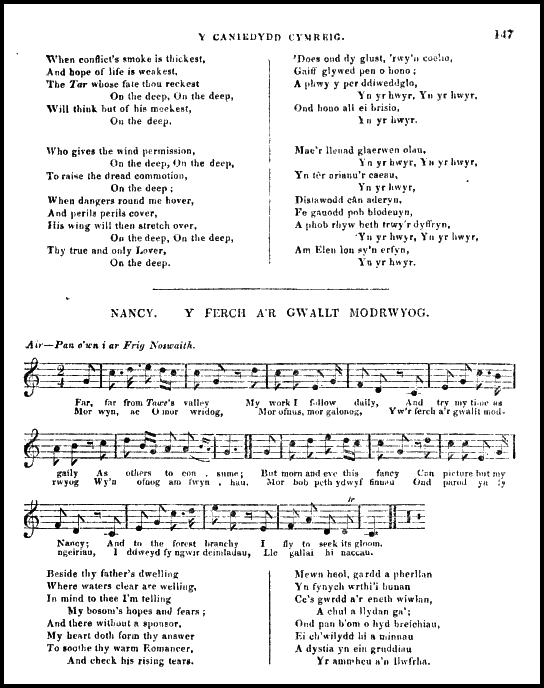
(delwedd J4397) (tudalen 147)
|
Y CANIEDYDD CYMREIG.
xx
![[merged small][merged small][merged small][merged small][merged small][merged small][merged small][ocr errors][merged small][merged small][merged small][merged small][merged small][merged small][merged small][merged small][merged small][merged small][merged small][merged small][ocr errors]](sion-prys_310_caniedydd_cymreig_1845_rhan-2_3597k_files/image194.jpg)
Nancy; And to the forest branchy I fly to seek its gloom.
ngeiriau, I
ddweyd fy ngwir deimladau, Lle gallai hi naccau. Beside thy father's dwelling
Mewn heol, gardd a pherllan Where waters clear are welling,
Yn fynych wrthi'i hunan
In mind to thee I'm telling
Ce's gwrdd a'r eneth wiwlan,
My bosom's hopes and fears ;
A chul a llydan ga';
And there without a sponsor,
Ond pan b�om o hyd breichiau, My heart doth form thy answer
Ei ch�wilydd hi a minnau
To soothe thy warm Romancer,
A dystia yn ein gruddiau
And check his rising tears.
Yr ammheu a'n llwfrhn.
|
|
�
|
|
|
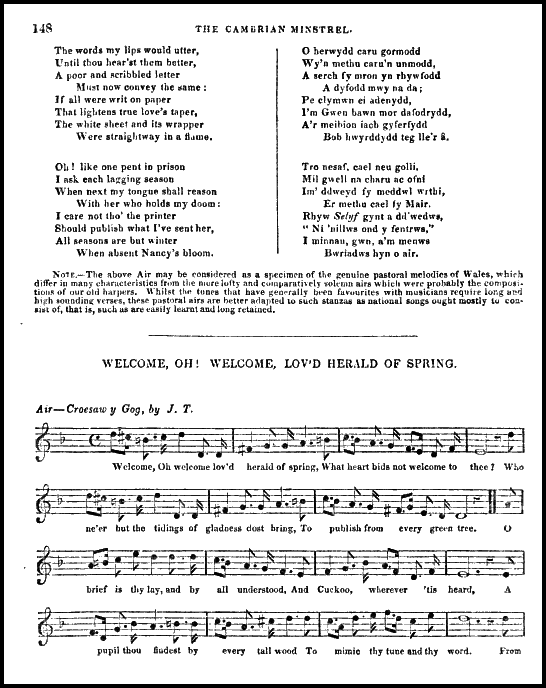
(delwedd J4398) (tudalen 148)
|
THE CAMBRIAN MINSTREL.
The words my lips would
utter,
Until thou bear'st them better,
A poor and scribbled letter
Muist now convey the same :
If all were writ on paper
That lightens true love's taper,
The white sheet and its wrapper
Were straightway in a fume.
O herwydd caru gormodd
Wy�n methu caru'n unmodd,
A serch fy mron yn rhywfodd
A dyfodd mwy na da;
Pe clymwn ei adenydd,
I'm Gwen bawn mor da fodrydd,
A�r meibion iach gyferfydd
Bob hwyrddydd
teg lle'r �.
Oh ! like one pent in prison
Tro nesaf, cael neu golli, I ask each lagging season
Mil gwell na charu ac ofni
When next my tongue shall reason
Im' ddweyd fy meddwl wrthi,
With ber who holds my doom :
Er methu cael ly Mair.
I care not tho' the printer
Rhyw Selyf gynt a dd'wedws, Should publish wbat I've
sent her,
� Ni 'villws ond y fentrws," All seasons are but winter
I minnau, gwn, a'm menws
When absent Nancy's bloom.
Bwriadws hyn o
air. Note.-The above Air may be considered as a specimen of the genuine
pastoral melodies of Wales, which differ in many characteristics from the
more lofty and comparatively solemn airs which were probably the composi.
tions of our old harpers. Whilst the tunes that have generally been
favourites with musicians require long and high sounding verses, these
pastoral airs are better adapted to such stanzas as national songs ought
mostly to consist of, that is, such as are easily learnt and long retained.
WELCOME, OH! WELCOME, LOV'D HERALD OF SPRING.
![[merged small][merged small][ocr errors][merged small][merged small][merged small][merged small][merged small][merged small][merged small][merged small][merged small][merged small][merged small][merged small][merged small][merged small][merged small]](sion-prys_310_caniedydd_cymreig_1845_rhan-2_3597k_files/image197.jpg)
|
|
�
|
|
|

(delwedd J4399) (tudalen 149)
|
Y CANIEDYDD CYMREIG. 149
village and homestead, from mountain and dell, A voice comes in answer to
thee, And� e'en the young damsel who
draws from the well, Thy song doth repeat in its key!
Cuckoo, sweet Cuckoo, why
art thou so shy
Where thousands thy form would behold ?
The bird that's so welcome who would not espy
As it flies o'er the greenwood or wold?
Whoever molesteth the rook or the daw,
Thy bosom need never feel dread,
For who that beheld thee from dingle or shaw
Did e'er fing a stone at thy head?
The eyes that thy advent so eagerly watch,
'Tis these thou dost shun in dismay!
And e'en when thou'rt welcome to perch on our thatch
In coyness thou keepest away.
Yet, bird of the green months, perhaps it is thou
Of minstrels at last art most wise,
For though such affection's avow'd for thee now,
Who knows but 'tis for thy disguise?
A harbinger thou who dost tell us thy news,
And leav'st us as soon as 'tis told,
And even the joy thy own lay doth diffuse
Wilt scarce make a stay to behold;
If each child of song but as wisely would do
When sung is the lay he would sing,
Wherever he wander'd his world would be new,
And his life a perennial spring
GLENYDD CLYDACH. THE ROVER.
Rhwng geirwon lenydd Clydach, Mae�r ferch rwy�n garu�n byw; A moelydd, gwn,
gerwinach Nid oes o Went I Gyrw: Ond dan y garwaf lenydd Mae llawer tirion
fan, A'r rhai'n cofleidia'u coedydd Fel breichiaf fi fy Ann. Ar lawer noswaith
arw
Ar lawer noswaith arw
Mi �s dros Bwll y Cwn,
Er diced oedd ei ferw
A hylled oedd ei swn:
Ac uwch ei geudod erchyll,
I sio mynwes serch,
Mi ganais lawer pennill
Tra 'roswn am fy merch.
When told by wand'ring lovers
What pleasure 'twas to woo;
I said among the rovers
I'd be a rover too.
Since fair maids are so plenty
To prove myself a man,
Why, hug and toy with twenty
I might as well as one.
|
|
�
|
|
|

(delwedd J4400) (tudalen 150)
|
150 THE CAMBRIAN MINSTREL.
Rhai �nt i wrando�r eos�
Sy obry'n swvno'r dd�l,
A denent finnau�r hwyrnos
I frysio ar eu hol;
Ond pan bo'm bryd ar fyned
Caf glywed dan y graig
Lais fwynach byth i'm enaid,
Gan eneth wnawn yn wraig.
Dros serthaf lethri'r darren,
Trwy gulaf lwybrau'r coed,
'Does gafr yn pori'r glasbren
Sydd hoywach ar ei throed:
A llawer hwyrdaith wnaethom
Dros lithrig dd�l a ffin,
Rowdd brawf trwy'r tir rodiaswn
I'm tyb o egni�m mun.
Pan byddo'r Gulwern noethlyd
Dan gnwd o wenith gwyn,
A chornant Llamarch ynfyd
Yn colli ei thaith o'r bryn;
A'r Ddinas i rai anghall
Yn ardd o gylch eu ty,
Pryd hyny tyn merch arall
Fy serch oddiwrthi hi.
As bees among the flowers,
On every ruby lip
At late and early hours
I sought any honey'd sip,
But in my am�rous revel
A maid as vain as I,
To bring me to my level
My own arts 'gan to ply.
This maid was very handsome
And knew of every wile
That help'd her look so winsome
My proud heart to beguile;
And I in turn a Lover
That sue'd to be believed.
Found when I thought most of her
What 'twas to be deceiv�d.
Now, mortified and humbled,
I tell you rovers all
How wittingly I stumbled
Who made so many fall;
And when I knew the value
Of well requited love,
Then, to my shame I tell you,
How Love my scourge did prove.
HARVEST RHYMES.
Sun, thy beams are doubly bright,
When they fall on corn-fields white:
Cumbria's hills, do they not yet
Woo thy kindly nursing beat?
As thou bright'nest from the skies,
Thus from earth shall grateful eyes
Light for light to thee repay,
The gladness of the harvest day.
But the clouds, have they not spread
This gloom portentous over head?
Armed bands, with sullen look,
Eye the fields which they've forsook;
Where the reaper's hand hath plied,
Scatter'd sheaves the storm must hide;
And the standing remnant droops,
Where no reaper to it stoops.
In the pray'r of early morn,
If a sigh went for the corn,
He that gives our daily bread,
Deems not worse that pray'r when said.
See again the wind hath veer�d,
And the heart of man is cheer'd.
Man, - shall that serener sky
Make thee now forget to pray!
See again, � the clouds are gone,
Shines the sun e'en as he shone;
Sickles gleam where�er he smiles,
Harvest cohorts stretch their files;
Falls the corn to man�s embrace;
And bows to meet his glowing face;
Wheat and barley, oats and rye
In beauty stand, in beauty lie.
|
|
�
|
|
|

(delwedd J4401) (tudalen 151)
|
Y CANIEDYDD CYMREIG.
xx![[merged small][merged small][merged small][merged small][merged small][merged small][merged small][merged small][merged small][merged small][ocr errors][merged small][merged small][merged small][merged small][merged small][merged small][merged small][merged small][merged small][merged small][merged small][merged small][merged small][merged small]](sion-prys_310_caniedydd_cymreig_1845_rhan-2_3597k_files/image205.jpg)
|
|
�
|
|
|

(delwedd J4402) (tudalen 152)
|
THE CAMBRIAN MINSTREL.
MY NANNY.
Air-Beth 'wedy di am fab i Ffarmwr? (What sayest thou of a Farmer's son ?)
![[ocr errors][merged small][merged small][merged small]](sion-prys_310_caniedydd_cymreig_1845_rhan-2_3597k_files/image209.jpg)
name I dare
pluck out the dart That oft'nest keeps my eye from sleeping. What tho' the
lass I love is poor,
What if she wears a flannel gown, Ev'n poverty with such as Nanny,
Her lover hath enough of judgment I'll prove it all by nature's lore,
Thro' thicker things to see and own 'Tis better far than Hate with money.
What beauty in
hier vest hath lodgment.
![[merged small][merged small][merged small][merged small][merged small][ocr errors][merged small][merged small][merged small][merged small][merged small][ocr errors][merged small][merged small][merged small]](sion-prys_310_caniedydd_cymreig_1845_rhan-2_3597k_files/image211.jpg)
She that hath
had offers fifty
When the green sod was thy
pillow,
Nothing hopes but to be thine ;
Hardships suffer'd then by
thee,
On the breast that prays thy safety
Shall make sweeter joys that
follow
Come my soldier and recline ;
Wben thou dwell'st with peace and me. *This Song may be sung to the air
of Maid of Scer,
|
|
�
|
|
|
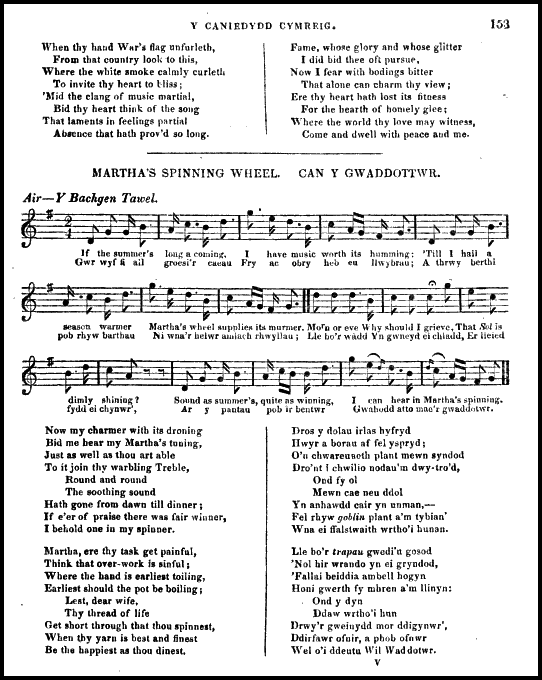
(delwedd J4403) (tudalen 153)
|
Y CANIEDYDD CYMREIG.
xx
![[blocks in formation]](sion-prys_310_caniedydd_cymreig_1845_rhan-2_3597k_files/image214.jpg)
season warmer
pob rhyw barthau
Martha's wheel supplies its
murmer. Mon or eve Why should I grieve, That Sol is
Ni wna'r helwr amlach rhwyllau ; Lle bo'r w�dd Yn gwneyd ei chladd, Er lleied
![[blocks in formation]](sion-prys_310_caniedydd_cymreig_1845_rhan-2_3597k_files/image216.jpg)
|
|
�
|
|
|
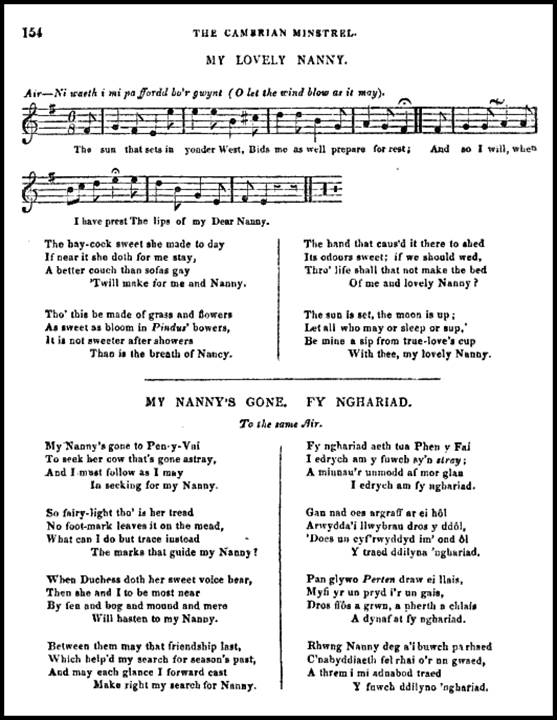
(delwedd J4404) (tudalen 154)
|
THE CAMBRIAN
MINSTREL.
MY LOVELY
NANNY.
Air-Ni waeth i mi pa fordd bo'r gwynt (O let the wind blow as it may).
![[ocr errors]](sion-prys_310_caniedydd_cymreig_1845_rhan-2_3597k_files/image220.jpg)
The sun that sets in yonder West, Bids me as well prepare for rest ;
![[blocks in formation]](sion-prys_310_caniedydd_cymreig_1845_rhan-2_3597k_files/image222.jpg)
![[blocks in formation]](sion-prys_310_caniedydd_cymreig_1845_rhan-2_3597k_files/image224.jpg)
|
|
�
|
|
|
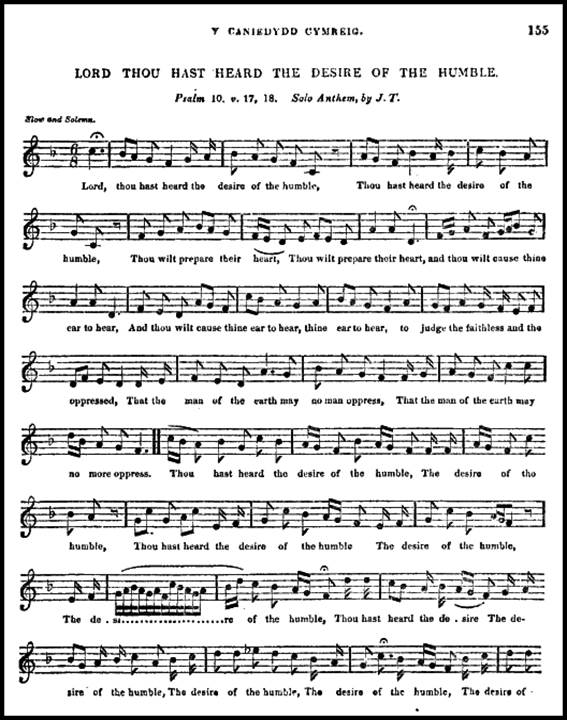
(delwedd J4405) (tudalen 155)
|
Y CANIEDYDD CYMREIG.
LORD THOU HAST HEARD THE DESIRE OF THE HUMBLE.
![[merged small][merged small][merged small][merged small][ocr errors][ocr errors][ocr errors][merged small][merged small][merged small][merged small][ocr errors]](sion-prys_310_caniedydd_cymreig_1845_rhan-2_3597k_files/image228.jpg)
humble,
Thou wilt
prepare their heart, Thou wilt prepare their heart, and thou wilt cause thine
ear to hear,
And thou wilt cause thine ear to hear, thine ear to hear, to judge the
faithless and the
![[merged small][merged small][merged small][merged small][merged small][merged small][merged small][merged small][merged small][merged small][merged small][merged small][merged small][merged small][merged small][ocr errors][merged small][merged small][merged small][ocr errors][merged small][merged small]](sion-prys_310_caniedydd_cymreig_1845_rhan-2_3597k_files/image230.jpg)
the humble,
The
desire of the humble,
The desire of the humble, The desire of the
|
|
�
|
|
|
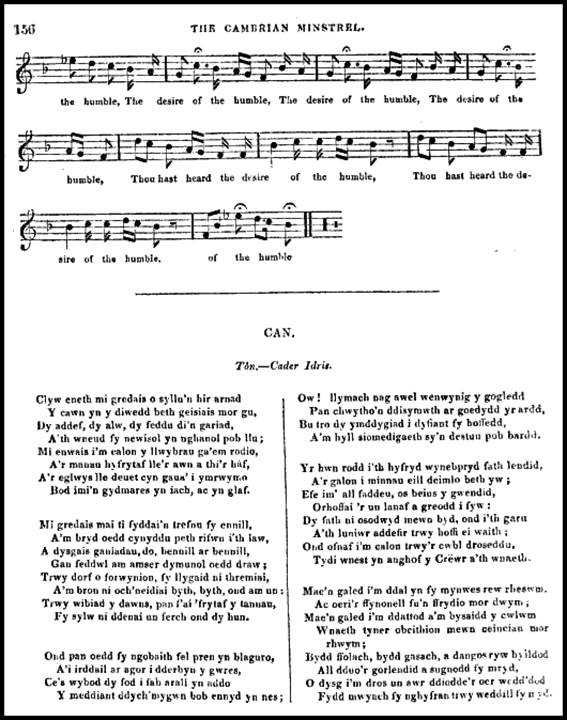
(delwedd J4406) (tudalen 156)
|
THE CAMBRIAN MINSTREL.
xx![[blocks in formation]](sion-prys_310_caniedydd_cymreig_1845_rhan-2_3597k_files/image234.jpg)
|
|
|
|
|

(delwedd J4407) (tudalen 157)
|
Y CANIEDYDD CYMREIG.
xx
![[blocks in formation]](sion-prys_310_caniedydd_cymreig_1845_rhan-2_3597k_files/image238.jpg) More than loads O'er
roughest roads, Makes man to languish; Anguish sore and anguish lasting, That More than loads O'er
roughest roads, Makes man to languish; Anguish sore and anguish lasting, That
![[blocks in formation]](sion-prys_310_caniedydd_cymreig_1845_rhan-2_3597k_files/image240.jpg)
|
|
�
|
|
|
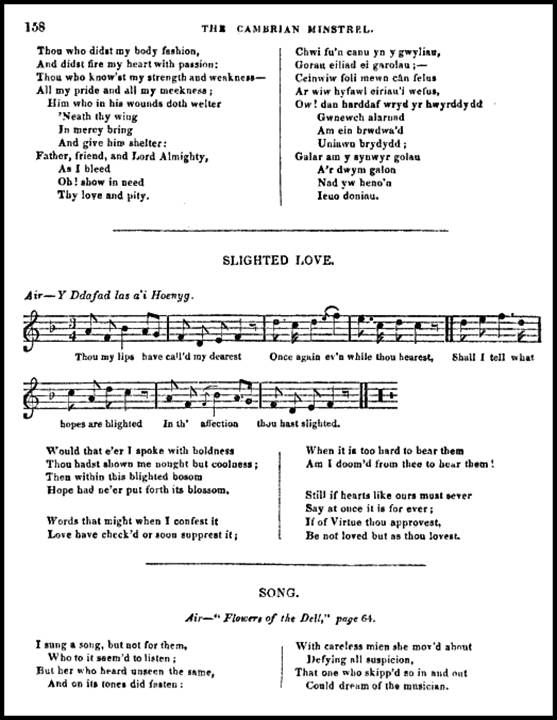
(delwedd J4408) (tudalen 158)
|
THE CAMBRIAN MINSTREL.
�
![[merged small][merged small][merged small][merged small][merged small][ocr errors][merged small][merged small][merged small][merged small][merged small][merged small][merged small][merged small][merged small][merged small][merged small][merged small][merged small][merged small]](sion-prys_310_caniedydd_cymreig_1845_rhan-2_3597k_files/image244.jpg)
|
|
�
|
|
|

(delwedd J4409) (tudalen 159)
|
�Y CANIEDYDD CYMREIG.
![[blocks in formation]](sion-prys_310_caniedydd_cymreig_1845_rhan-2_3597k_files/image248.jpg)
The leaves are falling fast, And each doth whisp'ring tell, That so on
earth will fall at last All
![[blocks in formation]](sion-prys_310_caniedydd_cymreig_1845_rhan-2_3597k_files/image250.jpg)
|
|
�
|
|
|
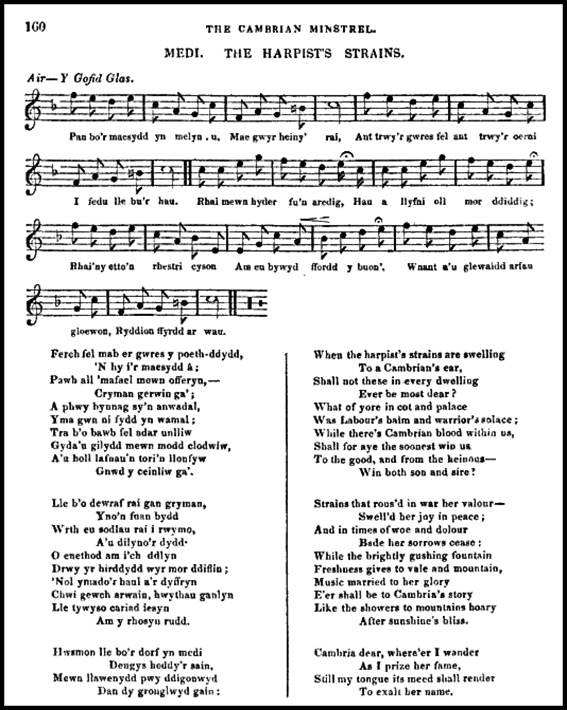
(delwedd J4410) (tudalen 160)
|
THE CAMBRIAN MINSTREL.
�
![[merged small][merged small][merged small][merged small][ocr errors][merged small][merged small][merged small][ocr errors][merged small][merged small][merged small][merged small][merged small][merged small][merged small][merged small][merged small][ocr errors][merged small][merged small][merged small][merged small][merged small][merged small][merged small]](sion-prys_310_caniedydd_cymreig_1845_rhan-2_3597k_files/image254.jpg)
|
|
�
|
|
|

(delwedd J4411) (tudalen 161)
|
�Y CANIEDYDD CYMREIG.
![[merged small][merged small][merged small][merged small][merged small][ocr errors][merged small][merged small][merged small][merged small][merged small][merged small][ocr errors][merged small][merged small][merged small][ocr errors][merged small][merged small][merged small][merged small][merged small][ocr errors][merged small][merged small][merged small][merged small][merged small]](sion-prys_310_caniedydd_cymreig_1845_rhan-2_3597k_files/image258.jpg)
Though strong as a
draught-horse, his strength he'll not use This happy young swain is the
readiest to heal,
His neighbour that's weaker to awe or abuse,
And where is the coterie, where
nine out of ten
But hundreds can witness on foot-path and road
Won't vouch what I've utter'd of Tom of the Glen ? How Thomas hath
help'd them when spent with their load; And if 'neath their burden they
totter again,
When his sense is the quickest, and humour most fine, What face would
they welcome like Tom's of the Glen ? He's for neither
indebted to liquor or wine,
To a mind so elastic say what could they do He always is merry, but Tom
ne'er was seen
But just what the food that o'er-suppeth the dew, To laugh at the cause
of another's chagrine;
And what doth that flood but
convert to a fen
And oft has the peasant, whose courage all fear,
A mead like the temper of
Tom of the Glen.
For suff'rers been notic'd to shed a bright tear:
How different from braggarts, who'd term themselves
men,
Tho' courteous to maidens as
well as young men,
In all save his name, is this Tom of the Glen!
One only is courted by Tom of the Glen,
And sooner than he would his
Sally betray
His wit, tho' as bright as one's heart can desire, The arm that she leans on,
he'd first cast away,
Does ne'er set the house of the worthy on fire;
For of all the young fellows your fair maids would ken, And e'en to the guilty
the wound he may deal,
() who hath
the honour of Tom of the Glen.
|
|
�
|
|
|
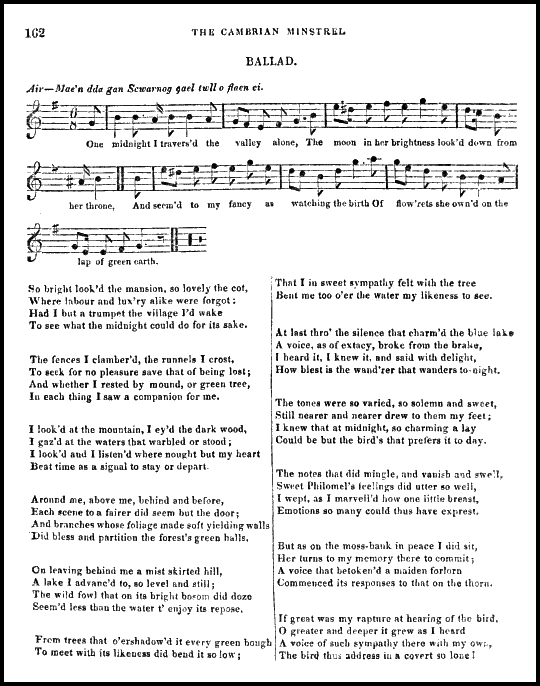
(delwedd J4412) (tudalen 162)
|
THE CAMBRIAN MINSTREL.
![[merged small][merged small][merged small][merged small][merged small][merged small][merged small][merged small][merged small][merged small][merged small][ocr errors][merged small]](sion-prys_310_caniedydd_cymreig_1845_rhan-2_3597k_files/image261.jpg)
That I in sweet sympathy felt with the tree So bright look'd the mansion,
so lovely the cot,
Bent me too o'er the water my likeness to see. Where labour and lux�ry
alike were forgot : Had I but a trumpet the village I'd wake To see what the
midnight could do for its sake.
At last thro' the silence that cbarm'd the blue lake
A voice, as of extacy, broke from the brake, The fences I clamber'd, the
runnels I crost,
I heard it, I knew it, and said with delight, To seek for no pleasure
save that of being lost;
How blest is the wand'rer that wanders to-night. And whether I rested by
mound, or green tree, In each thing I saw a companion for me.
The tones were so varied, so solemn and sweet,
Still nearer and nearer drew to them my feet; I look'd at the mountain, I
ey'd the dark wood, I knew that at midnight, so charming a lay I gaz'd at the
waters that warbled or stood;
Could be but the bird's that prefers it to day. I look'd and I listen'd
where nought but my heart Beat time as a signal to stay or depart.
The notes that did mingle, and vanish and swell,
Sweet Philomel's feelings did utter so well, Around me, above me, bebind
and before,
I wept, as I marvell�� how
one little breast,
Each scene to a fairer did seem but the door;
Emotions so many could thus have
expresi.
And branches whose foliage made soft yielding walls
Did bless and partition the forest's green halls.
But as on the moss-bank in peace I did sit,
Her turns to my memory there to commit; On leaving bebind me a mist
skirted hill,
A voice that betoken'd a niaiden forlorn A lake I advanc'd to, so level
and still;
Commenced its responses to that on the thorn. The wild fowl that on its
bright bosom did doze Seem'd less than the water enjoy its repose.
If great was my rapture at hearing of the bird,
O greater and deeper it grew as I heard From trees that o'ershadow'd it
every green bough A voice of such sympathy there with my own, To meet with
its likeness did bend it so low; The bird thus address in a covert so lone!
�
|
|
�
|
|
|
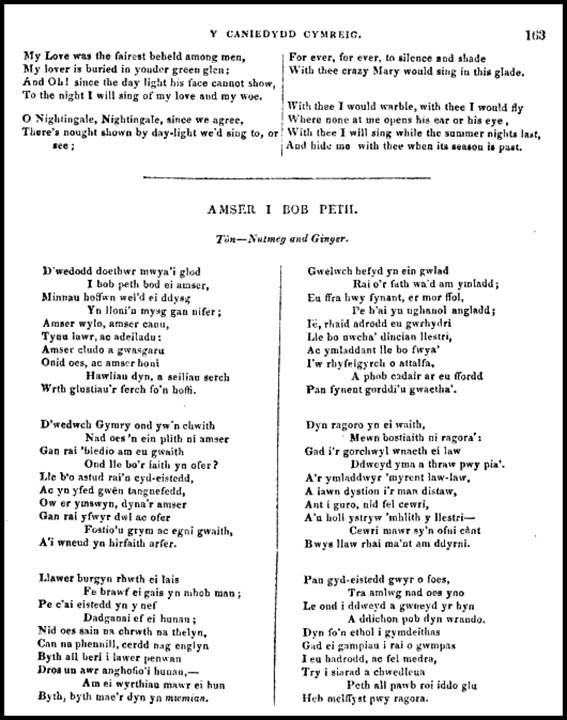
(delwedd J4413) (tudalen 163)
|
�
Y CANIEDYD CYMREIG. 163
My Love
was the fairest beheld among men,
My lover
is buried in yonder green glen;
And Ohl
since the day light his face cannot show,
To the
night I will sing of my love and my woe.
O
Nightingale, Nightingale, since we agree,
There's
nought shown by day-light we'd sing to, or see;
For
ever, for ever, to silence sod shade
With
thee crazy Mary would sing in this glade.
With thee
I would warble, with thee I would fly
Where
none at me opens his ear or his eye,
With
thee I will sing while the summer nights last,
And hide
ms with thee when its season is past.
AMBER I
BOB PETH.
Tun�Nutmeg
and Ginger.
liwedodd
doethwr mwya'i glod I bob petit bod ei maser, Ilinnau hoffwn word ei ddysg Yn
Henna tnysg gam oiler ; Ammer wylo, amser cam', Tyco love, ae adeiladu :
Amser elude a givargans Oeid oes, ne runner hoot Hannan dyn. � 'titian torch
Wrth glustieu'r fetch fo'n both.
D'wedwch
Gymry and yw'n chants Nad oes 'n ein plith of amser Can rai ibledie am en
gwitith Ond lie boss faith yn ofer? Lie Voluted rai'o cyt�eistedd, Ao yn yfed
gwen tangnefedd, Ow or ymswyn, dyner amser Gan tai yfwyr diet ac ofer
Fottiosu grym ae egni gsvaith, A'i newd yn hirfaitb aria.
Vane
heron rhwth ei lams Fa brawl ei gais yn nihob man ; Pe c'ai eistedd yn y nef
Dadgaoai of ei Inman; Nid oes sain OA chrwth TIII thelyn, Can no phennill,
cerdd nag englyn Byth ell her! i lower pent's!' Dees no an anghotio'l
button,� Am ei wyrthian mar ei bun By& byes mae'r dyn yn anemia
Owelwch
hefyd yn ein gwlad I41 ost feth wad am yinlndd; En ffra hwy fynant, er mor
Rol, Pe Wei ye �ghetto' anghtld; li,rhaid adrodd eu gwrhydri Lle be �webs'
dincian Ao ymladdant Ile bo Bert' l'w rhyfelgyrolt a attalfa, A phob ado&
ar eu ffordd Pan (silent gorddru gwaethe.
Dyn
ragoro yn ei maids, Mown hessian's ni ragoralt and rr gorchwyl wnneth el law
Ddereydymn a thaw pwy pia'. A'r ymladdwyr 'myrent A lawn dystion rr man
distaw, Ant I gore, old fel cewri, Ala boll yraryw 'mblith y Ilestri�Genii
OIRMs ay'n ofni cent Bwys Haw rhai ma'at am ddynn.
Pan gyd�eistedd gwyr o foes, Ira amlwg nad
oes yno Le end I chlweyd a gwneyd yr byn A ddichon pob dyn issued�. Dyn fo'n
ethol i gymdeithas Gad ei sample's 1 rad o gwmpas I en hadrodd, no fel Towne,
Try i shred a ebwedletta Petit all pawls roi iddo gin Itch melff)st pwy
'agora.
�
�
My Love was the fairest
beheld among men, For ever, for ever, to silence and shade
My lover is buried in yonder green glen;
With thee crazy Mary would
sing in this glade.
And Oh! since the day light bis face cannot show,
To the night I will sing of my love and my woe.
With thee I would warble, with thee I would fly O
Nightingale, Nightingale, since we agree, Where none at me opens his ear or
his eye, There's nought shown by dny-light we'd sing to, or With thee I will
sing while the summer nights last, see ;
And hide me with thee when its season is past.
![[blocks in formation]](sion-prys_310_caniedydd_cymreig_1845_rhan-2_3597k_files/image265.jpg)
|
|
�
|
|
|
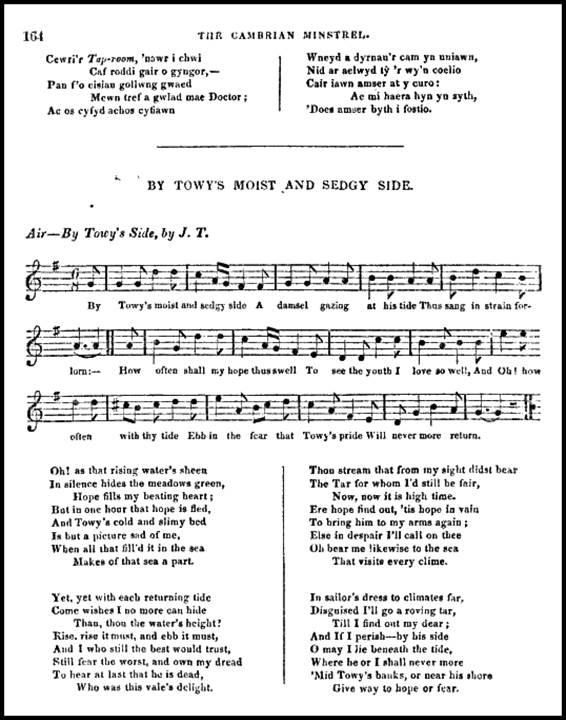
(delwedd J4414) (tudalen 164)
|
THE CAMBRIAN MINSTREL.
![[merged small][merged small][merged small][merged small][ocr errors][merged small][merged small][merged small][merged small][ocr errors][merged small][merged small][merged small][merged small]](sion-prys_310_caniedydd_cymreig_1845_rhan-2_3597k_files/image269.jpg)
often
with thy tide
Ebb in the fear that Towy's pride Will never more return.
Oh! as that rising water's
sheen
In silence hides the meadows green,
Hope fills my beating heart;
But in one hour that hope is fled,
And Towy's cold and slimy bed
Is but a picture sad of me,
When all that fill'd it in the sea
Makes of that sea a part.
Thou stream that from iny
sight didst bear
The Tar for whom I'd still be fair,
Now, now it is high time.
Ere hope find out, 'tis hope in vain
To bring him to my arms again ;
Else in despair I'll call on thee
Oh bear me likewise to the sea
That visits every clime.
Yet, yet with each returning
tidc
Come wishes I no more can hide
Than, thou the water's
height?
Rise, rise it must, and ebb it must,
And I who still the best would trust,
Still fear the worst, and own my dread
To bear at last that he is dead,
Who was this vale's delight.
In sailor's dress to
climates far,
Disguised I'll go a roving tar,
Till I find out my dear;
And If I perish-by his side
o
may
I Jie beneath the tide, Where he or I shall never inore 'Mid Towy's
banks, or near his shore
Give way to hope or fear.
�
|
|
�
|
|
|
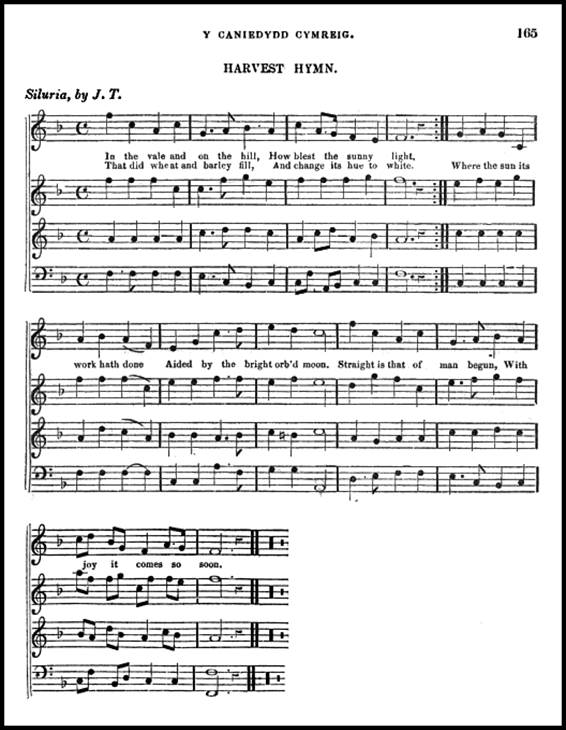
(delwedd J4415) (tudalen 165)
|
Y
CANIEDYDD CYMREIG.
![[merged small][merged small][graphic][subsumed][subsumed][graphic][ocr errors][subsumed][subsumed][subsumed][ocr errors][merged small][ocr errors][ocr errors]](sion-prys_310_caniedydd_cymreig_1845_rhan-2_3597k_files/image273.jpg)
|
|
�
|
|
|
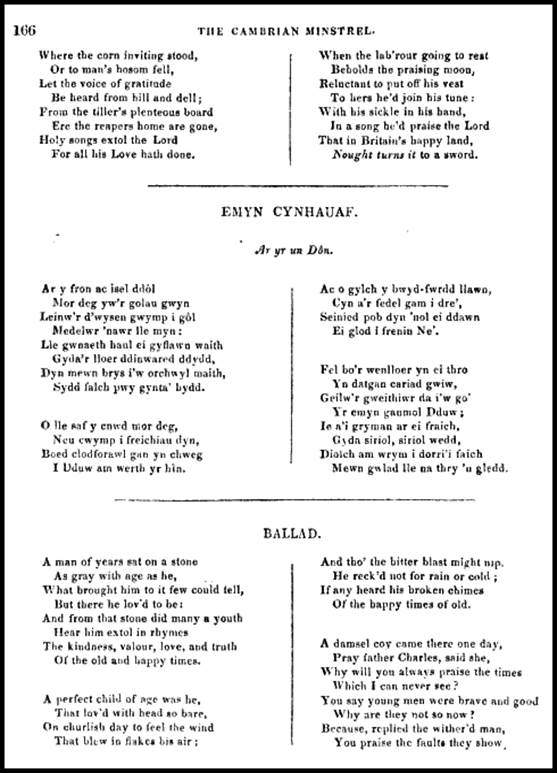
(delwedd J4416) (tudalen 166)
|
THE
CAMBRIAN MINSTREL.
![[blocks in formation]](sion-prys_310_caniedydd_cymreig_1845_rhan-2_3597k_files/image277.jpg)
|
|
�
|
|
|
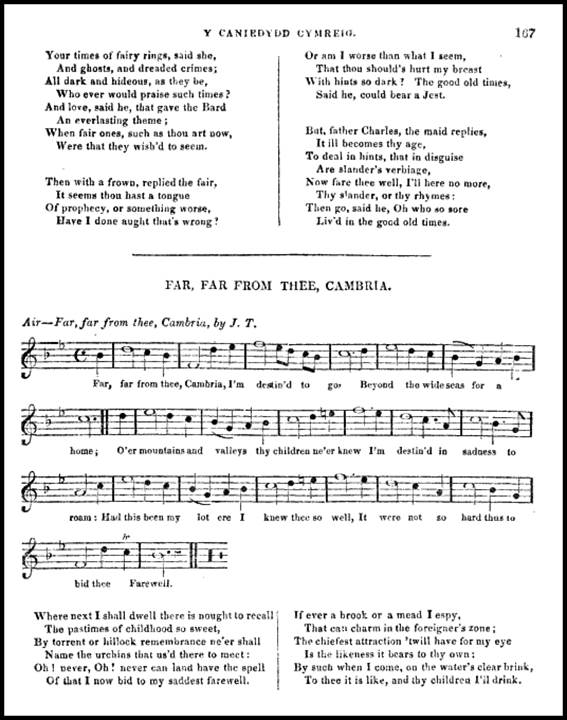
(delwedd J4417) (tudalen 167)
|
Y CANIEDYDD CYMREIG.
![[merged small][merged small][merged small][merged small][merged small][merged small][merged small][merged small][merged small][merged small][merged small][merged small][merged small][merged small][merged small][merged small][ocr errors][merged small][merged small][merged small][merged small][merged small]](sion-prys_310_caniedydd_cymreig_1845_rhan-2_3597k_files/image281.jpg)
|
|
�
|
|
|
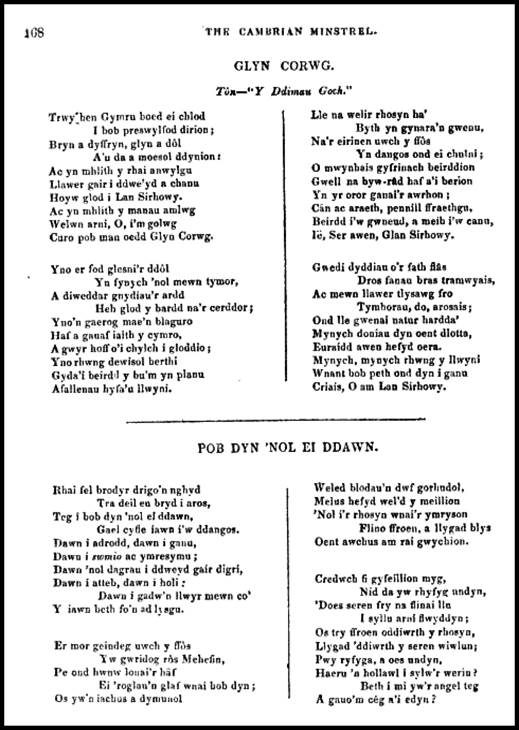
(delwedd J4418) (tudalen 168)
|
THE CAMBRIAN MINSTREL.
![[blocks in formation]](sion-prys_310_caniedydd_cymreig_1845_rhan-2_3597k_files/image285.jpg)
�
|
|
�
|
|
|

(delwedd J4419) (tudalen 169)
|
Y CANIEDYDD CYMREIG. 169
REGED.
Where hearts that are tried as the old British oak Make music so rare in the
Where kindness that ne�er wore hypocrisy's cloak, As freely comes forth as
the
bosoms of scores.
sweat of our pores; How rows a young fellow in heart and in soul, How
hard to do justice to give him his due, � Is the youth whom the serious, the
proud, and the
droll, Have nam'd and adopted the Pride of our Crew. .
Tom Tackle is merry of course o'er his grog.
But his dark eyes exhibit so radiant a shine;
I think if he quaff'd of the stream from the bog,
The glow of his spirit would change it to wine;
So bright is his whim, and so flowing his song,
The eagle that soars in the welkin so blue,
Needs as often a draught of the drink you call strong
As the happy Tom Tackle, the pride of our Crew.
If Tempest or battle his courage should test,
�Or foes our tight vessel should e'er
hold in chace.
When 'tis prudent to shew them of whom they're in quest,
Then who like Tom Tackle, a foeman can face?
But though for his King and his country he'd fight,
Just in the same spirit end and to serve the like end,
Whoso�er among messmates, strength standeth for right
As stoutly he'll stand in defence of a friend.
�
|
|
�
|
|
|
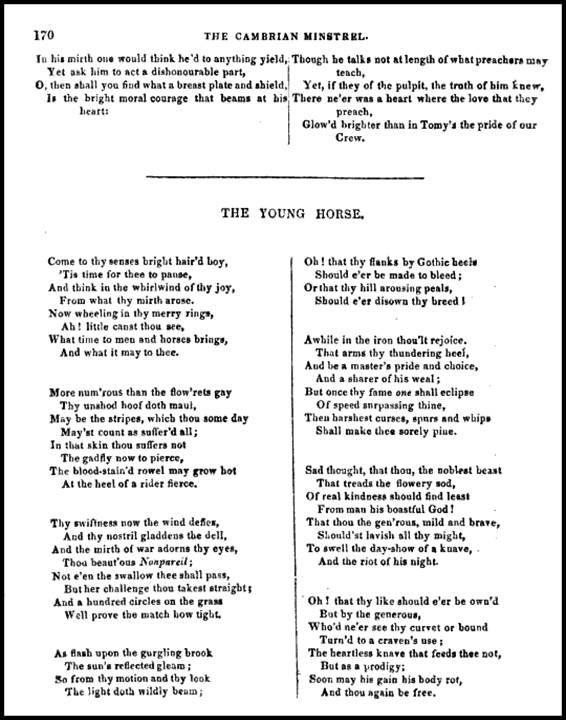
(delwedd J4420) (tudalen 170)
|
�
170 THE CAMBRIAN MINSTREL.
In his mirth one would think he'd to anything yield,
Yet ask him to act a dishonourable port,
O, then shall you find what a breast plate and shield,
Is the bright moral courage that beams at his heart:
Though he talks not at length of what preachers may teach,
Yet, if they of the pulpit, the truth of him knew,
There ne�er was a heart when the love that they preach,
Glow'd brighter than in Tomy's the pride of our Crew.
THE YOUNG HORSE.
Come to thy senses bright hair'd boy,
'Tis time for thee to pause,
And think in the whirlwind of thy joy,
�From what thy mirth arose.
Now wheeling in thy merry rings,
Ah! little canal thou see,
What time to men and horses brings,
And what it may to thee.
More num�rous than the flow'rets gay
Thy unshod hoof doth maul,
May be the stripes, which thou some day
May'st count as suffer�d all;
In that skin thou suffers not
The gadfly now to pierce,
The blood-stain'd rowel may grow hot
At the heel of a rider fierce.
Thy swiftness now the wind defies,
And thy nostril gladdens the dell,
And the mirth of war adorns thy eyes,
Thou beaut'ous Nonpareil;
Not e'en the swallow thee shall pass,
But her challenge thou takest straight;
And a hundred circles on the grass
Well prove the match how tight.
As flash upon the gurgling brook
The sun's reflected gleam;
So from thy motion and thy look
The light doth wildly beam;
Oh! that thy flanks by Gothic heels
Should e'er be made to bleed;
Or that thy hill arousing peals,
Should e'er disown thy breed!
�
Awhile in the iron thou'lt rejoice,
That arms thy thundering heel,
And be a master's pride and choice,
And a sharer of his weal;
But once thy fame one shall eclipse
Of speed surpassing thine,
Then harshest curses, spurs and whips
Shall make thee sorely pine.
Sad thought, that thou, the noblest beast
That treads the flowery sod,
Of real kindness should find least
From men his boastful God!
That thou the gen�rous, mild and brave,
Should'st lavish all thy might,
To swell the day-show of a knave,
And the riot of his night.
Oh! that thy like should e'er be own'd
But by the generous,
Who'd ne�er see thy curvet or bound
Turn'd to a craven's use;
The heartless knave that feeds thee not,
But as a prodigy;
Soon may his gain his body rot,
And thou again be free.
�
|
|
�
|
|
|

(delwedd J4421) (tudalen 171)
|
��THE CAMBRIAN
MINSTREL.
![[merged small][merged small][merged small][merged small][merged small][merged small][merged small][merged small][merged small][merged small][ocr errors][merged small][merged small][merged small][merged small][merged small][merged small]](sion-prys_310_caniedydd_cymreig_1845_rhan-2_3597k_files/image293.jpg)
MY LOVE, THOU'RT LIKE THE DEW-GEMM�D FLOWER.
My Love,
thou�rt like the dew-gemm'd now'r
And I am like the bee,
That by ench leafy bush and bow'r
Can find my way to thee:
And if a show'r of rain should fall,
Unlike the spoiler thief,
I shelter 'neath thy cloak or shawl,
As the bee beneath the leaf.
'Twas they I
think, too, dar'd assert
This archer boy was blind,
And yet what hound thro' forest's heart
Its way can better wind ?
If blind they mean because he sees
As mine in thee each charm;
Had he their philosophic eyes,
What would
they do but harm?
Men with great
heads and little hearts,
Y'clep'd philosophers,
Have said they can dissect to parts
Those passions fine of ours;
I reck not what their books may call
What guides me to my dove,
But the oldest name and best of all,
And that I like, is Love.
I've lov'd
thee truly-lov'd thee long,
And whatever wind might
blow,
To thee I sang my true love song
Ev'n as I sing it now.
And if the green grass quickly grows
O'er paths I've ost'nest
trod,
My ofl-sooth'd love its green blade shows
Par sooner than the sod.
MY LOVE, THOU'RT LIKE THE DEW-GEMM�D FLOWER.
My Love, thou�rt like the dew-gemm'd now'r
And I am like the bee.
That by ench leafy bush and bow'r
Can find my way to thee:
And if a show'r of rain should fall.
Unlike the spoiler thief.
I shelter 'neath thy cloak or shawl.
As the bee beneath the leaf.
'Twas they I think.
�too.
�dar'd assertThis archer boy was blind.
And yet what hound thro' forest's heartIts way can better wind?
If blind they mean because he sees
As mine in thee each charm;
Had he their philosophic eyes.
What would they do but harm?
Men with great heads and little hearts.
Y'clep'd philosophers.
Have said they can dissect to parts
Those passions fine of ours;
I reck not what their books may call
What guides me to my dove.
But the oldest name and best of all.
And that I like.
�is Love.
I've lov'd thee truly-lov'd thee
long.
And whatever wind might blow.
To thee I sang my true love songEv'n as I sing it now.
And if the green grass quickly growsO'er paths I've ost'nest trod.
My ofl-sooth'd love its green blade shows
Par sooner than the sod.
�
|
|
�
|
|
|
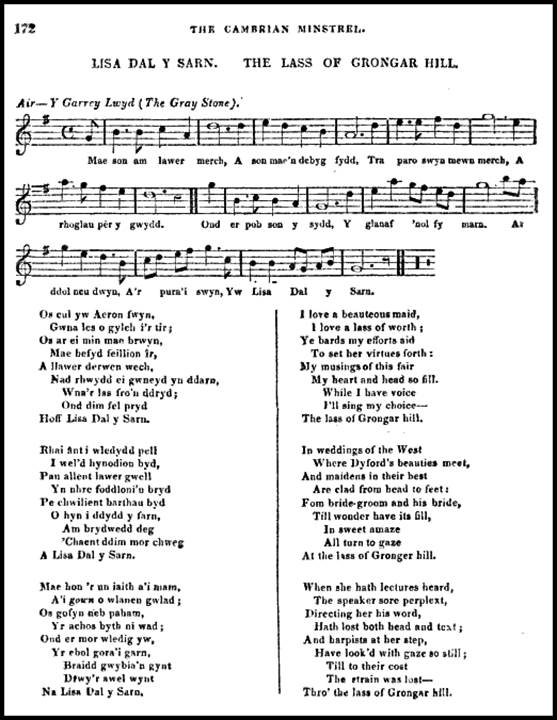
(delwedd J4422) (tudalen 172)
|
THE CAMBRIAN MINSTREL.
![[merged small][merged small][merged small][ocr errors][merged small][merged small][merged small][merged small][merged small][merged small][merged small][merged small][merged small][merged small][ocr errors][merged small][merged small][merged small][merged small][merged small][merged small][merged small][merged small][merged small][merged small]](sion-prys_310_caniedydd_cymreig_1845_rhan-2_3597k_files/image297.jpg)
�
|
|
�
|
|
|
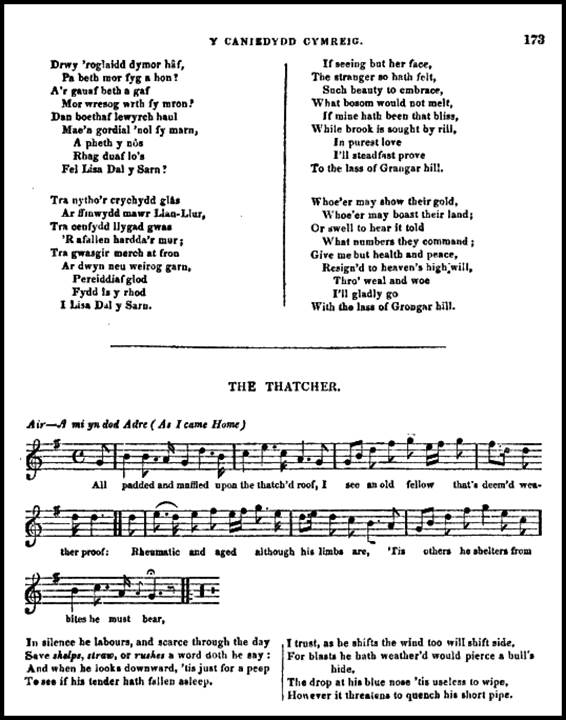
(delwedd J4423) (tudalen 173)
|
Y CANIEDYDD CYMREIG.
![[blocks in formation]](sion-prys_310_caniedydd_cymreig_1845_rhan-2_3597k_files/image301.jpg)
Forgot and
unheeded by warm groups that prate, 0, farmer, when supper is plac'd on thy
board, Beneath bim in comfort, before the red grate, His place to the
Thatcher who will not accord; Forgot is the Thatcher, e'en while he'd disarm
The scent that has reach'd him when on the high roof The wrath of Old Boreas,
when threat'ning their harm. Should tell what
substantials shall make him frost
proof.
�
|
|
�
|
|
|

(delwedd J4424) (tudalen 174)
|
THE CAMBRIAN MINSTREL.
![[merged small][merged small][ocr errors][ocr errors][merged small][merged small][ocr errors][merged small][merged small][merged small][merged small][merged small][merged small][merged small][merged small][merged small][merged small][merged small][merged small][merged small][merged small][merged small][merged small][merged small][merged small][merged small][merged small][merged small]](sion-prys_310_caniedydd_cymreig_1845_rhan-2_3597k_files/image305.jpg)
|
|
�
|
|
|
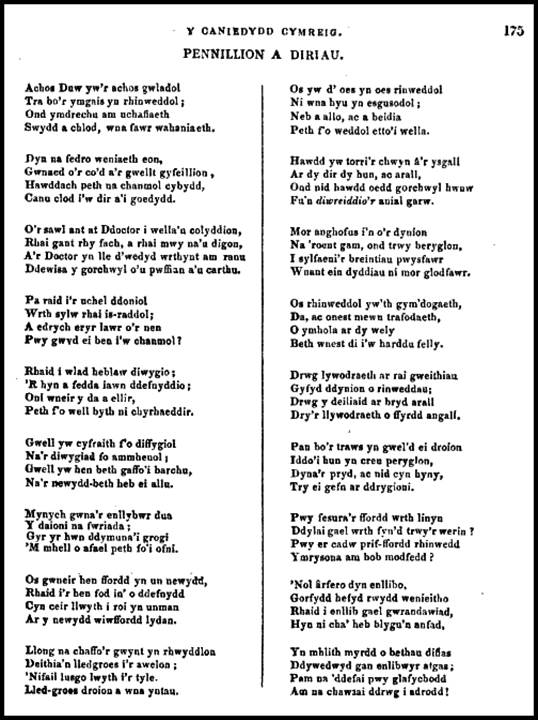
(delwedd J4425) (tudalen 175)
|
Y CANIEDYDD CYMREIG.
![[blocks in formation]](sion-prys_310_caniedydd_cymreig_1845_rhan-2_3597k_files/image309.jpg)
�
|
|
�
|
|
|
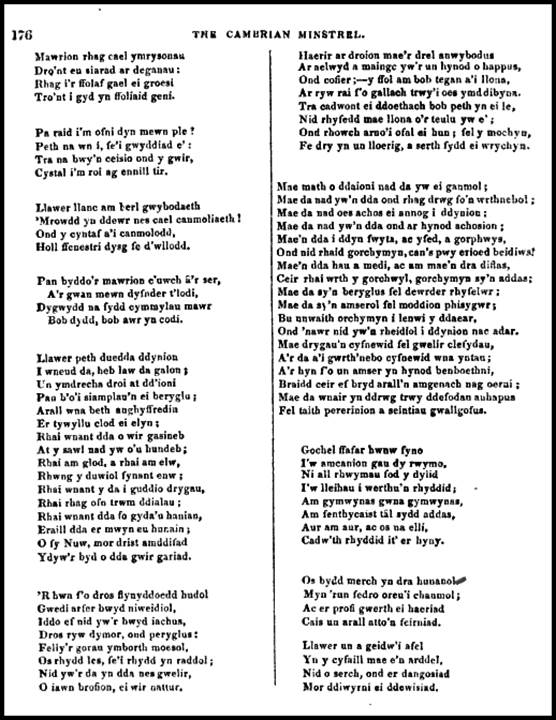
(delwedd J4426) (tudalen 176)
|
THE CAMBRIAN
MINSTREL.
Mawrion rhag
cael ymrysodau Dro'nt eu siarad ar deganau : Rhag i'r ffolaf gael ei groesi
Tro�nt i gyd yn ffoliaid geni.
Haerir ar droion mae'r drel
anwybodus
Ar aelwyd a maingc yw'r un hynod o bappus,
Ond cofier ;-y ffol am bob tegan a'i llona,
Ar ryw rai f'o gallach trwy'i oes ymd dibyna.
Tra cadwont ei ddoethach bob peth yn ei le,
Nid rhyfedd mae llona o'r teulu yw e';
Ond rhowch arno'i ofal ei hun ; fel y mochyn,
Fe dry yn un lloerig, a serth fydd ei wrychyo.
Pa raid i'm
ofoi dyn mewn ple ? Peth na wn i, se'i gwyddiad e': Tra na bwy'n ceisio ond y
gwir, Cystal i'm roi ag ennill tir.
Llawer llanc am terl
gwybodaeth
'Mrowdd yn ddewr nes cael canmoliaeth !
Ond y cyntaf a'i canmolodd,
Holl ffenestri dysg fe d�wllodd.
Pan byddo'r
mawrion c'uwch �'r ser,
A'r gwan mewn dysnder tlodi, Dygwydd na fydd cymmylau mawr
Bob dydd, bob
awr yn codi.
Mae math o ddaioni nad da yw
ei ganmol;
Mae da nad yw'n dda ond rhag drwg fo'n wrthnebol ;
Mae da nad oes achos ei annog i ddynion ;
Mae da nad yw'n dda ond ar hynod achosion ;
Mae'n dda i ddyn fwyta, ac yfed, a gorphwys,
Ond nid rhaid gorchymyn, can's pwy erioed beidiws?
Mae'n dda hau a medi, ac am mae'n dra diflas,
Ceir rhai wrth y gorchwyl, gorchymyn sy'n addas;
Mae da sy'n beryglus fel dewrder rhyfelwr;
Mae da sy'n amserol fel moddion phisygwr;
Bu unwaith orchymyn i lenwi y ddaear,
Ond 'nawr nid yw'n rheidiol i ddynion nac adar.
Mae drygau'n cyfnewid fel gwelir clefydau,
A'r da a'i gwrth�nebo cyfnewid wna yntau;
A'r hyn f'o un amser yn hynod benboethni,
Braidd ceir ef bryd arall'n amgenach nag oeroi ;
Mae da wnair yn ddrwg trwy ddefodau anhapus
Fel taith pererinion a seintiau gwallgofus.
Llawer peth duedda ddynion
I wneud da, heb law da galon ;
Un ymdrecha droi at dd'ioni
Pan b'o'i siamplau'n ei beryglu ;
Arall wna beth anghyffredin
Er tywyllu clod ei elyn;
Rhai wnant dda o wir gasineb
At y sawl pad yw o�u hundeb;
Rhai am glod, a rhai am elw,
Rhwng y duwiol fynant enw ;
Rhai wnant y da i guddio drygau,
Rhai rhag ofn trwm ddialau ;
Rhai wnant dda fo gyda'u hanian,
Eraill dda er mwyn eu hurain;
O fy Nuw, mor drist amddifad
Ydyw'r byd o dda gwir gariad.
Gochel ffafar hwnw fyno
I'w amcanion gau dy rwymo,
Ni all rhwymau fod y dylid
I'w lleihau i werthu'n rhyddid;
Am gymwynas gwna gymwynas,
Am fenthycaist t�l sydd addas,
Aur am aur, ac os da elli,
Cadw'th rhyddid it' er hyny.
Os bydd merch
yn dra hunanol Myn 'run fedro oreu'i cbanmol; Ac er profi gwerth ei haeriad
Cais un arall atto'n feirniad.
'Rhwn f'o dros flynyddoedd
hudol
Gwedi arfer bwyd niweidiol,.
Iddo ef nid yw'r bwyd iachus,
Dros ryw dymor, ond peryglus :
Felly'r gorau ymborth moesol,
Os rhydd les, fe'i rhydd yn raddol;
Nid yw'r da yn dda nes gwelir,
O iawn brofion, ei wir nattur,
Llawer un a geidw'i afel
Yn y cyfaill mae e'n arddel,
Nid o serch, ond er dangosiad
Mor ddiwyrni ei ddewisiad.
|
|
�
|
|
|
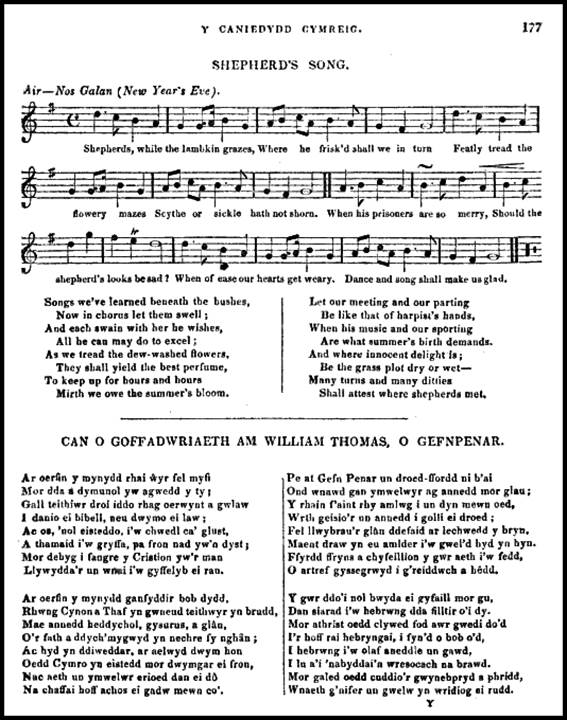
(delwedd J4427) (tudalen 177)
|
Y CANIEDYDD CYMREIG.
Shepherds, while the lambkin
grazes, Where he frisk'd shall we in turn
Featly tread the
flowery
mazes Scythe or
sickle hath not shorn. When his prisoners are so
merry, Should the
shepherd's looks be sad ? When of ease our hearts
get weary. Dance and song shall make us glad,
Songs we've learned beneath
the bushes,
Now in chorus let them swell;
And each swain with her be wishes,
All he can may do to excel;
As we tread the dew-wasbed fowers,
They shall yield the best perfume,
To keep up for hours and hours
Mirth we owe the summer's
bloom,
Let our meeting and our
parting
Be like that of harpist's hadds,
When bis music and our sporting
Are what suminer's birth demands,
And where innocent delight is;
Be the grass plot dry or wet-
Many turns and many ditties
Shall attest where shepherds
met.
CAN O GOFFADWRIAETH AM
WILLIAM THOMAS, O GEFNPENAR.
Ar oerfin y mynydd rhai wyr fel myfi
Mor dda a dymunol yw agwedd y ty ;
Gall teithiwr droi iddo rhag oerwynt a gwlaw
danio ei bibell, peu dwymo ei law;
Acos, 'nol eisteddo, i'w chwedl ca' glust,
A thamaid i'w gryffa, pa frou nad yw'n dyst;
Mor debyg i fangre y Cristion yw'r man
Llywydda'r uu wnai i'w gyffelyb ei ran.
Pe at Gefa Penar un droed-ffordd ni b'ai
Ond wnawd gan ymwelwyr ag annedd mor glau;
Y rhain f'aint rhy amlwg i un dyn mewn oed,
Wrth geisio'r un annedd i golli ei droed ;
Fel llwybrau'r gl�n ddefaid ar lechwedd y bryn,
Maent draw yn eu amlder i'w gweld hyd yn hyu.
Ffyrdd ffryns a chyfeillion y gwr aeth i'w fedd,
O artref gyssegrwyd i g'reiddwch a h�du.
Ar oerfin y mynydd ganfyddir
bob dydd,
Y gwr ddo'i nol beyda ei gyfaill mor gu,
Rhwng Cynon a Thaf yn gwneud teithwyr yn brudd, Dan siarad i'w hebrwng dda
filltir o'i dy.
Mae annedd heddychol, gysurus, a gl�n,
Mor atbrist oedd clywed fod awr gwedi do'd
O'r fath a ddych�mygwyd yn nechre fy ngh�n ; I'r hoff rai hebryngai, i fyo'd
o bob o'd,
ac hyd yn ddiweddar, ar aelwyd dwym bon I hebrwng i'w olaf aneddle un gawd,
Oedd Cymro yn eistedd mor dwymgar ei fron, I lu a'i 'nabyddai'n wresocach na
brawd.
Nac aeth un ymwelwr erioed dan ei do
Mor galed oedd cuddio'r
gwynebpryd a phridd, Na chaffai hoff achos ei gadw mewn co'.
C�N O GOFFADWRIAETH AM
WILLIAM THOMAS, O GEFNPENAR
Shall attest where shepherds met.
CAN O GOFFADWRIAETH AM WILLIAM THOMAS.
�O GEFNPENAR.
Ar oerfin y mynydd rhai wyr fel myfi
Mor dda a dymunol yw agwedd y ty;
Gall teithiwr droi iddo rhag oerwynt a gwlaw
danio ei bibell.
�peu dwymo ei law;
Acos.
�'nol eisteddo.
�i'w chwedl ca' glust.
A thamaid i'w gryffa.
�pa frou nad yw'n dyst;
Mor debyg i fangre y Cristion yw'r man
Llywydda'r uu wnai i'w gyffelyb ei ran.
Pe at Gefa Penar un droed-ffordd ni b'ai
Ond wnawd gan ymwelwyr ag annedd mor glau;
Y rhain f'aint rhy amlwg i un dyn mewn oed.
Wrth geisio'r un annedd i golli ei droed;
Fel llwybrau'r gl�n ddefaid ar lechwedd y bryn.
Maent draw yn eu amlder i'w gweld hyd yn hyu.
Ffyrdd ffryns a chyfeillion y gwr aeth i'w fedd.
O artref gyssegrwyd i g'reiddwch a h�du.
Ar oerfin y mynydd ganfyddir bob dydd.
�Y gwr ddo'i nol beyda ei gyfaill mor
gu.
Rhwng Cynon a Thaf yn gwneud teithwyr yn brudd.
�Dan siarad i'w hebrwng dda filltir o'i
dy.
Mae annedd heddychol.
�gysurus.
�a gl�n.
�Mor atbrist oedd clywed fod awr gwedi
do'd
O'r fath a ddych�mygwyd yn nechre fy ngh�n;
�I'r hoff rai hebryngai.
�i fyo'd o bob o'd.
|
|
�
|
|
|
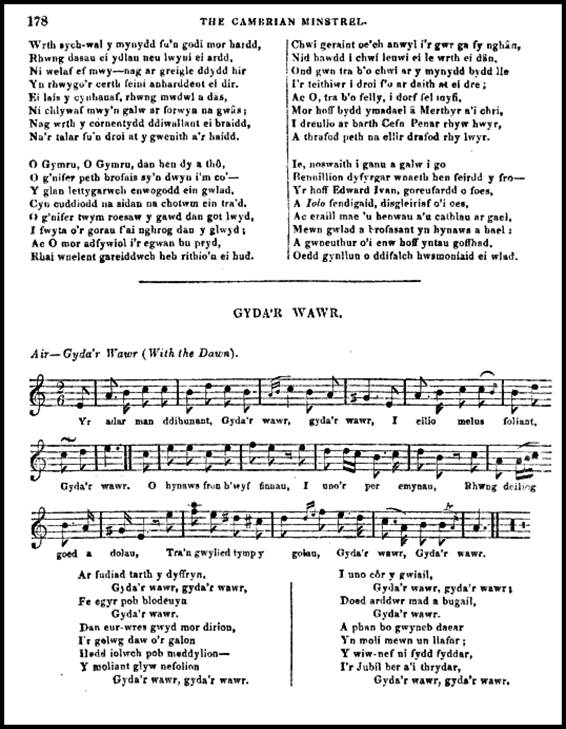
(delwedd J4428) (tudalen 178)
|
�THE CAMBRIAN MINSTREL.
Wnaeth g�nifer un gwelw yn wridiog ei rudd.
Y
![[merged small][merged small][merged small][merged small][merged small][merged small][merged small][merged small][merged small][merged small][merged small][merged small][merged small][merged small][merged small][merged small][merged small][merged small][ocr errors][merged small][merged small][merged small][merged small][merged small][merged small]](sion-prys_310_caniedydd_cymreig_1845_rhan-2_3597k_files/image317.jpg)
|
|
�
|
|
|

(delwedd J4429) (tudalen 179)
|
Y CANIEDYDD CYMREIG.
![[blocks in formation]](sion-prys_310_caniedydd_cymreig_1845_rhan-2_3597k_files/image321.jpg)
Young man,
methinks in you
That hound of bloody tooth,
That would my mother poor and me
Destroy with base untruth;
Who knows that worried sheep and lambs
By me should pitied be,
O let him from his words for shame,
But learn to
pity me.
Say, maid, the
mist was on the bill,
That thou
didst lose thy way; Or that with darkness thou could'st ill
Make out the time of day :
Ard see, fair maid, is it not so ?
Er'n like a curtain grey
It doth enclose us from below,
As if to bid thy stay.
Too well my mother knows that I
In darkness of the night
With loaded head have found my way
Across this rugged height.
In vain I'll say the cold grey mist�
By daylight kept me here;
To such a tale she would not list,
Nor such a
reason hear.
Fair maid, my
tongue itself hath tied,
Convicted here I stand,
And offer to thy virtuous pride
My once offending hand;
For want of money, name, and dress
Thou hast what
inakes amends, Then be my wife and nothing less,
Till the life thou blessest ends. No, no, for in my mother's cot,
E'en I am what I am,
Where none can taunt my humble lot,
Or bid me better sham.
If you can raise me to that state,
Wherein I'd know no need;
To save me from your kindred's hate
Is not so easy a deed.
Then tell
that Machen's furious bull
Came bellowing up the height, And made thee quit what thou would'st pull,
And frighten'd
take to fight;
Till the life thou blessest
ends.No.
�no.
�for in my mother's cot.
E'en I am what I am.
Where none can taunt my humble lot.
Or bid me better sham.
If you can raise me to that state.
Wherein I'd know no need;
To save me from your kindred's hate
Is not so easy a deed.
Then tell that Machen's furious bull
Came bellowing up the height.
�And made thee quit what thou would'st
pull.
And frighten'd take to fight;
|
|
�
|
|
|

(delwedd J4430) (tudalen 180)
|
THE CAMBRIAN MINSTREL.
I AM A SHEPHERD BOY.
Air-Cerdinen (The Fern).
am
a Shepherd Boy.
�And many sights there be in stream and
forest.
�cloud and
you takes heed.
�And spreads your scent.
�and sows your seed.
�'Though but the cloud and early dew
Wa.
I AM A SHEPHERD BOY.
Air-Cerdinen (The Fern).
am
a Shepherd
Boy, And many sights there be in stream and forest, cloud and
![[merged small][merged small][merged small][merged small][merged small][ocr errors][ocr errors][merged small][merged small][merged small][merged small][merged small][merged small][merged small][merged small][merged small][merged small][merged small]](sion-prys_310_caniedydd_cymreig_1845_rhan-2_3597k_files/image325.jpg)
�
|
|
�
|
|
|
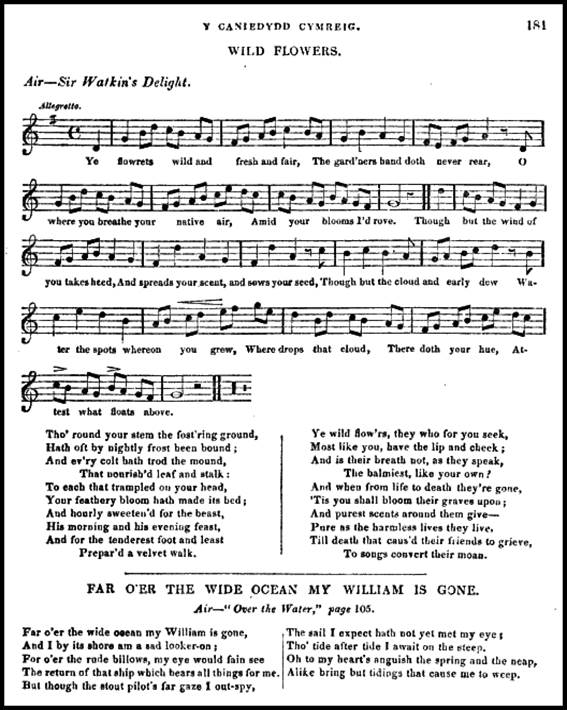
(delwedd J4431) (tudalen 181)
|
Y CANIEDYDD CYMREIG.
![[blocks in formation]](sion-prys_310_caniedydd_cymreig_1845_rhan-2_3597k_files/image329.jpg)
you takes heed, And spreads
your scent, and sows your seed, 'Though but the cloud and early dew
Wa.
![[ocr errors][merged small][merged small][merged small][merged small][merged small][merged small][merged small][merged small]](sion-prys_310_caniedydd_cymreig_1845_rhan-2_3597k_files/image331.jpg)
FAR O'ER THE
WIDE OCEAN MY WILLIAM IS GONE.
Air-�Over the Water,� page 105.
Far o'er the wide ocean my
William is gone, The sail I expect bath not yet met my eye ;
And I by its shore am a sad looker-on;
Tho' tide after tide 1 await
on the steep.
For o'er the rude billows, my eye would fain see Oh to my beart's anguish the
spring and the neap,
The return of that ship which bears all things for me. Alike bring but
tidiogs that cause me to weep.
But though the stout pilot's far gaze I out-spy,
FAR O'ER THE WIDE OCEAN MY WILLIAM
IS GONE.
Air-�Over the Water.
� page 105.
Far o'er the wide ocean my William is gone.
�The sail I expect hath not yet met my
eye;
And I by its shore am a sad looker-on;
�Tho' tide after tide 1 await on the
steep.
For o'er the rude billows.
�my eye would fain see Oh to my beart's
anguish the spring and the neap.
The return of that ship which bears all things for me.Alike bring but tidiogs
that cause me to weep.
But though the stout pilot's far gaze I out-spy.
�
|
|
�
|
|
|
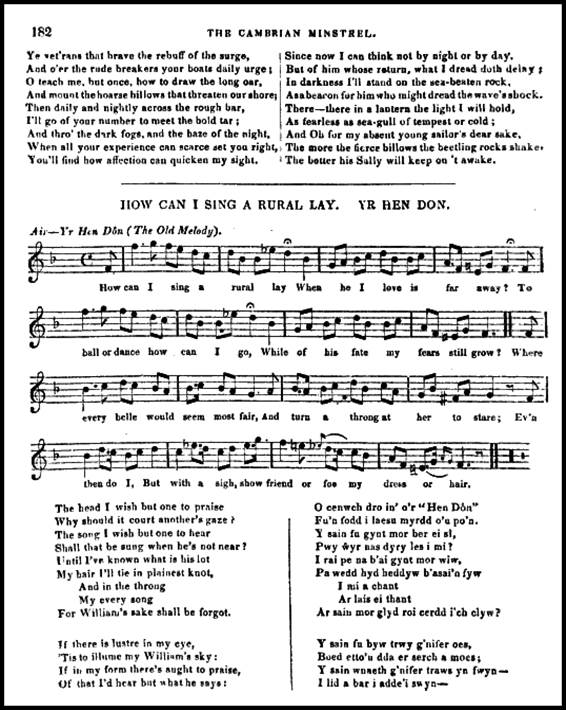
(delwedd J4432) (tudalen 182)
|
THE CAMBRIAN MINSTREL.
Ye vet'rans that brave the
rebuff of the surge, Since now I can think not by night or by day,
Avd o'er the rude breakers your boats daily urge; But of him whose return,
what I dread doth delay;
O teach me, but once, bow to draw the long oar, In darkness I'll stand on the
sea-beaten rock,
And mount the hoarse billows that threaten our shore; Asa beacon for him who
might dread the wave's shock.
Then daily and nightly across the rough bar, There-there in a lantern the
light I will hold,
I'll go of your number to meet the bold tar; As fearless as sea-gull of
tempest or cold ;
And thro' the dark fogs, and the baze of the night, And Oh for my absent
young sailor's dear sake,
When all your experience can scarce set you right, the more the fierce
billows the beetling rocks shake,
You'll find how affection can quicken my sight. The better his Sally will
keep on 't awake.
Ye vet'rans that brave the rebuff
of the surge.
�Since now I can think not by night or
by day.
Avd o'er the rude breakers your boats daily urge;
�But of him whose return.
�what I dread doth delay;
O teach me.
�but once.
�bow to draw the long oar.
�In darkness I'll stand on the
sea-beaten rock.
And mount the hoarse billows that threaten our shore;
�Asa beacon for him who might dread the
wave's shock.
Then daily and nightly across the rough har.
�There-there in a lantern the light I
will hold.
I'll go of your number to meet the bold tar;
�As fearless as sea-gull of tempest or
cold;
And thro' the dark fogs.
�and the haze of the night.
�And Oh for my absent young sailor's
dear sake.
When all your experience can scarce set you right.
�the more the fierce billows the
beetling rocks shake.
![[merged small][merged small][merged small][merged small][merged small][merged small][merged small][merged small][merged small][merged small][merged small][merged small][merged small][merged small][merged small][merged small][merged small][merged small][merged small][merged small][ocr errors][merged small][merged small][merged small][merged small][merged small][merged small][merged small][merged small][merged small][merged small]](sion-prys_310_caniedydd_cymreig_1845_rhan-2_3597k_files/image335.jpg)
|
|
�
|
|
|

(delwedd J4433) (tudalen 183)
|
Y CANIEDYDD CYMREIG. �
![[blocks in formation]](sion-prys_310_caniedydd_cymreig_1845_rhan-2_3597k_files/image339.jpg)
Air, � Difyrwch Gwyr Dyf.� The minstrels
of Cambria are happily met. In song we will wrestle, and songs shall yet
tell, And each in his primitive idiom and mode,
Who in his performance stood highest and best : Shall sing till bis
singing to rivalship whet,
But he that with insolence beareth the bell, In strains which old Tempus shall
never explode;
Will soon
his
countrymen's by-word and jest. In Cambria it ever shall be as of old,
If music to envy and insolence move; In village or city where miostrels
are met,
Then music, believe me, is music no more. Their strains on the heart have
so lasting a hold, The more we love singing, the more we should love
When comes it,
their parting is lasting regret. The singer or harper that hath an encore.
��
|
|
�
|
|
|
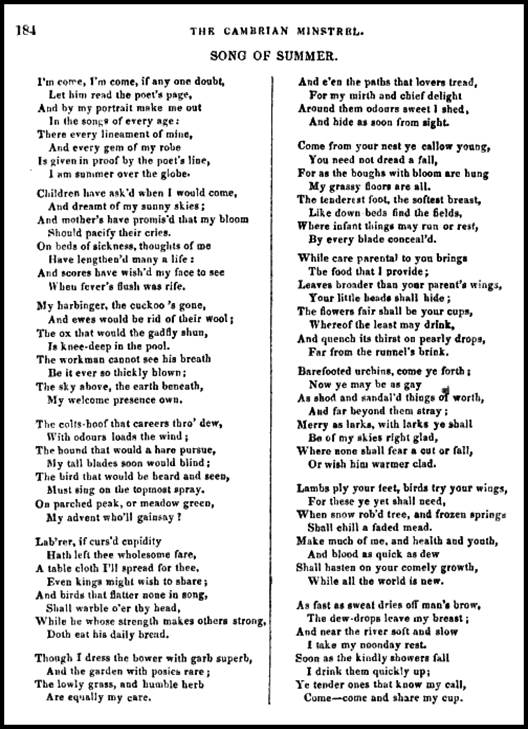
(delwedd J4434) (tudalen 184)
|
THE CAMBRIAN
MINSTREL.
SONG OF SUMMER.
And e'en the
paths that lovers tread,
For my mirth
and chief delight Around them odours sweet I shed,
And hide as
soon from sight.
l'in come, I'm
come, if any one doubt,
Let him read
the poet's page, And by my portrait make me out
In the songs of every age:
There every lineament of inine,
And every gem of my robe
Is given in proof by the poet's line,
I am sunimer over the globe.
Children liave ask'd when I would come,
And dreamt of my sunny skies
;
And mother's have promis'd that my bloom
Should pacify their cries.
On beds of sickness, thoughts of me
Have lengthen'd many a life
:
And scores have wish'd my face to see
Wheu fever's flush was rife.
My harbinger, the cuckoo 's gone,
And ewes would
be rid of their wool; The ox that would the gadily shun,
Is knee-deep in the pool.
The workman cannot see his breath
Be it ever so thickly blown;
The sky above, the earth beneath,
My welcome presence own.
Come from your
nest ye callow young,
You need not dread a fall,
For as the boughs with bloom are bung
My grassy floors are all.
The tenderest foot, the softest breast,
Like down-beds find the
fields,
Where infant things may run or rest,
By every blade conceal'd. While care parental to you brings
The food that I provide;
Leaves broader than your parent's wings,
Your little heads shall bide
;
The flowers fair shall be your cups,
Whereof the least may drink,
And quench its thirst on pearly drops,
Far from the runnel's brink,
Barefooted urchins, come ye forth;
Now ye may be as gay
As shod and sandal'd things of worth,
And far beyond them stray ;
Merry as larks, with larks ye shall
Be of my skjes right glad, Where none sball fear a cut or fall,
Or wish him warmer clad.
The colts -
hoof that careers thro' dew,
With odours loads the wind;
The hound that would a hare pursue,
My tall blades soon would
blind;
The bird that would be beard and seen,
Must sing on
the topmost spray. On parched peak, or meadow green,
My advent
who'll gainsay ?
Lambs ply your
feet, birds try your wings,
For these ye
yet shall need, When snow rob'd tree, and frozen springs
Shall chill a faded mead.
Make much of me, and health and youth,
And blood as quick as dew
Shall hasten on your comely growth,
While all the world is new.
Lab'rer, if
curs'd cupidity
Hath left thee
wholesome fare, A table cloth I'll spread for thee,
Even kings
might wish to share ; And birds that flatter none in song,
Shall warble
o'er thy head, While he wbose strength makes others strong,
Doth eat his
daily bread.
As fast as
sweat dries off man's brow,
The dew-drops leave iny
breast;
And near the river soft and slow
I take my noonday rest.
Soon as the kindly showers fall
I drink them quickly up;
Ye tender ones that know my call,
Come-come and share my cup.
SONG OF SUMMER.
And e'en the paths that lovers tread.
For my mirth and chief delight Around them odours sweet I shed.
And hide as soon from sight
l'in come.
�I'm come.
�if any one doubt.
Let him read the poet's page.
�And by my portrait make me out
In the songs of every age:
There every lineament of inine.
And every gem of my robe
Is given in proof by the poet's line.
I am sunimer over the globe.
Children liave ask'd when I would come.
And dreamt of my sunny skies;
And mother's have promis'd that my bloom
Should pacify their cries.
On beds of sickness.
�thoughts of me
Have lengthen'd many a life:
And scores have wish'd my face to see
Wheu fever's flush was rife.
My harbinger.
�the cuckoo 's gone.
And ewes would be rid of their wool;
�The ox that would the gadily shun.
Is knee-deep in the pool.
The workman cannot see his breath
Be it ever so thickly blown;
The sky above.
�the earth beneath.
My welcome presence own.
Come from your nest ye callow young.
You need not dread a fall.
For as the boughs with bloom are bung
My grassy floors are all.
The tenderest foot.
�the softest breast.
Like down-beds find the fields.
Where infant things may run or rest.
By every blade conceal'd.While care parental to you brings
The food that I provide;
Leaves broader than your parent's wings.
Your little heads shall bide;
The flowers fair shall be your cups.
Whereof the least may drink.
And quench its thirst on pearly drops.
Far from the runnel's brink.
Barefooted urchins.
�come ye forth;
Now ye may be as gay
As shod and sandal'd things of worth.And far beyond them stray;
Merry as larks.
�with larks ye shall
Be of my skjes right glad.
�Where none sball fear a cut or fall.
Or wish him warmer clad.
The colts - hoof that careers thro' dew.
With odours loads the wind;
The hound that would a hare pursue.
My tall blades soon would blind;
The bird that would be beard and seen.
Must sing on the topmost spray.On parched peak.
�or meadow green.
My advent who'll gainsay?
Lambs ply your feet.
�birds try your wings.
For these ye yet shall need.
�When snow rob'd tree.
�and frozen springsShall chill a faded
mead.
Make much of me.
�and health and youth.
And blood as quick as dew
Shall hasten on your comely growth.
While all the world is new.
Lab'rer.
�if curs'd cupidity
Hath left thee wholesome fare.
�A table cloth I'll spread for thee.
Even kings might wish to share;
�And birds that flatter none in song.
Shall warble o'er thy head.
�While he wbose strength makes others
strong.
Doth eat his daily bread.
As fast as sweat dries off man's brow.
The dew-drops leave iny breast;
And near the river soft and slowI take my noonday rest.
Soon as the kindly showers fall
I drink them quickly up;
Ye tender ones that know my call.
Come-come and share my cup.
Though I dress the bower with garb superb.
And ibe garden with posies rare;
�The lowly grass.
�and humble herb Are equally my care.
Where the bravest and strongest by thousands must.
�The breast I so often have wish'd
'twere between
|
|
�
|
|
|
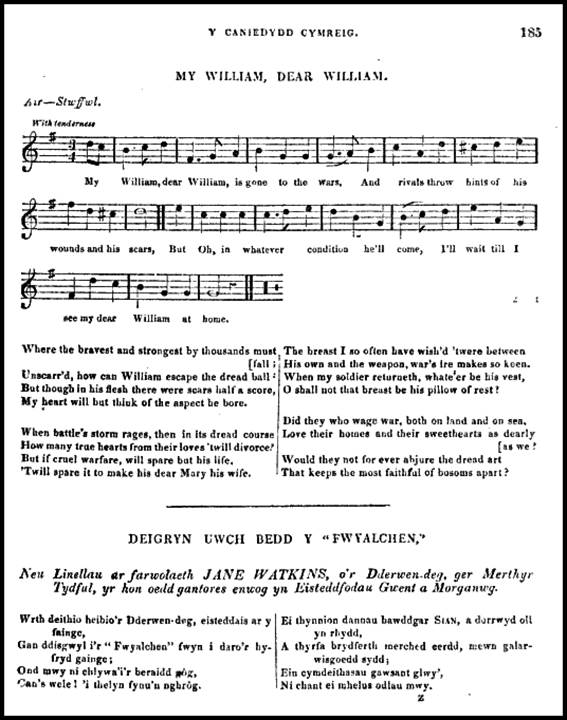
(delwedd J4435) (tudalen 185)
|
Y CANIEDYDD CYMREIG.� 185
Though I dress
the bower with garb superb,
And ibe garden
with posies rare ; The lowly grass, and humble herb Are equally my care.
![[blocks in formation]](sion-prys_310_caniedydd_cymreig_1845_rhan-2_3597k_files/image345.jpg)
Where the
bravest and strongest by thousands must, The breast I so often have wish'd
'twere between
[fall ; His own and the weapon, war�s ire makes so keen. Unscarrd, hou
can William escape the dread ball: When my soldier returneth, whate'er be his
vest, But though in his flesh there were scars half a score, O shall not that
breast be his pillow of rest? My heart will but think of the aspect he bore.
Did they who wage war, both on land and on sea, When battle's storm
rages, then in its dread course Love their homes and their sweethearts as
dearly How many true hearts from their loves 'twill divorce?
[as we? But if cruel warfare, will spare but his life, Would they not for
ever abjure the dread art 'Twill
spare it to make his dear
Mary his wife. That keeps the most faithful of bosoms apart?
DEIGRYN UWCH
BEDD Y �FWYALCHEN,"
Neu Linellau ar farwolaeth JANE WATKINS, o'r Dderwen-deg, ger Merthyr
Tydful, yr hon oedd gantores enwog yn Eisteddfodau Gwent a Morganwg.
Wrth deithio
heibio'r Dderwen-deg, eisteddais ar y Ei thyonion dannau hawddgar Sian, a
dorrwyd oll fainge,
yn rhydd, Gan
ddisgwyl i'r �Fwyalchen" fwyn i daro'r hy. A thyrfa brydferth merched
cerdd, mewn galarfryd gaingc;
wisgoedd sydds
Ond mwy ni chlywa'i'r beraidd g�g,
Ein cymdeithasau gawsant glwy', Can's wele! 'i thelyn fynu'n nghr�g.
Ni chant ei mhelus odlau mwy.
�
MY WILLIAM, DEAR WILLIAM.
a f �Stu:fag.
Will tease me
ISA
:AMC ..1�011r■■■
My William,dear William, Ls gone to
the wars, And rivals throw hints of his
wounds sad his scan, But Oh, is
whatever to slalom he'll come, I'll wail till I
sere my seas William at home.
Where the bravest and strongest by
thousands must (fall I'nwar'd, how an William eseape the dread hall But
though lo bis flesh there were scars half � score, My heart will but think of
the aspect he bore.
When battle's storm rages, then In
Its dread course How many true hearts from their loves 'twill divorce! Bat If
cruel warfare, will spare but his life. Twill spare it to make his dear Mary
his wife.
The breast I so often bare witted
'mere between His on and the weapon, war's ire makes so keen. W'ben my
soldier ninetieth, whatever be his veal, 0 shall not that breast be his
pillow of rest
Did they who wage war, both on land
and on see, Lore their homes and their sweetheart' as dearly (ea we! Would
they not for ever abjure the dread art I That keeps the most faithful of
bosoms apart?
DEICRYN
UWCII DEDD Y "FWVALCDEN,'�
Neu
Linellatt arfarteoletellt JANE WATKINS, o'r Dderwen-dey. ger Merthyr Tydfil?,
yr hon oedd gan torts entcog ym Eisteddfollatt Gwent a Moronity.
With
deithio heibio'r Dderwen�cleg, eisleddaia ar y Adage, Can ddlsgwyl i'r
Fwyalchen" fwyn i dare's hy-fryd goings; Ond mwy ni ehlywairr beraidd
Can's welt I 1 thelyn fyritthr
Ei
thynnion dannau bawddgar SRN, � dorrwyd oil yn rhydd, A thy rim br)dferth
merched eerdd, men galar-wisgoedd syddi Ein cyrodeitlassu gawsant glwy', NI
chant ei tohelus adieu mwy. [fall;
�His own and the weapon.
�war�s ire makes so keen.Unscarrd.
�hou can William escape the dread hall:
�When my soldier returneth.
�whate'er be his vest.
�But though in his flesh there were
scars half a score.
�O shall not that breast be his pillow
of rest?
�My heart will but think of the aspect
he bore.
Did they who wage war.
�both on land and on sea.
�When hattle's storm rages.
�then in its dread course Love their
homes and their sweethearts as dearly How many true hearts from their loves
'twill divorce?
[as we?
�But if cruel warfare.
�will spare but his life.
�Would they not for ever abjure the
dread art 'Twill
spare it to make his dear Mary his wife.That keeps the most faithful of
bosoms apart?
185 DEIGRYN UWCH BEDD Y �FWYALCHEN.
"
Neu Linellau ar farwolaeth JANE WATKINS.
�o'r Dderwen-deg.
�ger Merthyr
Tydful.
�yr hon oedd gantores enwog yn
Eisteddfodau Gwent a Morganwg.
Wrth deithio heibio'r Dderwen-deg.
�eisteddais ar y Ei thyonion dannau
hawddgar Sian.
�a dorrwyd oll fainge.
yn rhydd.
�Gan ddisgwyl i'r �Fwyalchen" fwyn
i daro'r hy.A thyrfa brydferth merched cerdd.
�mewn galarfryd gaingc;
wisgoedd sydds Ond mwy ni chlywa'i'r beraidd g�g.
Ein cymdeithasau gawsant glwy'.
�Can's wele!
�'i thelyn fynu'n nghr�g.
Ni chant ei mhelus odlau mwy.
Llynlleifiad draw.
�na'r Fenni lon.
�ni chlywant mwy Ust!
�braidd na chlywa'r nefoliu.
�ei nod.
|
|
�
|
|
|

(delwedd J4436) (tudalen 186)
|
THE CAMBRIAN
MINSTREL.
Llynlleifiad
draw, na'r Fenni lon, ni chlywant mwy Ust! braidd na chlywa'r nefoliu, ei
nod,
Yn ceisio ei chainge, ar �Ryddid"'* gu. Na chymdeithasau Merthyr,
chwaith, lle haeddodd gymmaint clod.
Mae's �Ddryw,� a �Morfydd,"etto�nol, a'r �Eos," Ow! gorwedd
mae, yn welw ei gwedd,
glir ei sain,
A�n dagrau dreiglant ar ei bedd.
Ond ni chawo alaw'r �Fwyalch� ber, yn un a'r
tannau main,
Mor felus, cainpus oedd ei cherdd, yn canmol cread Ehedodd, do, i'w haddef
draw, Ior,
A'i thclyn yno fyth ni thaw. A chywrain waith ei fysedd Ef, mewn awyr,
tir, a
J. Rees a'i c�nt.
![[blocks in formation]](sion-prys_310_caniedydd_cymreig_1845_rhan-2_3597k_files/image349.jpg)
Yea, tho� he's buried, O
soon by yon stream Of all the white lambkins that graze thro'yon bourn,
He'll come yet to meet her, and not in a dream ; How faithful her care, till
her Robin's return;
His voice and his pipe she doth answer and bear, And his old sheep-dog she
leads in a string
Then how must her shepherd himself not be near? To hear what she mutters, and
list to her sing.
Pipes she hath
made her of sycamore tree, The pipe of her Robin is slung by her side, And on
them she plays of his tunes two or three ; And not till he cometh to make her
bis bride, She says, when he meets her by Sawdde�s low shore, Shall any one
play her a tune on that pipe, Her shepherd for kindness will teach her three
more. Or come in his absence her salt tears to wipe.
Yn ceisio ei chainge.
�ar �Ryddid"'* gu.Na chymdeithasau
Merthyr.
�chwaith.
�lle haeddodd gymmaint clod.
Mae's �Ddryw.
� a �Morfydd.
"etto�nol.
�a'r �Eos.
" Ow!
�gorwedd mae.
�yn welw ei gwedd.
glir ei sain.
�A�n dagrau dreiglant ar ei bedd.
Ond ni chawo alaw'r �Fwyalch� ber.
�yn un a'r
tannau main.
�Mor felus.
�cainpus oedd ei cherdd.
�yn canmol cread Ehedodd.
�do.
�i'w haddef draw.
�Ior.
A'i thclyn yno fyth ni thaw.A chywrain waith ei fysedd Ef.
�mewn awyr.
�tir.
�a
J.Rees a'i c�nt.
Yea.
�tho� he's buried.
�O soon by yon stream Of all the white
lambkins that graze thro'yon bourn.
He'll come yet to meet her.
�and not in a dream;
�How faithful her care.
�till her Robin's return;
His voice and his pipe she doth answer and bear.
�And his old sheep-dog she leads in a
string
Then how must her shepherd himself not be near?
�To hear what she mutters.
�and list to her sing.
Pipes she hath made her of sycamore tree.
�The pipe of her Robin is slung by her
side.
�And on them she plays of his tunes two
or three;
�And not till he cometh to make her bis
bride.
�She says.
�when he meets her by Sawdde�s low shore.
�Shall any one play her a tune on that
pipe.
�Her shepherd for kindness will teach
her three more.Or come in his absence her salt tears to wipe.
|
|
�
|
|
|

(delwedd J4437) (tudalen 187)
|
Y CANIEDYDD CYMREIG.
SYR OWEN.
Air-Plygiaid y Bedol Fach.
�( The Bend of the little Horse Shoe).
MEIB Y WEN YNYS.
Cyfieithiad.Meib y Wen Ynys.
�ai'n angof a'r dydd
Er i'r uchelsraint i'madael a'n gwlad.
�Y rhodiem mewn haelder.
�a�n teyrnas yn rhydd?
�Yn Mhrydain ein henwau y�nt fyth o
harhad;
�Oll wel�i�r eryr o'i wybrendaith fry
A'r goron.
�pwy bynag a'i gwisgo ar ben.
�Oedd eiddom.
�o'r hannau i lasdon y lli'.
Ei bri fydd i feibion yr hen Ynys Won.
SYR OWEN.
Air-Plygiaid y Bedol Fach, ( The Bend of the little Horse Shoe).
![[merged small][ocr errors][merged small][merged small][merged small][merged small][ocr errors][merged small][merged small][merged small][merged small][merged small][merged small][merged small][merged small][merged small][merged small][merged small][merged small][merged small][merged small][merged small][merged small][merged small][merged small][merged small][merged small][merged small][merged small][merged small][merged small][merged small][merged small][merged small][merged small]](sion-prys_310_caniedydd_cymreig_1845_rhan-2_3597k_files/image353.jpg)
MEIB Y WEN YNYS.
Cyfieithiad. Meib y Wen Ynys, ai'n angof
a'r dydd
Er i'r uchelsraint i'madael a'n gwlad, Y rhodiem mewn haelder, a�n
teyrnas yn rhydd ? Yn Mhrydain ein henwau y�nt fyth o barhad; Oll wel�i�r
eryr o'i wybrendaith fry
A'r goron, pwy bynag a'i gwisgo ar ben, Oedd eiddom, o'r bannau i lasdon
y lli'.
Ei bri fydd i feibion yr hen Ynys Won.
�
|
|
�
|
|
|

(delwedd J4438) (tudalen 188)
|
�
THE CAMBRIAN MINSTREL.
![[merged small][merged small][merged small][merged small][merged small][merged small][merged small][merged small][merged small][merged small][merged small][merged small][merged small][merged small][merged small][merged small][merged small][merged small][merged small][merged small][merged small][merged small][ocr errors][merged small][merged small][merged small][merged small][merged small][merged small][merged small][merged small]](sion-prys_310_caniedydd_cymreig_1845_rhan-2_3597k_files/image357.jpg)
�
|
|
�
|
|
|

(delwedd J4439) (tudalen 189)
|
Y CANIEDYDD CYMREIG.
![[blocks in formation]](sion-prys_310_caniedydd_cymreig_1845_rhan-2_3597k_files/image360.jpg)
�
CANIEDVDD CYMRE117. BLUE DEVILS. Y
GOFID GUM Air�Yr lien Oft! Gins. 189 air is.tramreopw'lma
Vtaltst=1:="saaa= Nang' 11= w==.- i �
I'm a disease of high deem; Bin
Devils I am aura See saw, see The chambers that en runstra me Are fear and
many�wali'd,
rm savamisimilr 4■" 'Malaita a 1=2.fl ■iww =Nom= 1`*� Tana arniliflaw an awe
a■moo of a� tr saw, (Albedo of state my breath I draw,
Doctors, too,of lure imniense Ladies bridal0f
SIMI wis�Iw es. .?� al nlaralria
ONOor 4 a 4, Merl= aunts Intense WWI rin NS �Pint in nakaad polish'd sense My
nurses are by law.
The poor upon his pitted hearth,
Tho' many see his woes; Of me, or that which gives me birth, But little
thinks or knows. See saw, see saw, What gay ones love to feed my maw !
Royalty, and squirearchy Daily Dunes 6nd for me; Then among the rich to be,
My right I'll prove by law. The common griefs may boast some paver; Yet, yet
the leech that draws With keenest gust thro' every boor, Is grief without a
cause ; See Saw, see saw, While he that eats well, plies his jaw ; Who like
me, will come In need, His almost bunting vein to bleed ? As he 's fed, I too
shall feed Oa flesh that suits my maw!
Mae rhyw beth hynod yn y byd, A
d'wedir ye ddilai Mae rind e'i giant yn el gryd, Sy' 'anthem el gosau ; Hwi
hwi. hwi hwi, Mi go' Thai mwyaf yn y plwr�Mwyn'u dyer, a mwyers ds, A'r
rhianod leg a bra'� Pob on mawr er mwyn el his, gm maga rot gwneud yn fwy.
If timed vent fwbaeh o bob coed,
Peth rhyfedd lawn onitte, Nn Ihybiodd fod fy math erioed Yn Ilechtt'n unrhyw
le t Ilwi bwi, haul Inri. Pwy lady chlaw I tidal fy Hwy. O'r lethal feint
Iawr i'r gwis, 0 d'wedwch hie mae caerog bias, Lle nes Mort bwyd goad glee
Bob dydd i'w wneyd yn fry.!
THE OLD CRAB TREE.
Say who with me will not agree A
song from all Is der, Hato the knotty old orab tree That near the cons yard
grew
Of all things that abuse survive,
And good return for evil. My praise to this I'll soonest give As the most
meek and civil.
|
|
�
|
|
|
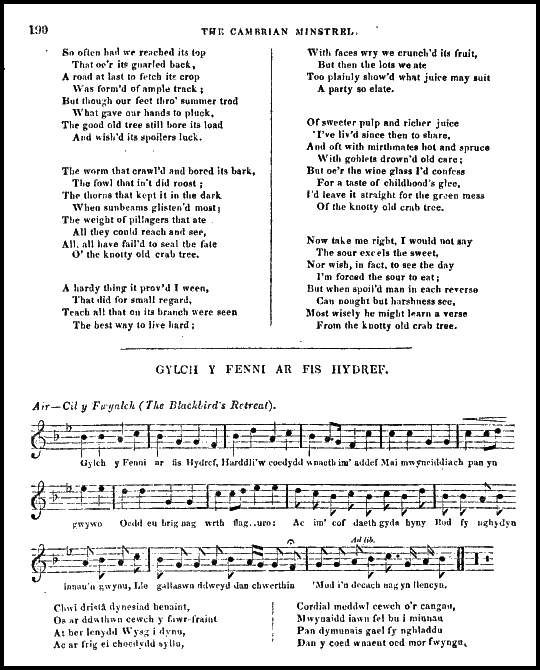
(delwedd J4440) (tudalen 190)
|
THE CAMBRIAN MINSTREL.
![[blocks in formation]](sion-prys_310_caniedydd_cymreig_1845_rhan-2_3597k_files/image363.jpg)
Gylch y Fenni ar fis Hydref, Harddli'w
coedydd wnaeth im' addef Mai mwyneiddiach pan yn
![[blocks in formation]](sion-prys_310_caniedydd_cymreig_1845_rhan-2_3597k_files/image365.jpg)
1.90 Veit CAMBRIAN MINSTRRL.
So often had we reached its top
That oe'r its gnarled back, A road at last to fetch its crop Was form'd of
ample track ; But Matta our feet three summer trod What gave our hands to
pluck, The good old tree still bore its load And its spoiler, luck.
The worm that crawl'd and bored its
bark, The fowl that IA did roost ; The thorns that kept it in the dark When
sunbeams glisten'd most; The weight of pillagers that ate . All they could
reach and see, All, all have laird to seal the fate 0' the knotty old crab tree.
A hardy thing it prov'd I wen, That
did for small regard, Teach all that on its branch were seen The best way to
lire hard ;
With faces wry we trended its
fruit, But then the lots west< Too plainly show'd what juice may suit A
party so elate.
Of sweeter pulp and richer juice
'I've liv'd since then to share. And oh with rnirthmata hot and spruce With
goblets drown'd old awe; But oe'r the wine glass I'd confess For a taste of
childhood's glee, I'd leave it straight (or the green tutu Of the knotty old
crab tree.
Now tale me right, I would net say
The sour excels the sweet, Nor wish, in fact, to see the day I'm forced the
sour to tat ; End when spoii'd man in each reverse Can nought bat harshness
see. Most wisely he might learn � verse From the knotty old crab tree.
GYLCII It FENNI AR FIB HYDREF.
A y Polak& (The Ittatletirts
Retreat).
uylch y Fenni sr its Ilydrcf,
liarddIrw comlydd unaoth addef Mai moynriddiaclo pea ye
� SEM MI ■��=a■g wumir.;age =S Ni/nEirm■ai.s��� re
reerso Ueda mg brig nag writ,
lag..ure: Ac col daeth ads byuy Itud ry ughidge Al lib. Innate� Anion, Lie
gelleswo ddweyd dm chwerthia 'Mud ro detach tug ye Remo.
awl dried dynesiml be:taint, Os ow
ddnihlen etude y fawr�fmhtt At her leaphl Wysiz i dyne, Ao ar frig el
ebeellpit1 ayllo,
Cordial meddwl eewch or caugan,
wynaidd lawn fel bar I minima Pan dymunais geel fy oghladdu y coed %vaunt ocd
mor fwyngo,
|
|
�
|
|
|
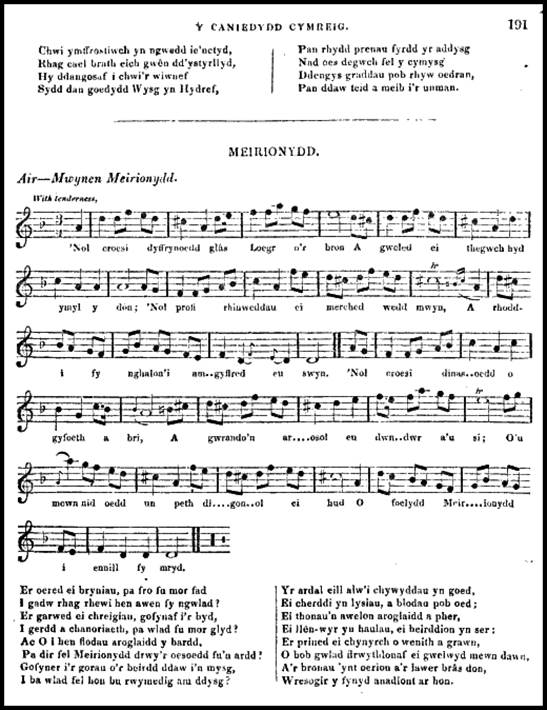
(delwedd J4441) (tudalen 191)
|
�Y CANIEDYDD CYMREIG.�� 191
![[merged small][merged small][merged small][merged small][merged small][ocr errors][ocr errors][merged small][merged small][merged small][merged small][merged small][merged small][merged small][merged small][merged small][merged small][merged small][merged small][merged small][merged small][merged small][merged small][merged small][merged small][merged small][merged small][merged small][merged small][merged small][merged small][merged small][merged small][merged small][merged small][merged small][merged small][merged small][merged small][merged small][merged small][merged small][merged small][merged small][ocr errors][merged small][merged small][merged small][merged small][merged small][merged small][merged small][merged small][merged small][merged small]](sion-prys_310_caniedydd_cymreig_1845_rhan-2_3597k_files/image369.jpg)
Ghwi ymtTromineh yn orterld
ie'oelyd, Rhag enel broth etch goon dd'yetyrilyd, fly ddangoea( i chwi'r
wine( Sydd don goedydd Wyeg yn Hydra,
Pan rhydd prenan tot yr adapt Ned
roes depict. fel y oymysg Moneys grub's� pob rhyw oedran, Pao ddaw teal a
melt; i'r unman.
MEIRIONYDD.
Air� ihoynert Afeirionya. Ira&
tadoniato, .21 .041trg_ mril-111--"�r ei dwgweb byd r is" gwelad
�fter 'Nol Iwo& dyirrpordd glft Lay tn. brim A
ymyl 7
dim; 'Nol won
rhinweddau
ei
marched
wolla mom A Mudd-
1 fy ogludon'i am..gyared eu ann.
'Not rani
dinos..oedd
o
gwrandren
at. 00601 en dwondter lea el; O'u
mown aid oedd ao petit di.
..goa..ol
1 nu ll fy mryd. � Er oared el
bryniau, pa fro fa toot fad 1 garlic ring rhowi hen awen fy ngwlM? Er garwed
ei ehreiglau, goring i'r byd, I gerdd � ehanoriaetb, pa wind mor glyd? Ao 0 1
ben flodan aroglaidd y bardd, Pa dir Meirionydd drwy'r orsoedd hen odd!
Gofyner i'r gomo o'r buildd ddaw i'n mpg, 1 ba Cad fel Lou bu separdig an
chips?
ei bud 0 foelyddMn i ... danydd
Yr tidal till alw'i ellywyddatt yn
goed, Bi eherddi yn lyslao, a blodao pob oed ; El thonaten anion aroglaidd n
pher, El llen.wyr yu deafen, ei beirddion yn ter: Er pined ei ebynyrelt o
wealth a grown, 0 bob gwiad drwyd�lonaf ei gwciwyd morn dawn, A'r bronau 'ynt
oetion et hater brae don, Wrestler y fynyd andlool ar bon.
|
|
�
|
|
|

(delwedd J4442) (tudalen 192)
|
�
�
192 THE CAMBRIAN MINSTREL.
TIM CAMBRIAN MINSTREL.
Ti tom yr afonytld enwnraf-0 mwy ; Cynhelled
a thydiont MO Unfree at Wy t Aril dimmed dy ,wen, a pher sain dy dant, Nes
sonic am Feirion ar hob twyn a phant ;
A'r dysg %teeth twee oeseedd ei
Anent a'i uyth Mewn Frwlad Ile mae'rcorwynt yn nem( ei cloy yth In mhob man
uttered Ile sugnodd y Meth Fu natal ddyddiatei fabandod yn tooth.
CLYCH PRESTYal.
Air--Pressych Belk Dow.
Drig..01..lon lien Siluria, Ar
e:welch bodd mi rynga, � Aso; in fydd dyst mat I R .411-10 fr-,.... gureteeh
cold Ilea wyrthiatech Teid I gofa. 0 Wyss I Oaf Fel raw! haf
� is-101�r -r-t- or�Ithybydd uid
rby araf red,
Rhowch l'a rho'
dy Inter geed. Y ffrytlisto gynt
o'eni ;Fashion Can weed galanas gimlet); Wm Mewed tystinnt clan y gwjdd 'hi
adawiaddy dd peryglon; A niwl y glyn Fo eye hya Yu hug i'r gelyn ddaliai gds.
Deno 'never 000)g bar, Bad ya gocIplant ui %Ina glee.
flydd lawn, wlad y drlyn Nid on it
beddyw elytt ; kr torn gynllwynai gynt er brow Ni ebylyd law rth erbyn. Fel
dwylaw deg, Cerddor thweg
*yl..ddydd mad,
Brawl o
plead
01 dant eurdeg d'rawont dia. Cymro
a Sail O'r an gals, Cwrdd mean ymgala proant dn.
Er mawredd, hen Silatrie, Mown gwiadgerdd na ddifygle; Pan alwo Cymru
'ughyd ei phlast 11'w denteth dant hoed dyuna ; Ac ye lte r cledd Rwygai'n
bedd, � Oloewedd late gwiriooedd gwyn liwcb pob bro 'N ysgwyd Ilyd oni
feiddlet da betb Fyn.
�
�![[blocks in formation]](sion-prys_310_caniedydd_cymreig_1845_rhan-2_3597k_files/image373.jpg)
�
|
|
�
|
|
|
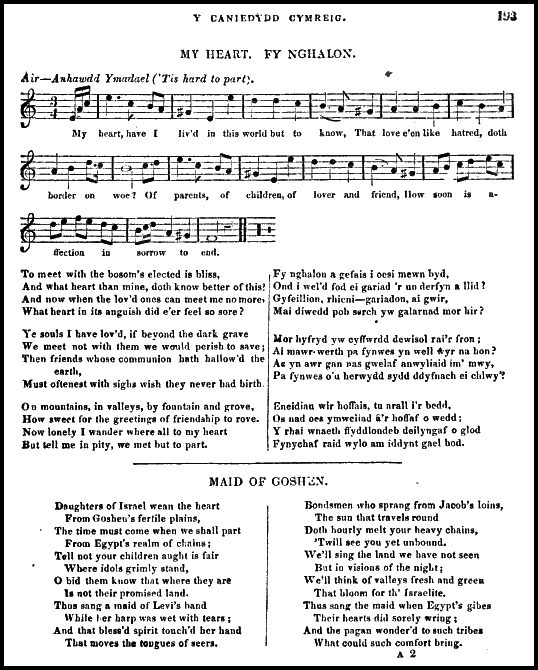
(delwedd J4443) (tudalen 193)
|
�Y CANIEDYDD CYMREIG.
![[merged small][merged small][ocr errors][merged small][merged small][merged small][merged small][merged small][merged small][merged small][merged small][merged small][merged small][merged small][merged small][merged small][merged small][merged small]](sion-prys_310_caniedydd_cymreig_1845_rhan-2_3597k_files/image376.jpg)
To meet with
the bosom's elected is bliss,
Fy nghalon a
gefais i oesi mewn byd, And what heart than mine, doth know better of this?
Ond i weld fod ci gariad 'r un derfyn a llid ? And now when the lov'd ones
can meet me no more, Gyfeillion, rhieni-gariadon, ai gwir, What heart in its
anguish did e'er feel so sore? Mai diwedd pob sorch yw galarnad mor hir?
earth,
Ye souls I have lov�d, if
beyond the dark grave
We meet not with them we would perish to save; Ai mawr.werth pa fynwes yn
well #yr na hon?
Mor hyfryd yw cyffwrdd dewisol rai'r fron ; Then friends whose communion
hath ballow'd the Ac yn awr gan nas gwelaf anwyliaid im' mwy,
Pa fynwes o'u herwydd sydd ddyfnach ei chlwy? Must oftenest with sighs
wish they never had birth, On mountains, in valleys, by fountain and grove,
Eneidiau wir hoffais, tu arall i'r bedd, How sweet for the greetings of
friendship to rove. Os nad oes ymweliad �'r hofsaf o wedd; Now lonely I
wander where all to my heart Y rhai wnaeth ffyddlondeb deilyngaf o glod But
tell me ia pity, we met but to part.
Fynychaf raid wylo am iddynt gael bod.
![[merged small][ocr errors][merged small][merged small]](sion-prys_310_caniedydd_cymreig_1845_rhan-2_3597k_files/image378.jpg)
CANIETWDD CYMREIC.
MY HEART. FY NGILA LON. A
ir�AnAawd4 Ymerrlael (*Zs hard to Pari,s
alp
heart, have I
lir d in this world but
193
� ^t to know, That lore e'en like
hatred, dolt
border en
Of
parent:, of children, of
I I deafen io sorrow to cad.
To meet with the bosom's elected is
bliss, And what heart than mine, doth know better of this! And now when the
loved ones can meet me no more. What heart io its anguish did e'er feel so
sore? Ye souls I have lov'el, if beyond the dark grave We meet not with them
we would perish to save; Then friends whom communion bath Wove.' the earth,
Must *Retest with sighs wish they never had birth. On mountains, in valleys,
by fountain and grove, How sweet for the greetings of friendship to rove. Now
lonely I wander where all to my heart But tell me In pity, we met but to
part.
lover
and
friend, !low
soon is a.
Fy ngltalon a gefais i oesi mewn
hyd, Ond i werd fod el garble 'r on asap) � IIM? Gyfeillion. rhicni�gariadon.
Ai gwir, Mai diwedd pot) serch yw galarned mar lair?
Mtn hyfryd yw cyffwrdd dewisol
rai'r (roe Al mawr�werth pa &owes yn well *yr na lion? As yn awe gun nas
gwelaf anwyliaid im' ary, Pa (yawn o'st been Ltd sydd ddyfnach ei chlwyt
Eneidinu wlr haffais, to nrall i'r
bed.), Os nad on yrnweitad haat o wedd; Y Thai wnaeth flyddlondeb deilynguf o
glad Fynycbat raid wylo am iddynt gaol hod.
MAID OF GOSII2N.
Daughters of Israel wean the heart
Prom Goshen's fertile plains, The time must come when we shall part From
Egypt's realm of chains; Tell not your children aught is fair Where idols
grimly stand, 0 bid them know that where they an Is not their promised land.
Thus sang a maid of Levi's hand While l et harp was wet with tears; And that
blued spirit touched bee band That moves the tongues of seers.
Bondsmen who sprang from Jacob's
loins, The sun that travels round Troth hourly melt your heavy chains, 'Twill
see you yet unbound. We'll sing the land we have not seen But in visions of
the night We'll think of valleys fresh and greet That bloom for th Israelite.
Thus sang the maid when Egypt's gibes Their hearts did sorely wring; And the
pagan wondeed to such tribes What could such comfort bring. A 2
|
|
�
|
|
|
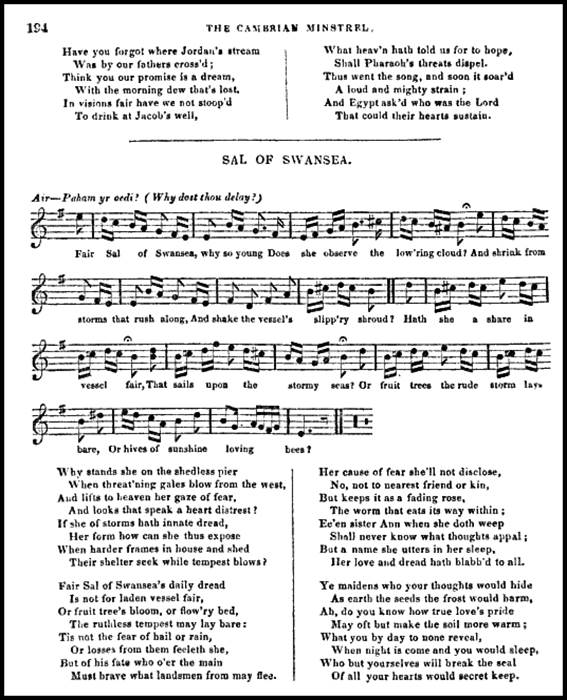
(delwedd J4444) (tudalen 194)
|
�
THE CAMBRIAN MINSTREL.
![[merged small][merged small][merged small][merged small][merged small][ocr errors][ocr errors][merged small][merged small][merged small][merged small][merged small][merged small][merged small][merged small][merged small][merged small][merged small][merged small][merged small][merged small][merged small][merged small][merged small][merged small][merged small][merged small][merged small]](sion-prys_310_caniedydd_cymreig_1845_rhan-2_3597k_files/image382.jpg)
�
�1V4 THE CAMItRIAY alINSTRKL.
Hart you forgot when Jordan's
stream Was by our fathers nosed; Think you our promise Is a dream, With the morning
dew Oates lost. In visions fair have we not moop'd To drink at Jacob's well,
What heav'n bath told us for to
hops, Shall Pharaoh's threats dispel. Thus went the song, and soon it potted
A loud and mighty strain ; And Egypt titled who was the Lord That could their
hearts sustain.
SAL OF SWANSEA.
A tr�Pahetm yr ote/i? ( Why dose
thou delay?)
Pal Sal of Swansea, why so young
Does she observe the lettering cloud? And shrink from
storms that rush along, And shake
the vessel's slIpp'ry shroud? Beth she �
share
in
vessel fili4nall Still upon the
stormy seas? Or fruit trees the
rude steno lap.
-4r 40+1.� .4 If bare, Or hives of
sunshine loving bent Why stands she on the shales, pier When threaening gales
blow from the west, And lifts to heaven her pre of fear, And looks that speak
a heart distrest I If she of storms bath innate dread, Her form how can she
thus expose When battler frames in house and shed Their shelter seek while
tempest blows? Fair Sal of Swansea's daily dread Is not for laden vessel
fair, Or fruit tree's bloom, or flow'ry bed, Tie ruthless tempest may lay
bare: Tis not the fear of hail or rain, Or losses from them feeleth she, Rut
of his fate who o'er the main Must brave what landsmen from may gee.
Her Pun of fear she'll not
disclose, No, not to nearest friend or kin, But keeps it as a fading rose,
The worm that Vail its way within ; Ec'en sister Ann when she doth weep Shall
never know what thoughts appal; But a name she utters in her sleep. Iler love
and dread bath blabb'd to alL Ye maidens who your thoughts would hide As
earth the seeds the frost would harm, Ab, do you know how true love. pride
May oft but make the soil more warm; What you by day to none reveal, When
night is come and you would sleep, Who but yourselves will break the seal Of
all your hearts would secret keep.
|
|
�
|
|
|
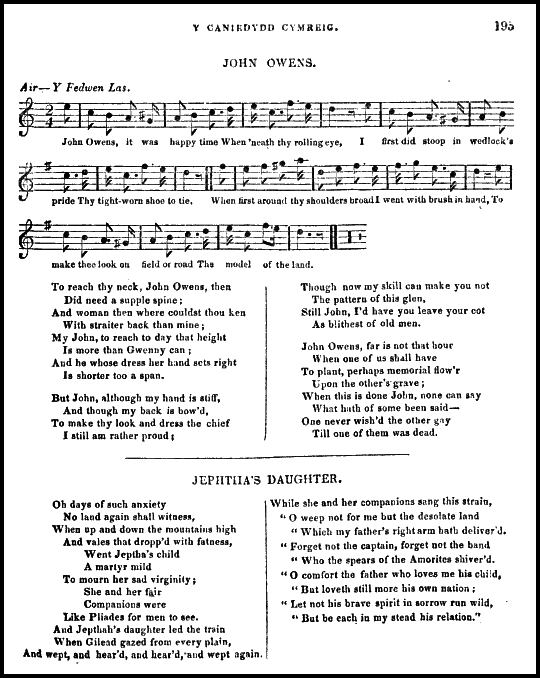
(delwedd J4445) (tudalen 195)
|
���������������
Y CANIEDYDD CYMREIG.
![[blocks in formation]](sion-prys_310_caniedydd_cymreig_1845_rhan-2_3597k_files/image385.jpg)
Oh days of such anxiety
While she and her companions, sang this strain,
No land again shall witness,
�O weep not for me but the desolate land
When up and down the mountains high
� Which my father's right arm bath deliver'd.
And vales that dropp'd with fatness,
�Forget not the captain, forget not the band Went Jeptha's cbild A martyr
mild
�Who the spears of the Amorites shiver'd.
To mourn her sad virginity;
�O comfort the father who loves me his child,
She and her fair
� But loveth still more his own nation ; Companions were
� Let not his brave spirit in sorrow run wild, Like Pliades for men to
see.
�
���������
V VASilliDVDD CVNIRlitC�
JOHN OWENS.
Aar-17 Fedwen Las.
John Owens, It was happy time When
'nth thy rollingeye, I Ors' did stoop in wedlock' 11.fl..itt
otrni:r17.41A�Jirt,_ .!4.2i,..b.E.� fa "-Li 4111--1, 1 --I� del
4.-_--c-f----`- i..-a-c_z__-12_ _:__t_. -1 +� te.. e pride Thy tight.worn
shoo to tie, Whe tint around thy, �olden broadl went with brush in and, To
make thee look on kid cc toed The
model
To reach thy neck, John Owens, then
Did need � supple spine; And woman then whore couldat thou ken With waiter
back than mine; My John, to reach to day that height Is more than Cwenny can
; And he whose dress her band sets right Is shorter too � span. But John,
although my hand is slid; And though my back is Laid, To make thy look and
dress the chief I still am rather proud
of the land.
Though now my skill can make you
not The pattern of this glen, Still John, I'd dace you leave your cot As
blithest of old men.
John Owens, far is not that hour
When one of us shall bar To plant, perhaps memorial /lover Upon the other's
grave ; When this is done John, none otn say What bath of some been said�One
never wish'd the other gay Till cue of them was dead.
JERI1THA'S DAUGHTER.
Oh days of such anxiety No land
again shall witness, When op and down the mountains high And vales that
dropp'd with fatness, Went Jeptba's child A martyr mild To mourn her sad
virginity; She and her fair Companions were Like Plied.s for men to re. And
Jepthab's daughter led the train When Gilead gazed from every pistil, And
wept, and booed, and hesedould wept again.
While she and her companions sang
this strain, "O weep not for me but the desolate land " Which my
father's right arm bath delieeed. " Forget not the captain, forget not
the band "Who the spears of the Amerika ablated. "O comfort the
father who loves me his child, " But loveth still more his own nation
" Let not his brave spirit in sorrow ran wild, " But be each in my
stead his relation."
�O weep
not for me but the desolate land When up and down the mountains high
� Which my father's right arm hath deliver'd.And vales that dropp'd with
fatness.
�Forget not the captain.
�forget not the hand Went Jeptha's
cbild A martyr mild
�Who the spears of the Amorites shiver'd.To mourn her sad virginity;
�O comfort the father who loves me his child.
�She and her fair
� But loveth still more his own nation;
�Companions were
� Let not his brave spirit in sorrow run wild.
�Like Pliades for men to see.� But be
each in my stead his relation.
�
And Jepthah's daughter led the trainWhen Gilead gazed from every plain.
And wept.
�and hear'd.
�and hear'd.
�and wept again.
|
|
�
|
|
|
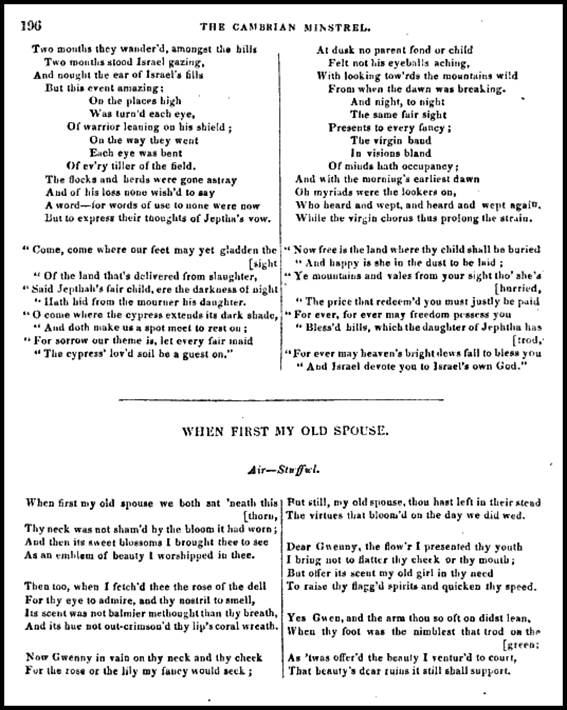
(delwedd J4446) (tudalen 196)
|
�THE CAMBRIAN MINSTREL.
Two
months they wander'd.
�amongst the hills
Two monthis stood Israel gazing.
�And nought the ear of Israel's fills
But this event amazing;
On the places bighWas turn'd each eye.
Of warrior leaning on his shield;
On the way they went
xxxx
�Each eye was
bent Of ev'ry tiller of the field.
The flocks and berds were gone astray
And of his loss none wish'd to sayA word-sor words of use to none were now
But to express their thoughts of Jeptha's vow.
At dusk no parent fond or childFelt not bis eyeballs aching.
With looking tow'rds the mountains wildFrom when the dawn was breaking.
And night.
�to nightThe same fair sight
Presents to every fancy;
The virgin hand
Tu visions bland of minds hath occupancy;
And with the morning's earliest dawn
Oh myriads were the lookers on.
Who heard and wept.
�and heard and wept again.
While the virgin chorus thus prolong the strain.
Come.
�come where our feet may yet gladden
the "Now free is the land where thy child shall be buried [sight � And
happy is she in the dust to be laid;
��Of the land that's delivered from
slaughter.
�Ye mountains and vales from your sight
tho'she's " Said Jepthah's fair cbild.
�ere the darkness of night
[hurried.
�� Hath bid from the mourner his
daughter.� The price that redeem'd you must justly be paid "O come where
the cypress extends its dark shade.
��For ever.
�for ever may freedom pr'ssess you
� Aud doth make us a spot meet to rest on;
�� Bless'd bills.
�which the daughter of Jephtha has �
For sorrow our theme is.
�let every fair maid
[trod.
�� The cypress' lov'd soil be a guest
on.
�
�For ever may heaven's bright dews fall to bless you
" And Israel devote you to Israel's own God.
� But be each in my stead
his relation,�
And Jepthah's daughter led the train
When Gilead gazed from every
plain,
And wept, and hear'd, and hear'd, and wept again.
Two months
they wander'd, amongst the hills
Two monthis
stood Israel gazing, And nought the ear of Israel's fills But this event
amazing;
On the places bigh
Was turn'd each eye,
Of warrior leaning on his shield ;
On the way they went
Each eye was bent
Of ev'ry tiller of the field.
The flocks and berds were gone astray
And of his loss none wish'd to say
A word-sor words of use to none were now
But to express their thoughts of Jeptha's vow.
At dusk no parent fond or child
Felt not bis eyeballs
aching,
With looking tow'rds the mountains wild
From when the dawn was breaking.
And night, to night
The same fair sight
Presents to every fancy ;
The virgin band
Tu visions bland
of minds hath occupancy ;
And with the morning's earliest dawn
Oh myriads were the lookers on,
Who heard and wept, and heard and wept again.
While the virgin chorus thus prolong the strain.
Come, come
where our feet may yet gladden the "Now free is the land where thy child
shall be buried
[sight � And bappy is she in the dust to be laid ; �Of
the land that's delivered from slaughter, Ye mountains and vales from your
sight tho'she's " Said Jepthah's fair cbild, ere the darkness of night
[hurried, � Hath bid from the mourner his daughter. � The price that
redeem'd you must justly be paid "O come where the cypress
extends its dark shade, �For ever, for ever may freedom pr'ssess you
� Aud doth make us a spot meet to rest on; � Bless'd bills, which the
daughter of Jephtha bas � For sorrow our theme is, let every fair maid
[trod, � The cypress' lov'd soil be a guest on.�
�For ever may heaven's bright dews fall to bless you
" And Israel devote you to Israel's own God."
WHEN FIRST MY
OLD SPOUSE,
Air-Stufful.
When first my
old spouse we both sat 'neath this But still, my old spouse, thou bast lest
in their stead
[thorn, The virtues that bloom'd on the day we did wed. Thy neck was not
sham�d by the bloom it had worn; And then its sweet blossoms I brought thee
to see
Dear Gwenny, the flow'r I presented thy youth As an emblem of beauty I
worshipped in thee.
I bring not to flatter thy cheek or thy mouth;
But offer its scent my old girl in thy need Then too, when I fetch'd tbee
the rose of the dell To raise thy flagg'd spirits and quicken thy speed. For
thy eye to admire, and thy nostril to smell, lis scent was not balmier
methought than thy breath, Yes Gwen, and the arm thou so oft on didst lean,
And its hue not out-crimson'd thy lip's coral wreath. When thy foot was the
nimblest that trod on the
[green; Now Gwenny in vain on thy neck and thy cheek As 'twas offer'd the
beauty I ventur'd to court, For the rose or the lily my fancy would seek;
That beauty's dear ruins it still sball support.
�
�WHEN FIRST MY
OLD SPOUSE.
Air-Stufful.
When first my old spouse we both sat 'neath this But still.
�my old spouse.
�thou hast lest in their stead
[thorn.
�The virtues that bloom'd on the day we
did wed.Thy neck was not sham�d by the bloom it had worn;
�And then its sweet blossoms I brought
thee to see
Dear Gwenny.
�the flow'r I presented thy youth As an
emblem of beauty I worshipped in thee.
I bring not to flatter thy cheek or thy mouth;
But offer its scent my old girl in thy need Then too.
�when I fetch'd thee the rose of the
dell To raise thy flagg'd spirits and quicken thy speed.For thy eye to
admire.
�and thy nostril to smell. lis scent
was not halmier methought than thy breath.
�Yes Gwen.
�and the arm thou so oft on didst lean.
�And its hue not out-crimson'd thy
lip's coral wreath.When thy foot was the nimblest that trod on the
[green;
�Now Gwenny in vain on thy neck and thy
cheek As 'twas offer'd the beauty I ventur'd to court.
�For the rose or the lily my fancy
would seek;
�That beauty's dear ruins it still
sball support.
�
|
|
�
|
|
|

(delwedd J4447) (tudalen 197)
|
�
�
Y CANIEDYDD CYMREIG.
![[merged small][merged small][ocr errors][merged small][merged small][merged small][merged small][merged small][merged small][merged small][merged small][merged small][ocr errors][ocr errors][merged small][merged small][ocr errors]](sion-prys_310_caniedydd_cymreig_1845_rhan-2_3597k_files/image391.jpg)
T'rewch feirddion t'rewch, o
gylch y dderwen gain, T'rewch etto t'rewch-dy awen nawr fy ngwlad,
Ysprydion h�ff eich teid unant y sain.
Cuwch a'r Eryri draw saif ar
ei thraed.
I'ch gwydd mewn t�r ddisgleirddeb cu,
Boed etto g�n a'i nefawl
swyn,
H�n ddysg yr oesoedd gynt a fu;
Yn ber ei rhwysg ar fryn a
thwyn,
Ymddengys er trallodion lu,
A cherdd y bardd o pery'n
fwyn,
I'ch lloni ddyddiau rhai'n.
Tra glwys-deg lwyn mewn gwlad,
�
T'rewch feirddion t'rewch.
�o gylch y dderwen gain.
�T'rewch etto t'rewch-dy awen nawr fy
ngwlad.
Ysprydion h�ff eich teid unant y sain. Cuwch a'r Eryri draw saif ar ei
thraed.
I'ch gwydd mewn t�r ddisgleirddeb cu.
�Boed etto g�n a'i nefawl swyn.
H�n ddysg yr oesoedd gynt a fu;
�Yn ber ei rhwysg ar fryn a thwyn.
Ymddengys er trallodion lu.
�A cherdd y hardd o pery'n fwyn.
I'ch lloni ddyddiau rhai'n.
Tra glwys-deg lwyn mewn gwlad. thou not hark What warbles o'er the field of
hay!
�Sweet Ann.
�dost thou not better know Than that.
�the Air� Rhyban Morfydd.See page 106.
Ye friends I have left by the shores of fair Towy.
�How sweet 'twas to follow the flow of
that river.
How oft with the dawn.
�and at noon.
�and at night Whose murmur was likest
the talk of our tongues.
I think of the looks by which ever I'd know ye.
�How sweet 'twas to be a receiver and
giverAnd the tones which so long did our converse Of bliss.
�such as hards have embalm'd in their
unite-
songs:
�The times when the blackbirds' sweet
lays.
�or the And now when the days that our
friendship there thrushes
number'd Were the bells that did call us together at eve;
�Are found in the records of years that
are gone.
�When 'twas easier to part the mix'd
scents of the Oh yet by that stream.
�when old friends are reniembushes.
ber'd.
�Than make us the green spots we met on
to leave.There are some I would still wish to name me as one.
Deep.
�Oh.
�deep is thy bottom.
�dark ocean.
Hark.
�Oh!
�hark while the sexton is strolling.
�And strong are the loud winds that
cause thy com- The high steeple's rock'd.
�and the old bell is tolling;
�motion.
�Oh let it.
�Oh let it be wind-tollid for ever.
Yet.
�deep as thou art�thou may'st not be
deeper For early or late an hour passeth never
Than the cold hand of death may lay the long sleeper Wh ndred from kindred
pale de
|
|
�
|
|
|
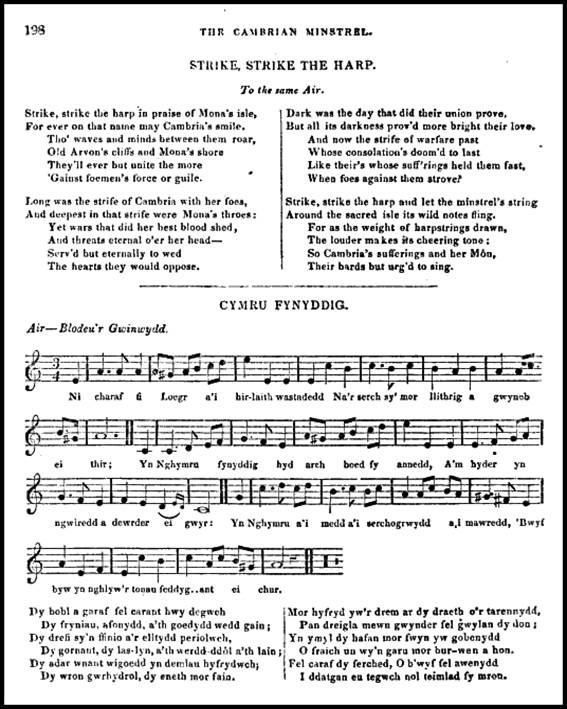
(delwedd J4448) (tudalen 198)
|
�
THE CAMBRIAN MINSTREL.
![[merged small][merged small][ocr errors][merged small][merged small][merged small][merged small][merged small][merged small][merged small][merged small][merged small][ocr errors][ocr errors][merged small][merged small][ocr errors]](sion-prys_310_caniedydd_cymreig_1845_rhan-2_3597k_files/image391.jpg)
T'rewch feirddion t'rewch, o
gylch y dderwen gain, T'rewch etto t'rewch-dy awen nawr fy ngwlad,
Ysprydion h�ff eich teid unant y sain.
Cuwch a'r Eryri draw saif ar
ei thraed.
I'ch gwydd mewn t�r ddisgleirddeb cu,
Boed etto g�n a'i nefawl
swyn,
H�n ddysg yr oesoedd gynt a fu;
Yn ber ei rhwysg ar fryn a
thwyn,
Ymddengys er trallodion lu,
A cherdd y bardd o pery'n
fwyn,
I'ch lloni ddyddiau rhai'n.
Tra glwys-deg lwyn mewn gwlad,
![[merged small][merged small][merged small][merged small][merged small][merged small][merged small][merged small][ocr errors][ocr errors][merged small][merged small][merged small][merged small][merged small][merged small][merged small][merged small][merged small][merged small][merged small][merged small][merged small][merged small][merged small][merged small][merged small][merged small][merged small][merged small][merged small][merged small][merged small][merged small][merged small]](sion-prys_310_caniedydd_cymreig_1845_rhan-2_3597k_files/image395.jpg)
��198 TiIR CAMBRIAN MINSTREL.
STRIKE, STRIKE THE HARP.
To the tame Air.
Strike, strike the harp in praise
of Mona's isle, For ever on that name may Carnbria's smile. Tito' waves and
mind, between them roar, Otd Arvon's chits and Mona's shore They'll net but
unite the more 'Gains% foemetes force or guile. Long was the strife of
Cambria with her foes, And deepest in that strife were Mona'� throes: Yet wan
that did her best blood shed, And threats eternal o'er her head�Sers'd but
eternally to wed The hearts they would oppose.
Air�Blocku'r Giciateydd. 1=3 J
Dark was the day that did their
onion prove. But all its darkness prov'd more bright their love. And now the
strife of warfare past Whose consolation's doom'd to last Like tbei es whose
sufferings held them fast. When foes against them strove? Strike, strike the
harp and let the minstrel's string Around the sacred isle its wild notes
fling. For as the weight of harpstrings drawn, The louder makes its cheering
tone; So Cambria's sufferings and her Mho, Their bards but sued to sing.
CY3IRU FYNYDDIO.
chard
fi
a'i bit-faith wut dedd Na', such
mot
llithrig
gwyaeb
el MIT; Yn Nghyraru fy yddig hyd
arch hoed fy annedd, Alm byder y.
ngwIredd a dmerder es gasp': Ye
Nglipant ii teeddei wrchogrwydd a.l mawredd, 'Etwy1
byre yn ashl w'r noon fed yg..ant
ci Dy bobl a guar fel carant hwy dcgweh Dy frynieu, afrinydd, a'th goedydd
wedd gain; Dy &eft sy'n flied� a'r elltydd periolneh, Dy somata, dy a'th
werdd�ddAl lain Dy *Jar wnant wirectld yn dendau hyfrydwetu Dy wren
gwrhydrol, dy teeth mot fain.
hut.
I Mor hyfryd yw'r drem ar 4 draetb
tarennydd, Pan dreigla mew@ gwynder fel awylan dy don Yn ymy I dy Intim toot
treys yw gobenydd j 0 hatch tm writ garu mot bur-wen a hon. I Fel carat dy
fetched, 0 Wavy( fel awenydd 1 ddatgan ea tench nol teimlad fy wroth
|
|
�
|
|
|
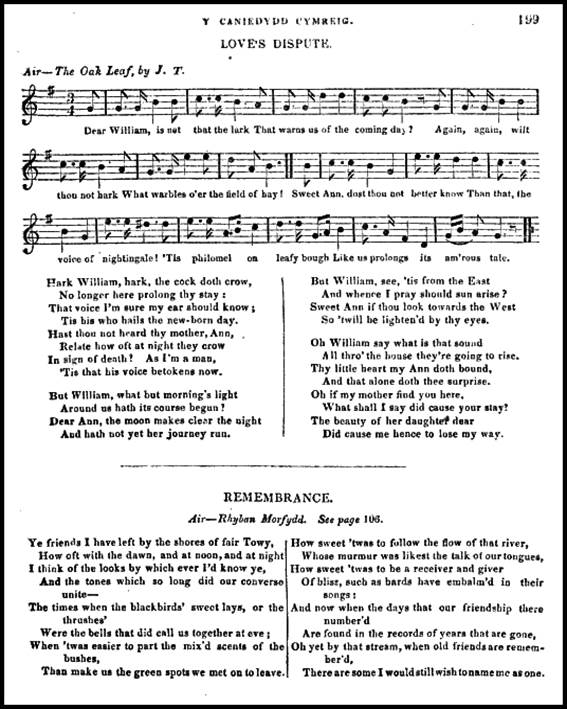
(delwedd J4449) (tudalen 199)
|
�
�Y CANIEDYDD CYMREIG.
�Air�The Oak Leaf, by J. T.
![[merged small][merged small][ocr errors][ocr errors][merged small][merged small][merged small][ocr errors]](sion-prys_310_caniedydd_cymreig_1845_rhan-2_3597k_files/image399.jpg)
thou not hark
What warbles o'er the field of hay! Sweet Ann, dost thou not better know Than
that, the
![[blocks in formation]](sion-prys_310_caniedydd_cymreig_1845_rhan-2_3597k_files/image401.jpg)
Air� Rhyban Morfydd. See
page 106.
Ye friends I have left by the shores of fair Towy, How sweet 'twas to follow
the flow of that river,
How oft with the dawn, and
at noon, and at night Whose murmur was likest the talk of our tongues,
I think of the looks by which ever I'd know ye, How sweet 'twas to be a
receiver and giver
And the tones which so long did our converse Of bliss, such as bards have
embalm'd in their
unite-
songs : The
times when the blackbirds' sweet lays, or the And now when the days that our
friendship there thrushes
number'd Were
the bells that did call us together at eve; Are found in the records of years
that are gone, When 'twas easier to part the mix'd scents of the Oh yet by
that stream, when old friends are reniembushes,
ber'd, Than
make us the green spots we met on to leave. There are some I would still wish
to name me as one.
�
V CANII.ON Lb CYAIRKIG.
LOVES DISPUTE.
4CPC�* morn "CC:. .C2% won
159
On William, is net that the lurk
Tim warm us of the coming da) t Again, agate, wilt
V V A rF thou not hark What warbles
o'er the Geld of bay f Sweet Ann. &Allen ant beater know Tha that, the
yoke of Lnightingalet 'Tie
plalorael oe Hark William, hark. the cock doth crow, No longer here prolong
thy stay t That voice I'm sure my ear should know ; Tis bis who hails the
newborn day. Halt thou not heard thy mother, Ann, , Relate how oft at night
they crow In sign of death! As I'm a man, 11t that his voice betokens now.
But William, what but morning's light Around us bath its course begun! Dear
Ann, the moon makes clear the night And Lath not yet her journey run.
leafy bough Like us prolong. its
Wrens tale. But William, see, 'tic from the East And wherwe F pray should sun
arise ? Sweet Ann if thou look towards the West So 'twill be Vaned by thy
eyes. Oh William say what la that sound All thro'the house they're going to
rise. Thy little heart my Ann doth bound, And that alone cloth thee surprise.
Oh if my mother And you here. What shall I say did cause your stay? The
beauty of her daughtell dear Did cause me hence to lose my way.
REMEMBRANCE. Air�Rhyban Morfidel.
See page 106.
Ye friends I have left by the
shores of fair Towy, How oft with the dawn, and at noon, and at night I think
of the looks by which ever I'd know ye, And the tones which so long did our
converse unite�The times when the blackbirds' sweet lays, or the thrushes'
Were the bells that did call us together at eve When 'twat eagler to part the
roix'd scents of the bushes, Than make to the green spots we met on to leave.
How sweet 'twat to follow the flow
of that river, Whose murmur was likes% the talk of our tongues, How sweet
'twas to be a receiver and giver Of bliss, such as bards have embalmed in
their songs: And now when the days that oar friendship there number'd Are
found in the records of years that are gone, Oh yet by that stream, when old
friends are rename heed, There are some I would still wish tonameme as one.
|
|
�
|
|
|
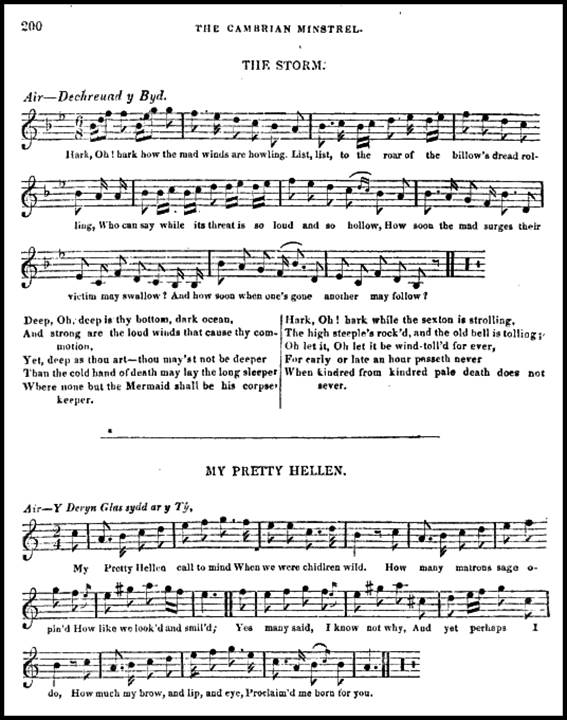
(delwedd J4450) (tudalen 200)
|
THE CAMBRIAN MINSTREL.
![[merged small][merged small][ocr errors][merged small][merged small][merged small][merged small][merged small][merged small]](sion-prys_310_caniedydd_cymreig_1845_rhan-2_3597k_files/image405.jpg)
Deep, Oh, deep
is thy bottom, dark ocean,
Hark, Oh! hark while the sexton is strolling, And strong are the loud
winds that cause thy com- The high steeple's rock'd, and the old bell is
tolling; motion,
Oh let it, Oh let it be
wind-tollid for ever,
Yet, deep as thou art�thou may'st not be deeper For early or late an hour
passeth never
Than the cold hand of death may lay the long sleeper Wh ndred from kindred
pale de
W bere none but the Mermaid shall be his corpse, sever.
keeper.
does not
![[blocks in formation]](sion-prys_310_caniedydd_cymreig_1845_rhan-2_3597k_files/image407.jpg)
�
200
Air�Dechreured y
rile CAMERIAN MINSTREL
THE STORM:
Hark, Oh! hark how the mad winds
are howling. List, list, to the roar of the billow's dread rol-
ling, Who can say while its threat
is so loud and so hollow, How soon the mad urges their
victim may swallow? And how soon
when one's gone another may follow?
Deep, Oh: deep is thy bottom, dark
ocean, And strong are the load winds that cause thy cow. motion, Yet, deep as
thou art�thou may'st not be deeper Than the cold hand ofdealh may lay the
long sleeper Where none but the Mermaid shall be his corpse' keeper.
Hark, Oh I but while the sexton is strolling,
The high steeple's roek'd, and the old bell is tolling Oh let it, Oh let it
be wind-toli'd for ever, Far early or inte an hoar pasuth never When kindred
from kindred pals death does not sever.
MY PRETTY HELLEN.
Air�Y Deryn Glas sydd ar y Ty^.
My Pretty Hellen call to mind When
we were chidlren wild, How may matrons sage o-
pined How like we look�d and
smil�d; Yes many said, I know not why, < And yet perhaps I
do, How much my brow, and lip, and
eye, Proclaim�d me born for you.
�
|
|
�
|
|
|
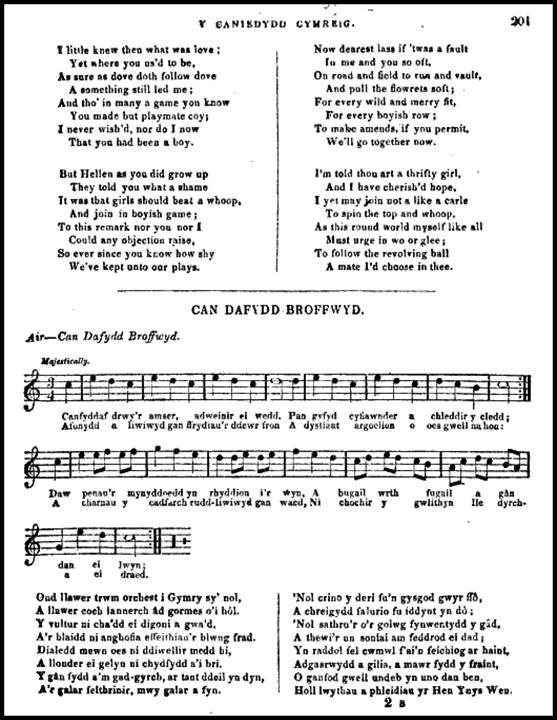
(delwedd J4451) (tudalen 201)
|
�
Y CANIEDYDD CYMREIG.
![[blocks in formation]](sion-prys_310_caniedydd_cymreig_1845_rhan-2_3597k_files/image411.jpg)
&
4
Canfyddaf drwy'r amser, adweinir ei wedd, Pan gyfyd
cyfiawnder Afonydd a liwiwyd gan ffrydiau'r ddewr fron A dystiant argoelion
![[blocks in formation]](sion-prys_310_caniedydd_cymreig_1845_rhan-2_3597k_files/image413.jpg)
![[ocr errors][merged small][merged small][merged small][merged small][merged small][merged small][merged small][merged small][merged small][merged small]](sion-prys_310_caniedydd_cymreig_1845_rhan-2_3597k_files/image415.jpg)
r EANIEDVDO
I little knew then what was love :
Yet where you us'd to be, As ore at dove doh follow dove A something still
led me; And tho ia many a game yon know You made but playmate coy; I never
wish'd, nor do I now That yon had boo � boy.
But Hellen a you did grow up They
told you what a shame It was that girls should beat � whoop, And join in
boyish game; To this remark nor you nor I Could any objection init.. So ever
since you know how shy We've kept unto oar plays.
GYIAR RIO.
Now dearest lass if 'teas a fault
lo nut and you so olt. On road and fold to run and vault, And pull the
dowrets soft For every wild and merry dt, Fot every boyish row ; To melee
amends, if you permit. We'll go together now.
I'm told thou art a thrifty girl,
And I have cherish'd hope. ytt may join not a like a earls To spin the top
and whoop. As this round world moonlike all Mom urge in co or glee; To follow
the revolving ball A mate I'd choose in thee.
CAN DAFVDD BROFTWYD.
Air-Can Dafydd Broffwyd.
Ififerikalty.
201
a-.
Can yehlar droy'r tenser, a weinir
el week'. Pa Frf0 eyeawnder � eldeddir etedd; Afuntrld a liwswyd gen dry
tater Minn on A ystisat ar callus o oes gwell maim:
a :awnlW= ManSI a Oa n w On g an se
mMM et alma rma min Mm =n IIIM V7MIS .n En
Daw penao'r my* ddnetIrl ye
rbythlinn wyn, A hi rail with fog It � gha A chateau y eadfacb rod -Intiwysi
pus watt', NI ebochir y faiths. lie dyreli�
dam ei liven; � el dried. Ond Rawer
trwm *robot I Gymry sy' not A Ilawer tab lannereb Ad gonna o'i Y voila oi
ch�dd ei digoni � void. A'r blaidd ni angboda elfeiihiao'r blwng (tad.
Dialedd town as ni ddiweilir medd hi, � Ilonder ei gelyn ei chydfydd bri. gin
fydd e'm gatt.tyreb,ar taut (Idea yn dyn, Air gala fettainir, mwy galar �
fyn.
'Nol min* y deri fa'n gyegod gwyr A
threigydd (*lurk to iddynt yn dd 'Nol seihru'r o'r golwg fyowentydd y A
(hewer on soots' Ain feddrod el dad; yn raddol fel ewmvtl Faro fekbiogar
helot, Adgosirwydd � gain. � mawr fydd y (Sot, 0 goofed rell model, yn uno
deo ben, Holt Iwythan � pbleidia� yr Hen Toys Wen. 2a
|
|
�
|
|
|
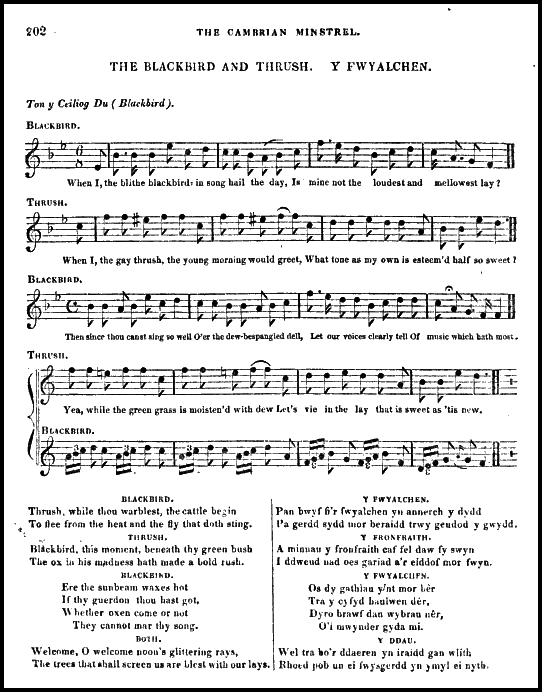
(delwedd J4452) (tudalen 202)
|
202� THE CAMBRIAN MINSTREL.
THE BLACKBIRD AND THRUSH. Y FWYALCHEN.
Tony Giles Du (BfacUird). ![[merged small][merged small][merged small][merged small][merged small][ocr errors]](sion-prys_310_caniedydd_cymreig_1845_rhan-2_3597k_files/image418.jpg)
When I, the blithe blackbird, in song hail the day, Is mine not the
loudest and mellowest lay?
![[merged small][ocr errors][merged small]](sion-prys_310_caniedydd_cymreig_1845_rhan-2_3597k_files/image420.jpg)
When I, the
gay thrush, the young morning would greet, Wbat tone as my own is esteem'd
half so sweet ? BLACKBIRD.
![[ocr errors]](sion-prys_310_caniedydd_cymreig_1845_rhan-2_3597k_files/image422.jpg)
Then since
thou canst sing so well O'er the dew-bespangled dell, Let our voices clearly
tell of music which hath most .. THRUSH.
Yea, while the
green grass is moisten'd with dew Let's vie in the lay that is sweet as 'tis
new.
![[merged small][ocr errors]](sion-prys_310_caniedydd_cymreig_1845_rhan-2_3597k_files/image424.jpg)
BLACKBIRD.
Y FWYALCHEN. Tbrusb, while thou warblest, the cattle begin Pan bwyf fi'r
fwyalchen yn annereb y dydd To flee from the heat and the fly that doth
sting. Pa gerdd sydd mor beraidd trwy geudod y gwydd. TURUSH.
Y FRONFRAITH.
Blackbird, this moment, beneath thy green bush A minnau y fronfraith caf fel
daw fy swyn
The ox in bis madness bath made a bold rush. I ddweud nad oes gariad a'r
eiddof mor fwyo.
BLACKBIRD.
Y FW YALCHEN.
Ere the sunbeam waxes hot
Os dy gathlau y�nt mor b�r
If thy guerdon thou hast got,
Tra y cyfyd baulwen d�r,
Whether oxen come or not
Dyro brawf dan wybrau v�r,
They cannot mar thy song.
O'i mwynder gyda mi.
BOTH.
Y DDAU.
Welcome, O
welcome noon's glittering rays, Wel tra bo'r ddaeren yn iraidd gan wlith
The trees that sball screen us are blest with our lays. | Rhoed pob un ei
swysgerdd yn ymyl ei nytb.
BLACKBIRD.
rx.r..;�,..........vraarS/INI:=Matri011ar==
I r=I 1711.4 a a CM a Ale Maji.nr =AM :=11=■'Mlag I
When ',the blithe blackbird. in
song hail the day, Is mine Dot the loudest and mellowest lay? THRUSH.
W bere
none but the Mermaid shall be his corpse.
�sever.
keeper.
does not
&
4
Canfyddaf drwy'r amser.
�adweinir ei wedd.
�Pan gyfyd cyfiawnder Afonydd a liwiwyd
gan ffrydiau'r ddewr fron A dystiant argoelion
When I.
�the blithe blackbird.
�in song hail the day.
�Is mine not the loudest and mellowest
lay?
When I.
�the gay thrush.
�the young morning would greet.
�Wbat tone as my own is esteem'd half
so sweet?
�BLACKBIRD.
Then since thou canst sing so well O'er the dew-bespangled dell.
�Let our voices clearly tell of music
which hath most .
.THRUSH.
Yea.
�while the green grass is moisten'd
with dew Let's vie in the lay that is sweet as 'tis new.
BLACKBIRD.
When 1, the gay threat, the yoneg
morningwould pest, What toot as my on is eslaced half so sweet? BLACKBIRD.
TheftlInCe MOO Clint sing so well
Wee theda�begeaskd MD, IS ear voices clearly tell 01 ;mit nItlth Lath WOO. Ti
RY$11.
Yea, while the green gran is
molateild with dew let's ale lathe lay that is sweet as new. Ilmcitstan.
Y
FWYALCHEN.Tbrusb.
�while thou warblest.
�the cattle begin Pan bwyf fi'r fwyalchen
yn annereb y dydd To flee from the heat and the fly that doth sting.Pa gerdd
sydd mor beraidd trwy geudod y gwydd.TURUSH.
Y FRONFRAITH.
Blackbird.
�this moment.
�beneath thy green bush A minnau y
fronfraith caf fel daw fy swyn
The ox in bis madness hath made a bold rush.I ddweud nad oes gariad a'r
eiddof mor fwyo. BLACKBIRD.
Y FW YALCHEN.
Ere the sunbeam waxes hot Os dy gathlau y�nt mor b�r
If thy guerdon thou hast got.
Tra y cyfyd haulwen d�r.
Whether oxen come or not Dyro brawf dan wybrau v�r.
They cannot mar thy song. O'i mwynder gyda mi.
BOTH.
Y DDAU.
Welcome.
�O welcome noon's glittering rays.
�Wel tra bo'r ddaeren yn iraidd gan
wlithThe trees that sball screen us are blest with our lays.| Rhoed pob un ei
swysgerdd yn ymyl ei nytb.
Ye
Ye
men on whose brows The sweat of your labour most brilliantly shows.
�O'er friendship's pure men whose hard
palms Bear proof of your callings thru' tempest and calms.
�Be merry where
labour's close prison Their beauty must spoil.
�Should sometimes find leisure 'Neath heaven's
pure azure For
flow'rets deck the glade.
�The chastest and the fairest maid I've
met in my
dear Sally.
Oh in the vale where I was born.
And�gan with love to dally.
�Had I my choice there should be worn
My lifetime all with Sally;
And elsewhere if I'm doom'd to dwell.
Ere beart and bosom can be well.
To grace the hearthstone of my cell
Whom shall I hav but Sally?
BLACKBIRD. Thrash. while thou
warblest, thecattle begin To he from the heat and the Cy that sloth sling.
Tina Blackbird, this moment, beneath thy green bush The on in his madness
bath made a bold rush. IILACKIIMD. Ere the sunbeam wanes hot If thy guerdon
thou last got. W holler oxen come or nut They cannot mar thy song. Rom.
Welcome, 0 welcome noon's glittering rays, The trees that Atlanta us ray
blest with our lays.
IPSYAT.CHEL Pan bwyf Wr Eryalchen
yu amwreh y dyJd Pa gerd4 sydd mor beraidd trwy geadod y gwyJd. FRO►Mailli� A minuets y fronfraith eat fel daw fy swyn I ddweud
mad oes gariad at *Mot mor (nye. Y
FWVALC111}1. Os dy g.thlaa ylnt mor her Tra y oy fyd Imulwen der. Dyro brawl clan wy bran
nee, O't noryntler vale mi. V ODAI.I. Wel tea her dilative yn iraidd goo
wilds Matti polt us ci fuysgerdd yn ymyl ei myth.
|
|
�
|
|
|

(delwedd J4453) (tudalen 203)
|
Y
CANIEDYDD CYMREIG. 203
THE LABOURER.
Boreu dydd Llun. Monday Morning.
Ye met on whose brows The sweat of your labour most brilliantly shows, O'er
friendship's pure
Ye men whose hard palms Bear proof of your callings thro' tempests and calms,
Be merry where
banquet renew its warm vows. Oh! is it not reason, The men who each season In
mirth's note awakens no qualms.
labour's close prison Their beauty must spoil, Should sometimes find leisure
'Neath heaven's pure azure For
pastime that's easter Than wealth heaping toil, The head and the feature With
gladness to oil?
OGWR VALLEY.
Air � Beth wneir o'r llac ei afael (The Slack of Hold).
How neat
the cot, how sweet the farms I've seen in Ogwr's valley; And how transcendant
are the charms That bloom there in my Sally. Where elm trees give the coolest
shade and fairest flow'rets deck the glade, The chastest and the fairest maid
I've met in my dear Sally.
Oh In the vale where I was born,
And 'gan with love to dally,
Had I my choice there should be worn
My lifetime all with Sally;
And elsewhere if I'm doom'd to dwell,
Ere heart and bosom can be well,
To grace the hearthstone of my cell
Whom shall I have but Sally?
|
|
�
|
|
|

(delwedd J4454) (tudalen 204)
|
204 THE
CAMBRIAN MINSTREL.�
PENNILLION A DIRIAU.
Mae cyffes i'w chlywed nad ydyw ond bost;
Mae cyffes a wna'r sawl a'i clywo yn dost;
Mae cyfes i roddi iach�d at mwy drwg;
Mae cyffes i symud grwgnachrwydd a gwg;
Mae cyffes i gadw cyhuddiad y'mhell;
Mae cyffes peth beius rhag ceisir peth gwell;
Mae cyffes o bethau nad ydynt yn bod
Er codi'r hunanol a'u beuont mewn cl�d;
Mae cyffes i gelu bwriadau drwg fron;
Mae cyffes i wneuthur yr euog yn llon;
Mae cyffes na wneir gan un dyn ond i Dduw;
Mae cyffes pe gwir ni b�ai bosib' i'n fyw;
Mae cyffes o feiau mil amlach na'r gwlith
Mewn gobaith y collir rhai f�o yn eu plith;
Mae cyffes a wneir (mae'n beth rhyfedd) er c�l;
Mae cyffes ragflaena'r cybuddwr a'i gwel;
Mae cyffes na wnelit gan nemawr o honi
Pe na b'ai i'w chlywed yn mhob darn o weddi;
Mae cyffes a ddysgir fel pennill o g�n
Nad ydyw yn gwneuthur yn frwnt nag yn l�n;
Mae cyffes na wnelai un dyn yn ei go'
Pe na byddai pawb yn ei gwneud yn eu tro;
Fy nghyffes i yw, mae un ryfedd yw'r fynwes
All dwyllo ei hunan mewn c'nifer ffug gyffes.
Geneth l�n na charo'i moli;
Gwerthwr na fo'n medru gwenu;
Prynwr onest na fo'n cyfri;
Crwthwr na fo'n arfer meddwi;
Hwsmon dalo rot heb grynnu;
Ustus na fo'n caru holi;
Meddyg ganmol lysiau gerddi.
Dyna saith rhyfeddod Cymru.
Nid ffalst hwnw fostia'i ffalsder.
Ac er ffalsta bydd ar fyrder
Brofi bod ei droion diriaid,
I'r tywylla'n rhoddi llygaid.
Y fenyw yn rhwyddlan adawodd ei phriod
Heb law cael un arall yn lle'r un mae'n wrthod;
Ysgatfydd hi orfydd ar droion gael llangciau
I gynnal ymddiddan yn lle ei chyfeillesau.
Ni welais i dywydd erioed oedd mor g�s
A gadwai blant ysgol os caent o fyn'd ma's;
Na h�n er fy nganed mor hyfryd a thawel
A berai i'r meddwyn ffieiddio ei gornel.
Mawr di gynyg fu'r dymuniad
Weled Rhys Ddu yn cael diwygiad;
Ond ei gyntaf waith rhinweddol
Ddododd pawb i gredu�n hollol.
Er mor erchyll ei draha
Bod ei ddrwg yn well na'i dda.
Wffti i grefydd medd y llu
Os crefydd ydyw swn Rhys Ddu.
Llawer da o'i dra ddyrchafu
Dry yn felldith i bob teulu;
Mwyn gyfeddach llawer brenin
Hel hi'n daw am les y werin.
Neb weddio dros y mawrion
Na wrth�nebo'u drwg amcanion;
Dyn yw hwn fyn ddodi'r Duwdod
Yn w�s bach i bob rhyw bechod.
Chwythig clywed c�n a rh�g
Yn d'od allan o'r un g�g;
Gad i hwnw dyngu'n ynfyd
Na fedd air ond rheg i'w dd�weyd.
Nid oes nemawr boen corphorol
Na ddifetha'i achos gwreiddiol;
Hyn a'n dysg gall poen f'o bychan.
Gadw aethus boenau allan.
Fel gwna rhodio ffordd gerrygog
Gadw whell gymalwst lidiog.
Gwelais ff�l yn toddi ei fenydd
Er hyll gynnal ffug lawenydd;
Credai hwn os peidiai chwerthyn
Bo'd y byd i gyd ar derfyn.
Wfft! O wfft i'r fath orfoledd
Na all fyw heb noethi dannedd;
Rhagrith ffoliaid uwch y cwpan
Gofid cudd yw gwedy'r cyfan.
DAVID JONES. ARGRAFFYDD. MERTHYR TYDFIL.
�
|


![[blocks in formation]](sion-prys_310_caniedydd_cymreig_1845_rhan-2_3597k_files/image007.jpg)

![[merged small][merged small][merged small][merged small][ocr errors][merged small][merged small][merged small][merged small][merged small][merged small][merged small][merged small][merged small][merged small][merged small][merged small][merged small][merged small][merged small]](sion-prys_310_caniedydd_cymreig_1845_rhan-2_3597k_files/image015.jpg)

![[merged small][merged small][merged small][merged small][merged small][merged small][merged small][merged small][merged small][merged small][ocr errors][merged small][merged small][merged small][merged small][merged small]](sion-prys_310_caniedydd_cymreig_1845_rhan-2_3597k_files/image019.jpg)

![[blocks in formation]](sion-prys_310_caniedydd_cymreig_1845_rhan-2_3597k_files/image025.jpg)

![[merged small][merged small][merged small][ocr errors][ocr errors][merged small][merged small][merged small][merged small]](sion-prys_310_caniedydd_cymreig_1845_rhan-2_3597k_files/image029.jpg)
![[merged small][merged small][merged small][merged small][merged small][merged small][ocr errors][merged small][merged small][merged small][ocr errors][merged small][merged small][merged small][merged small][merged small]](sion-prys_310_caniedydd_cymreig_1845_rhan-2_3597k_files/image031.jpg)

![[merged small][merged small][ocr errors][merged small][ocr errors][merged small][merged small][merged small][merged small][merged small][merged small][merged small][merged small][merged small][merged small][merged small][merged small][merged small][merged small][merged small][merged small][merged small][merged small][merged small][merged small][merged small][merged small][merged small][merged small][merged small][merged small][merged small][merged small]](sion-prys_310_caniedydd_cymreig_1845_rhan-2_3597k_files/image034.jpg)


![[merged small][ocr errors][ocr errors][merged small][merged small][merged small][merged small][merged small][merged small][merged small][merged small][ocr errors][merged small][merged small][merged small][merged small][ocr errors][merged small][merged small][merged small][merged small][merged small][merged small][merged small][ocr errors][merged small][merged small][merged small][merged small][merged small][ocr errors][merged small][merged small]](sion-prys_310_caniedydd_cymreig_1845_rhan-2_3597k_files/image040.jpg)

![[blocks in formation]](sion-prys_310_caniedydd_cymreig_1845_rhan-2_3597k_files/image044.jpg)

![[blocks in formation]](sion-prys_310_caniedydd_cymreig_1845_rhan-2_3597k_files/image048.jpg)

![[merged small][merged small][ocr errors][merged small][merged small][merged small][merged small][merged small][merged small]](sion-prys_310_caniedydd_cymreig_1845_rhan-2_3597k_files/image051.jpg)

![[merged small][merged small][merged small][ocr errors][merged small][merged small][merged small][merged small][ocr errors]](sion-prys_310_caniedydd_cymreig_1845_rhan-2_3597k_files/image055.jpg)
![[blocks in formation]](sion-prys_310_caniedydd_cymreig_1845_rhan-2_3597k_files/image057.jpg)

![[ocr errors][merged small][merged small][merged small][merged small][merged small][merged small][merged small][merged small][merged small][merged small][merged small]](sion-prys_310_caniedydd_cymreig_1845_rhan-2_3597k_files/image061.jpg)


![[blocks in formation]](sion-prys_310_caniedydd_cymreig_1845_rhan-2_3597k_files/image067.jpg)

![[merged small][merged small][ocr errors][merged small][merged small][merged small][merged small][merged small][merged small][merged small][merged small][ocr errors][merged small][merged small][merged small][merged small][merged small][merged small]](sion-prys_310_caniedydd_cymreig_1845_rhan-2_3597k_files/image071.jpg)

![[merged small][merged small][merged small][merged small][ocr errors][merged small][merged small][merged small][merged small][merged small]](sion-prys_310_caniedydd_cymreig_1845_rhan-2_3597k_files/image075.jpg)
![[ocr errors][merged small][merged small][merged small][merged small][merged small][merged small][merged small][merged small][merged small]](sion-prys_310_caniedydd_cymreig_1845_rhan-2_3597k_files/image077.jpg)


![[merged small][merged small][ocr errors][merged small][merged small][merged small][merged small][merged small][merged small][merged small][merged small][merged small][ocr errors][merged small][merged small][merged small][merged small][merged small][merged small][merged small][merged small][merged small][merged small][merged small][merged small][merged small][merged small]](sion-prys_310_caniedydd_cymreig_1845_rhan-2_3597k_files/image083.jpg)


![[merged small][merged small][merged small][merged small][merged small][merged small][merged small][merged small][merged small][merged small][merged small][merged small][merged small][merged small][merged small][merged small][merged small][merged small][merged small][merged small][merged small][graphic][ocr errors][subsumed][merged small][merged small]](sion-prys_310_caniedydd_cymreig_1845_rhan-2_3597k_files/image089.jpg)

![[merged small][merged small][merged small][merged small][merged small][merged small][merged small][merged small][ocr errors][merged small][merged small][merged small][merged small][merged small][merged small][merged small][merged small][merged small][merged small][merged small][merged small][merged small][merged small][merged small][merged small][merged small][merged small][merged small][merged small][merged small][merged small][merged small][merged small][merged small][merged small]](sion-prys_310_caniedydd_cymreig_1845_rhan-2_3597k_files/image093.jpg)

![[blocks in formation]](sion-prys_310_caniedydd_cymreig_1845_rhan-2_3597k_files/image097.jpg)

![[blocks in formation]](sion-prys_310_caniedydd_cymreig_1845_rhan-2_3597k_files/image101.jpg)

![[blocks in formation]](sion-prys_310_caniedydd_cymreig_1845_rhan-2_3597k_files/image105.jpg)

![[blocks in formation]](sion-prys_310_caniedydd_cymreig_1845_rhan-2_3597k_files/image109.jpg)





![[graphic][subsumed][subsumed][ocr errors][merged small][merged small][merged small][merged small][merged small][merged small][merged small][merged small][ocr errors][ocr errors][merged small][merged small][graphic][subsumed][subsumed][subsumed][subsumed][merged small][merged small][graphic][subsumed][subsumed][ocr errors][ocr errors][subsumed][merged small][merged small]](sion-prys_310_caniedydd_cymreig_1845_rhan-2_3597k_files/image120.jpg)

![[merged small][merged small][ocr errors][merged small][merged small][merged small][ocr errors][merged small][merged small][merged small][merged small][merged small][merged small][graphic][subsumed][subsumed][subsumed][merged small][merged small][merged small]](sion-prys_310_caniedydd_cymreig_1845_rhan-2_3597k_files/image124.jpg)

![[graphic]](sion-prys_310_caniedydd_cymreig_1845_rhan-2_3597k_files/image128.jpg)
![[graphic][subsumed][subsumed][merged small][merged small][merged small][merged small][merged small][merged small][ocr errors][merged small][ocr errors][merged small][merged small][merged small]](sion-prys_310_caniedydd_cymreig_1845_rhan-2_3597k_files/image130.jpg)


![[blocks in formation]](sion-prys_310_caniedydd_cymreig_1845_rhan-2_3597k_files/image135.jpg)

![[blocks in formation]](sion-prys_310_caniedydd_cymreig_1845_rhan-2_3597k_files/image139.jpg)
![[blocks in formation]](sion-prys_310_caniedydd_cymreig_1845_rhan-2_3597k_files/image141.jpg)

![[blocks in formation]](sion-prys_310_caniedydd_cymreig_1845_rhan-2_3597k_files/image145.jpg)

![[merged small][merged small][graphic][subsumed][subsumed][subsumed][subsumed][subsumed][ocr errors][ocr errors][ocr errors][ocr errors][subsumed][merged small][merged small][merged small][merged small][ocr errors][ocr errors][ocr errors][graphic][subsumed][subsumed][subsumed][subsumed][subsumed][subsumed][ocr errors][ocr errors]](sion-prys_310_caniedydd_cymreig_1845_rhan-2_3597k_files/image149.jpg)

![[merged small][merged small][ocr errors][merged small][merged small][merged small][merged small][merged small][merged small][ocr errors][merged small][merged small]](sion-prys_310_caniedydd_cymreig_1845_rhan-2_3597k_files/image152.jpg)

![[blocks in formation]](sion-prys_310_caniedydd_cymreig_1845_rhan-2_3597k_files/image156.jpg)

![[merged small][merged small][merged small][merged small][ocr errors][merged small][merged small][merged small][merged small][merged small][merged small][merged small][merged small][merged small][merged small][merged small][merged small][merged small]](sion-prys_310_caniedydd_cymreig_1845_rhan-2_3597k_files/image159.jpg)

![[blocks in formation]](sion-prys_310_caniedydd_cymreig_1845_rhan-2_3597k_files/image165.jpg)

![[blocks in formation]](sion-prys_310_caniedydd_cymreig_1845_rhan-2_3597k_files/image169.jpg)
![[merged small][merged small][merged small][merged small][ocr errors][merged small][merged small][merged small][merged small][merged small][merged small]](sion-prys_310_caniedydd_cymreig_1845_rhan-2_3597k_files/image173.jpg)


![[blocks in formation]](sion-prys_310_caniedydd_cymreig_1845_rhan-2_3597k_files/image179.jpg)

![[merged small][merged small][ocr errors][merged small][merged small]](sion-prys_310_caniedydd_cymreig_1845_rhan-2_3597k_files/image183.jpg)
![[ocr errors][merged small][merged small][merged small][merged small][merged small][merged small][merged small][merged small][merged small]](sion-prys_310_caniedydd_cymreig_1845_rhan-2_3597k_files/image185.jpg)

![[merged small][merged small][merged small][ocr errors][ocr errors][merged small][merged small][merged small][merged small][merged small][merged small][merged small][merged small]](sion-prys_310_caniedydd_cymreig_1845_rhan-2_3597k_files/image189.jpg)
![[merged small][ocr errors][ocr errors][ocr errors][merged small][merged small][merged small][merged small][merged small]](sion-prys_310_caniedydd_cymreig_1845_rhan-2_3597k_files/image191.jpg)

![[merged small][merged small][merged small][merged small][merged small][merged small][merged small][ocr errors][merged small][merged small][merged small][merged small][merged small][merged small][merged small][merged small][merged small][merged small][merged small][merged small][ocr errors]](sion-prys_310_caniedydd_cymreig_1845_rhan-2_3597k_files/image194.jpg)

![[merged small][merged small][ocr errors][merged small][merged small][merged small][merged small][merged small][merged small][merged small][merged small][merged small][merged small][merged small][merged small][merged small][merged small][merged small]](sion-prys_310_caniedydd_cymreig_1845_rhan-2_3597k_files/image197.jpg)



![[merged small][merged small][merged small][merged small][merged small][merged small][merged small][merged small][merged small][merged small][ocr errors][merged small][merged small][merged small][merged small][merged small][merged small][merged small][merged small][merged small][merged small][merged small][merged small][merged small][merged small]](sion-prys_310_caniedydd_cymreig_1845_rhan-2_3597k_files/image205.jpg)

![[merged small][merged small][merged small][merged small][merged small][ocr errors][merged small][merged small][merged small][merged small][merged small][ocr errors][merged small][merged small][merged small]](sion-prys_310_caniedydd_cymreig_1845_rhan-2_3597k_files/image211.jpg)

![[blocks in formation]](sion-prys_310_caniedydd_cymreig_1845_rhan-2_3597k_files/image214.jpg)
![[blocks in formation]](sion-prys_310_caniedydd_cymreig_1845_rhan-2_3597k_files/image216.jpg)

![[blocks in formation]](sion-prys_310_caniedydd_cymreig_1845_rhan-2_3597k_files/image224.jpg)

![[merged small][merged small][merged small][merged small][ocr errors][ocr errors][ocr errors][merged small][merged small][merged small][merged small][ocr errors]](sion-prys_310_caniedydd_cymreig_1845_rhan-2_3597k_files/image228.jpg)
![[merged small][merged small][merged small][merged small][merged small][merged small][merged small][merged small][merged small][merged small][merged small][merged small][merged small][merged small][merged small][ocr errors][merged small][merged small][merged small][ocr errors][merged small][merged small]](sion-prys_310_caniedydd_cymreig_1845_rhan-2_3597k_files/image230.jpg)

![[blocks in formation]](sion-prys_310_caniedydd_cymreig_1845_rhan-2_3597k_files/image234.jpg)

![[blocks in formation]](sion-prys_310_caniedydd_cymreig_1845_rhan-2_3597k_files/image238.jpg)
![[blocks in formation]](sion-prys_310_caniedydd_cymreig_1845_rhan-2_3597k_files/image240.jpg)

![[merged small][merged small][merged small][merged small][merged small][ocr errors][merged small][merged small][merged small][merged small][merged small][merged small][merged small][merged small][merged small][merged small][merged small][merged small][merged small][merged small]](sion-prys_310_caniedydd_cymreig_1845_rhan-2_3597k_files/image244.jpg)

![[blocks in formation]](sion-prys_310_caniedydd_cymreig_1845_rhan-2_3597k_files/image248.jpg)
![[blocks in formation]](sion-prys_310_caniedydd_cymreig_1845_rhan-2_3597k_files/image250.jpg)

![[merged small][merged small][merged small][merged small][ocr errors][merged small][merged small][merged small][ocr errors][merged small][merged small][merged small][merged small][merged small][merged small][merged small][merged small][merged small][ocr errors][merged small][merged small][merged small][merged small][merged small][merged small][merged small]](sion-prys_310_caniedydd_cymreig_1845_rhan-2_3597k_files/image254.jpg)

![[merged small][merged small][merged small][merged small][merged small][ocr errors][merged small][merged small][merged small][merged small][merged small][merged small][ocr errors][merged small][merged small][merged small][ocr errors][merged small][merged small][merged small][merged small][merged small][ocr errors][merged small][merged small][merged small][merged small][merged small]](sion-prys_310_caniedydd_cymreig_1845_rhan-2_3597k_files/image258.jpg)

![[merged small][merged small][merged small][merged small][merged small][merged small][merged small][merged small][merged small][merged small][merged small][ocr errors][merged small]](sion-prys_310_caniedydd_cymreig_1845_rhan-2_3597k_files/image261.jpg)

![[blocks in formation]](sion-prys_310_caniedydd_cymreig_1845_rhan-2_3597k_files/image265.jpg)

![[merged small][merged small][merged small][merged small][ocr errors][merged small][merged small][merged small][merged small][ocr errors][merged small][merged small][merged small][merged small]](sion-prys_310_caniedydd_cymreig_1845_rhan-2_3597k_files/image269.jpg)

![[merged small][merged small][graphic][subsumed][subsumed][graphic][ocr errors][subsumed][subsumed][subsumed][ocr errors][merged small][ocr errors][ocr errors]](sion-prys_310_caniedydd_cymreig_1845_rhan-2_3597k_files/image273.jpg)

![[blocks in formation]](sion-prys_310_caniedydd_cymreig_1845_rhan-2_3597k_files/image277.jpg)

![[merged small][merged small][merged small][merged small][merged small][merged small][merged small][merged small][merged small][merged small][merged small][merged small][merged small][merged small][merged small][merged small][ocr errors][merged small][merged small][merged small][merged small][merged small]](sion-prys_310_caniedydd_cymreig_1845_rhan-2_3597k_files/image281.jpg)

![[blocks in formation]](sion-prys_310_caniedydd_cymreig_1845_rhan-2_3597k_files/image285.jpg)



![[merged small][merged small][merged small][merged small][merged small][merged small][merged small][merged small][merged small][merged small][ocr errors][merged small][merged small][merged small][merged small][merged small][merged small]](sion-prys_310_caniedydd_cymreig_1845_rhan-2_3597k_files/image293.jpg)

![[merged small][merged small][merged small][ocr errors][merged small][merged small][merged small][merged small][merged small][merged small][merged small][merged small][merged small][merged small][ocr errors][merged small][merged small][merged small][merged small][merged small][merged small][merged small][merged small][merged small][merged small]](sion-prys_310_caniedydd_cymreig_1845_rhan-2_3597k_files/image297.jpg)

![[blocks in formation]](sion-prys_310_caniedydd_cymreig_1845_rhan-2_3597k_files/image301.jpg)

![[merged small][merged small][ocr errors][ocr errors][merged small][merged small][ocr errors][merged small][merged small][merged small][merged small][merged small][merged small][merged small][merged small][merged small][merged small][merged small][merged small][merged small][merged small][merged small][merged small][merged small][merged small][merged small][merged small][merged small]](sion-prys_310_caniedydd_cymreig_1845_rhan-2_3597k_files/image305.jpg)

![[blocks in formation]](sion-prys_310_caniedydd_cymreig_1845_rhan-2_3597k_files/image309.jpg)



![[merged small][merged small][merged small][merged small][merged small][merged small][merged small][merged small][merged small][merged small][merged small][merged small][merged small][merged small][merged small][merged small][merged small][merged small][ocr errors][merged small][merged small][merged small][merged small][merged small][merged small]](sion-prys_310_caniedydd_cymreig_1845_rhan-2_3597k_files/image317.jpg)

![[blocks in formation]](sion-prys_310_caniedydd_cymreig_1845_rhan-2_3597k_files/image321.jpg)

![[merged small][merged small][merged small][merged small][merged small][ocr errors][ocr errors][merged small][merged small][merged small][merged small][merged small][merged small][merged small][merged small][merged small][merged small][merged small]](sion-prys_310_caniedydd_cymreig_1845_rhan-2_3597k_files/image325.jpg)

![[blocks in formation]](sion-prys_310_caniedydd_cymreig_1845_rhan-2_3597k_files/image329.jpg)
![[ocr errors][merged small][merged small][merged small][merged small][merged small][merged small][merged small][merged small]](sion-prys_310_caniedydd_cymreig_1845_rhan-2_3597k_files/image331.jpg)

![[merged small][merged small][merged small][merged small][merged small][merged small][merged small][merged small][merged small][merged small][merged small][merged small][merged small][merged small][merged small][merged small][merged small][merged small][merged small][merged small][ocr errors][merged small][merged small][merged small][merged small][merged small][merged small][merged small][merged small][merged small][merged small]](sion-prys_310_caniedydd_cymreig_1845_rhan-2_3597k_files/image335.jpg)

![[blocks in formation]](sion-prys_310_caniedydd_cymreig_1845_rhan-2_3597k_files/image339.jpg)


![[blocks in formation]](sion-prys_310_caniedydd_cymreig_1845_rhan-2_3597k_files/image345.jpg)

![[blocks in formation]](sion-prys_310_caniedydd_cymreig_1845_rhan-2_3597k_files/image349.jpg)

![[merged small][ocr errors][merged small][merged small][merged small][merged small][ocr errors][merged small][merged small][merged small][merged small][merged small][merged small][merged small][merged small][merged small][merged small][merged small][merged small][merged small][merged small][merged small][merged small][merged small][merged small][merged small][merged small][merged small][merged small][merged small][merged small][merged small][merged small][merged small][merged small]](sion-prys_310_caniedydd_cymreig_1845_rhan-2_3597k_files/image353.jpg)

![[merged small][merged small][merged small][merged small][merged small][merged small][merged small][merged small][merged small][merged small][merged small][merged small][merged small][merged small][merged small][merged small][merged small][merged small][merged small][merged small][merged small][merged small][ocr errors][merged small][merged small][merged small][merged small][merged small][merged small][merged small][merged small]](sion-prys_310_caniedydd_cymreig_1845_rhan-2_3597k_files/image357.jpg)

![[blocks in formation]](sion-prys_310_caniedydd_cymreig_1845_rhan-2_3597k_files/image360.jpg)

![[blocks in formation]](sion-prys_310_caniedydd_cymreig_1845_rhan-2_3597k_files/image363.jpg)
![[blocks in formation]](sion-prys_310_caniedydd_cymreig_1845_rhan-2_3597k_files/image365.jpg)

![[merged small][merged small][merged small][merged small][merged small][ocr errors][ocr errors][merged small][merged small][merged small][merged small][merged small][merged small][merged small][merged small][merged small][merged small][merged small][merged small][merged small][merged small][merged small][merged small][merged small][merged small][merged small][merged small][merged small][merged small][merged small][merged small][merged small][merged small][merged small][merged small][merged small][merged small][merged small][merged small][merged small][merged small][merged small][merged small][merged small][ocr errors][merged small][merged small][merged small][merged small][merged small][merged small][merged small][merged small][merged small][merged small]](sion-prys_310_caniedydd_cymreig_1845_rhan-2_3597k_files/image369.jpg)

![[blocks in formation]](sion-prys_310_caniedydd_cymreig_1845_rhan-2_3597k_files/image373.jpg)

![[merged small][merged small][ocr errors][merged small][merged small][merged small][merged small][merged small][merged small][merged small][merged small][merged small][merged small][merged small][merged small][merged small][merged small][merged small]](sion-prys_310_caniedydd_cymreig_1845_rhan-2_3597k_files/image376.jpg)
![[merged small][ocr errors][merged small][merged small]](sion-prys_310_caniedydd_cymreig_1845_rhan-2_3597k_files/image378.jpg)

![[merged small][merged small][merged small][merged small][merged small][ocr errors][ocr errors][merged small][merged small][merged small][merged small][merged small][merged small][merged small][merged small][merged small][merged small][merged small][merged small][merged small][merged small][merged small][merged small][merged small][merged small][merged small][merged small][merged small]](sion-prys_310_caniedydd_cymreig_1845_rhan-2_3597k_files/image382.jpg)

![[blocks in formation]](sion-prys_310_caniedydd_cymreig_1845_rhan-2_3597k_files/image385.jpg)


![[merged small][merged small][ocr errors][merged small][merged small][merged small][merged small][merged small][merged small][merged small][merged small][merged small][ocr errors][ocr errors][merged small][merged small][ocr errors]](sion-prys_310_caniedydd_cymreig_1845_rhan-2_3597k_files/image391.jpg)

![[merged small][merged small][merged small][merged small][merged small][merged small][merged small][merged small][ocr errors][ocr errors][merged small][merged small][merged small][merged small][merged small][merged small][merged small][merged small][merged small][merged small][merged small][merged small][merged small][merged small][merged small][merged small][merged small][merged small][merged small][merged small][merged small][merged small][merged small][merged small][merged small]](sion-prys_310_caniedydd_cymreig_1845_rhan-2_3597k_files/image395.jpg)

![[merged small][merged small][ocr errors][ocr errors][merged small][merged small][merged small][ocr errors]](sion-prys_310_caniedydd_cymreig_1845_rhan-2_3597k_files/image399.jpg)
![[blocks in formation]](sion-prys_310_caniedydd_cymreig_1845_rhan-2_3597k_files/image401.jpg)

![[merged small][merged small][ocr errors][merged small][merged small][merged small][merged small][merged small][merged small]](sion-prys_310_caniedydd_cymreig_1845_rhan-2_3597k_files/image405.jpg)
![[blocks in formation]](sion-prys_310_caniedydd_cymreig_1845_rhan-2_3597k_files/image407.jpg)

![[blocks in formation]](sion-prys_310_caniedydd_cymreig_1845_rhan-2_3597k_files/image411.jpg)
![[ocr errors][merged small][merged small][merged small][merged small][merged small][merged small][merged small][merged small][merged small][merged small]](sion-prys_310_caniedydd_cymreig_1845_rhan-2_3597k_files/image415.jpg)

![[merged small][merged small][merged small][merged small][merged small][ocr errors]](sion-prys_310_caniedydd_cymreig_1845_rhan-2_3597k_files/image418.jpg)

